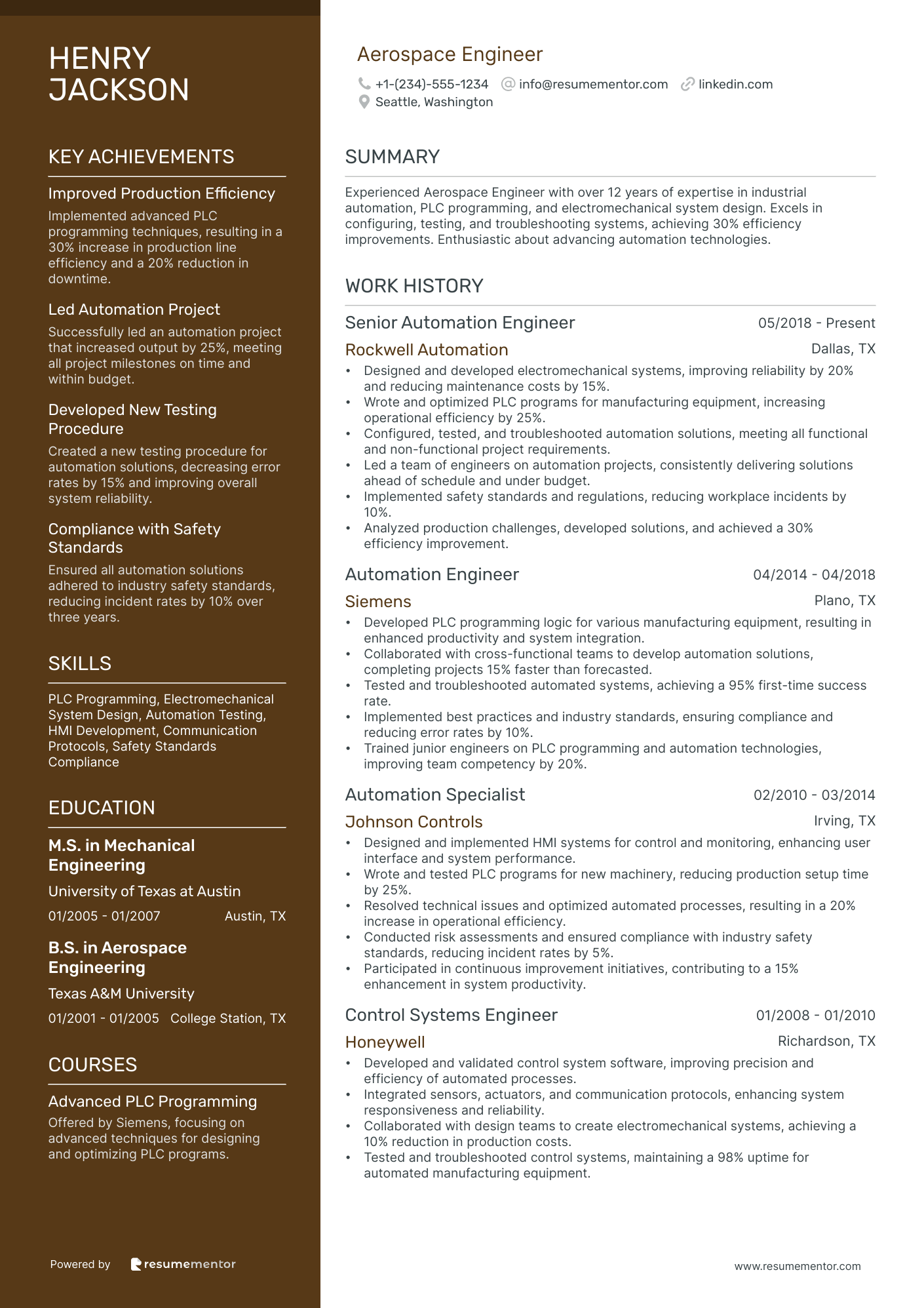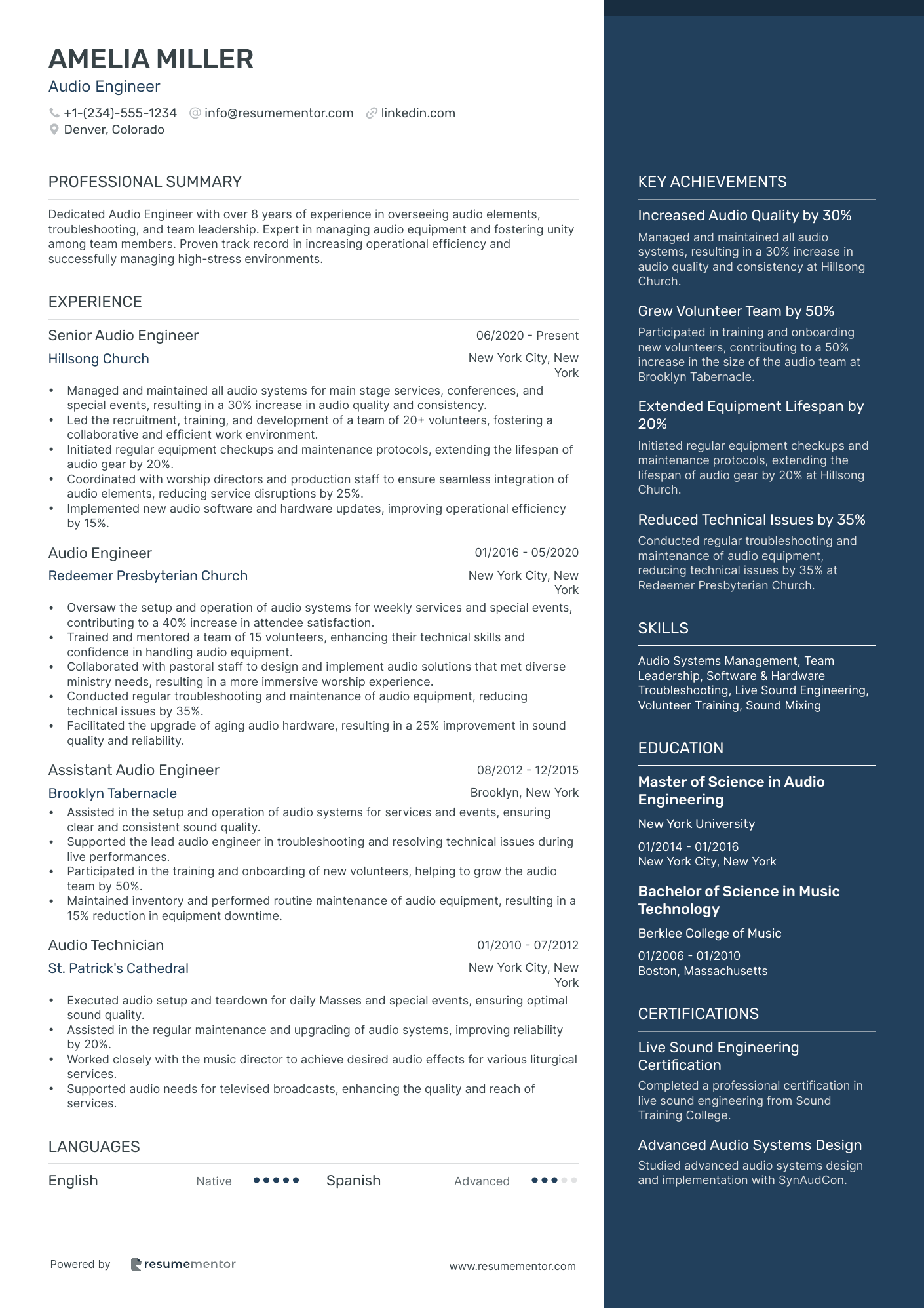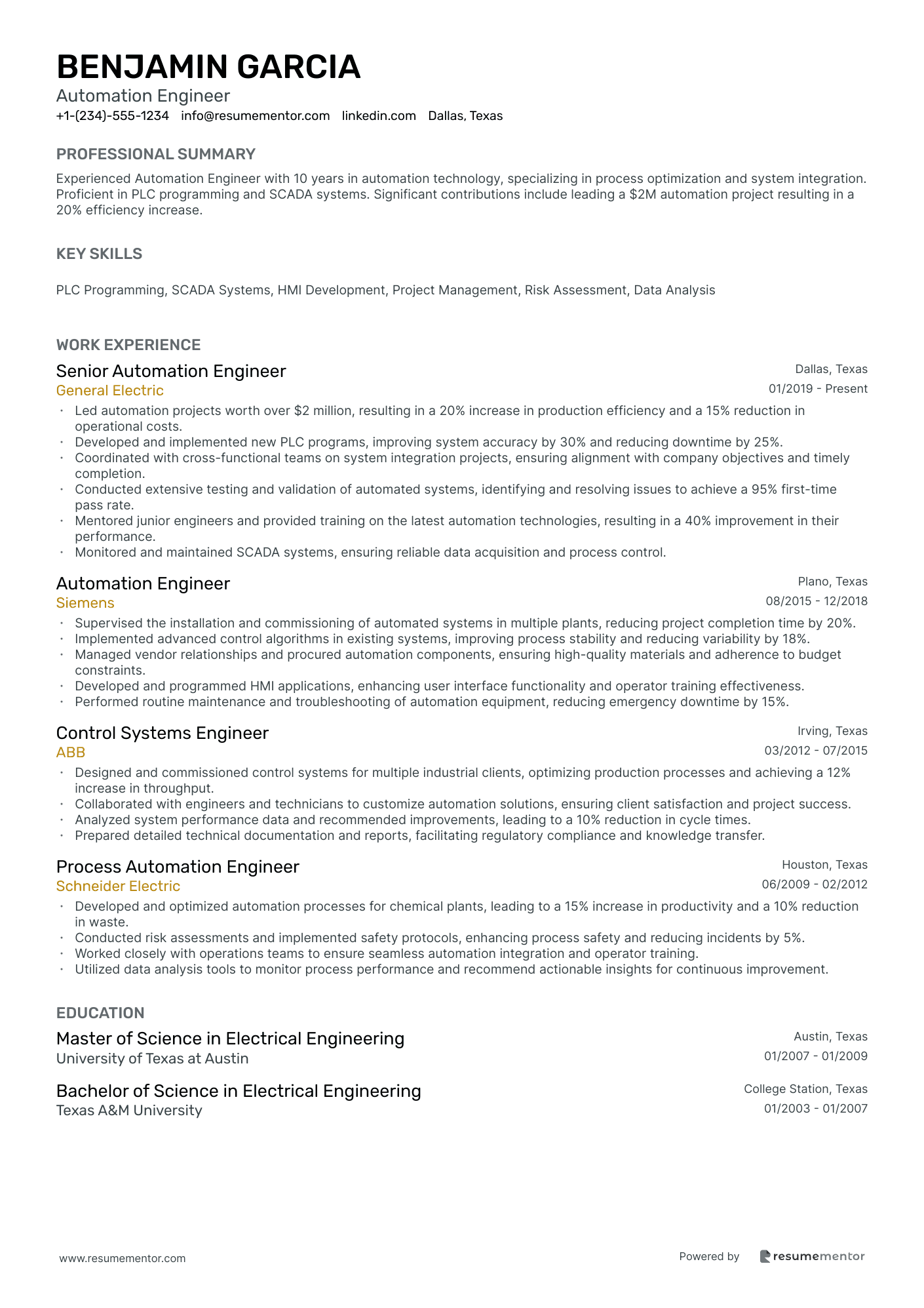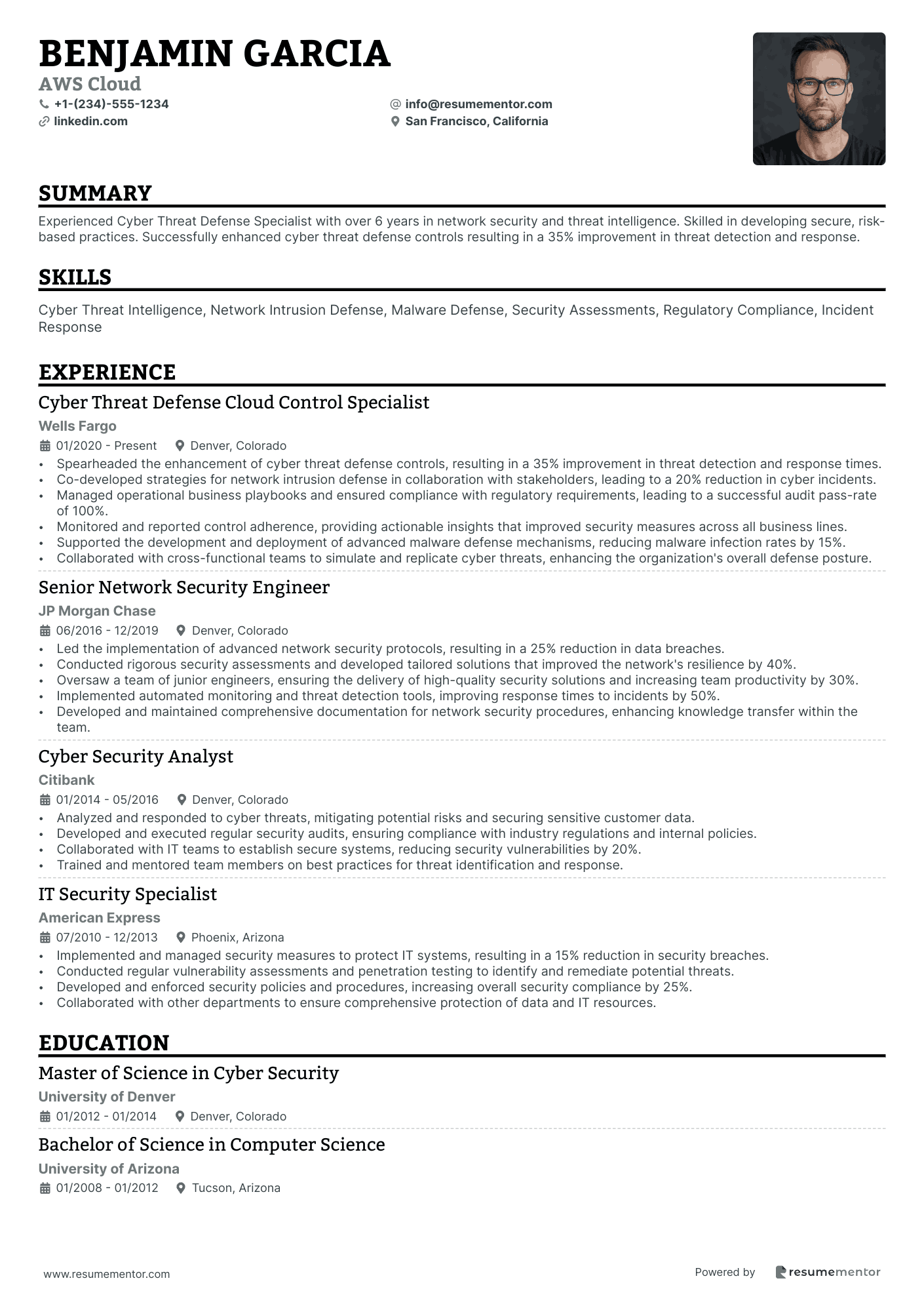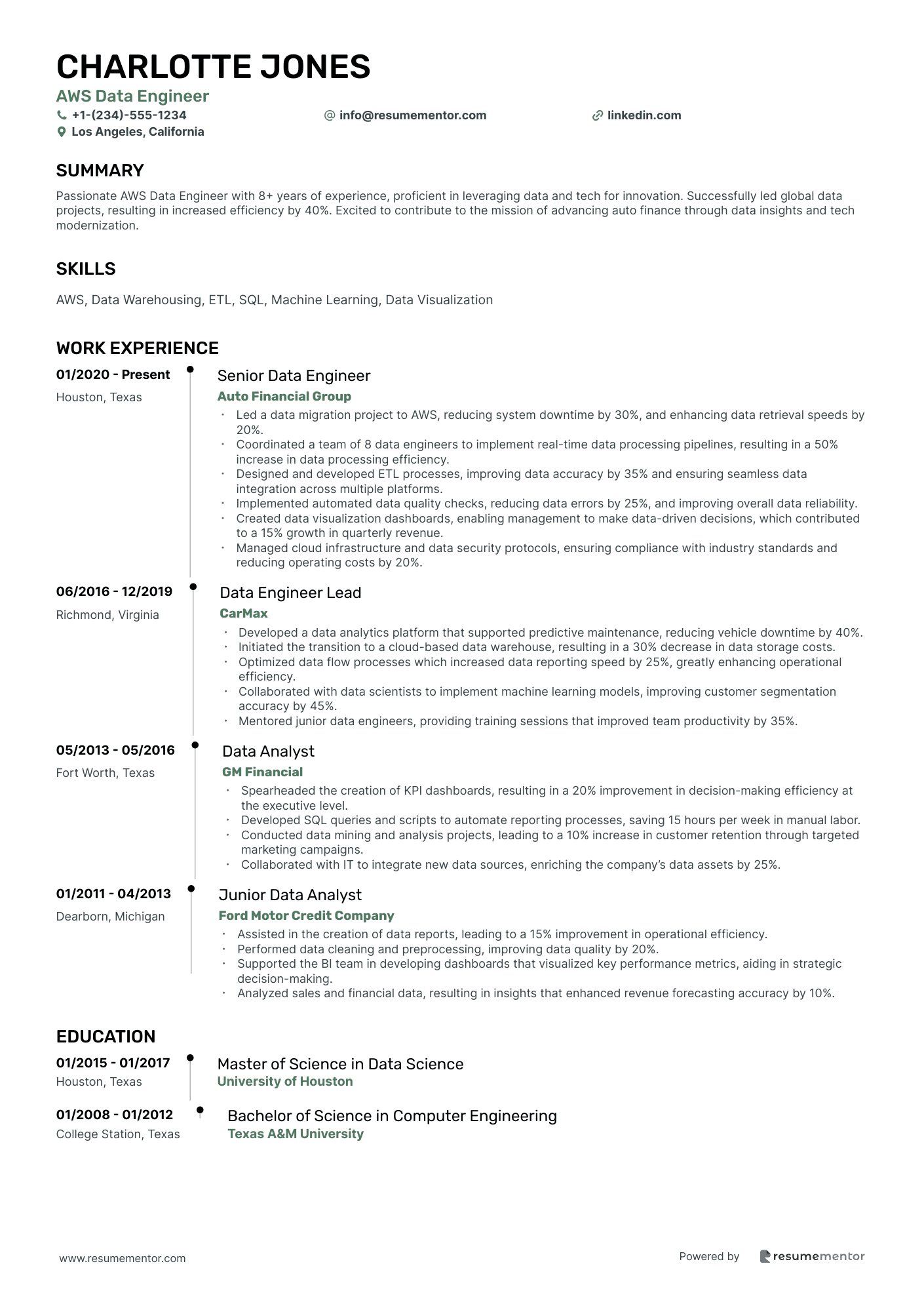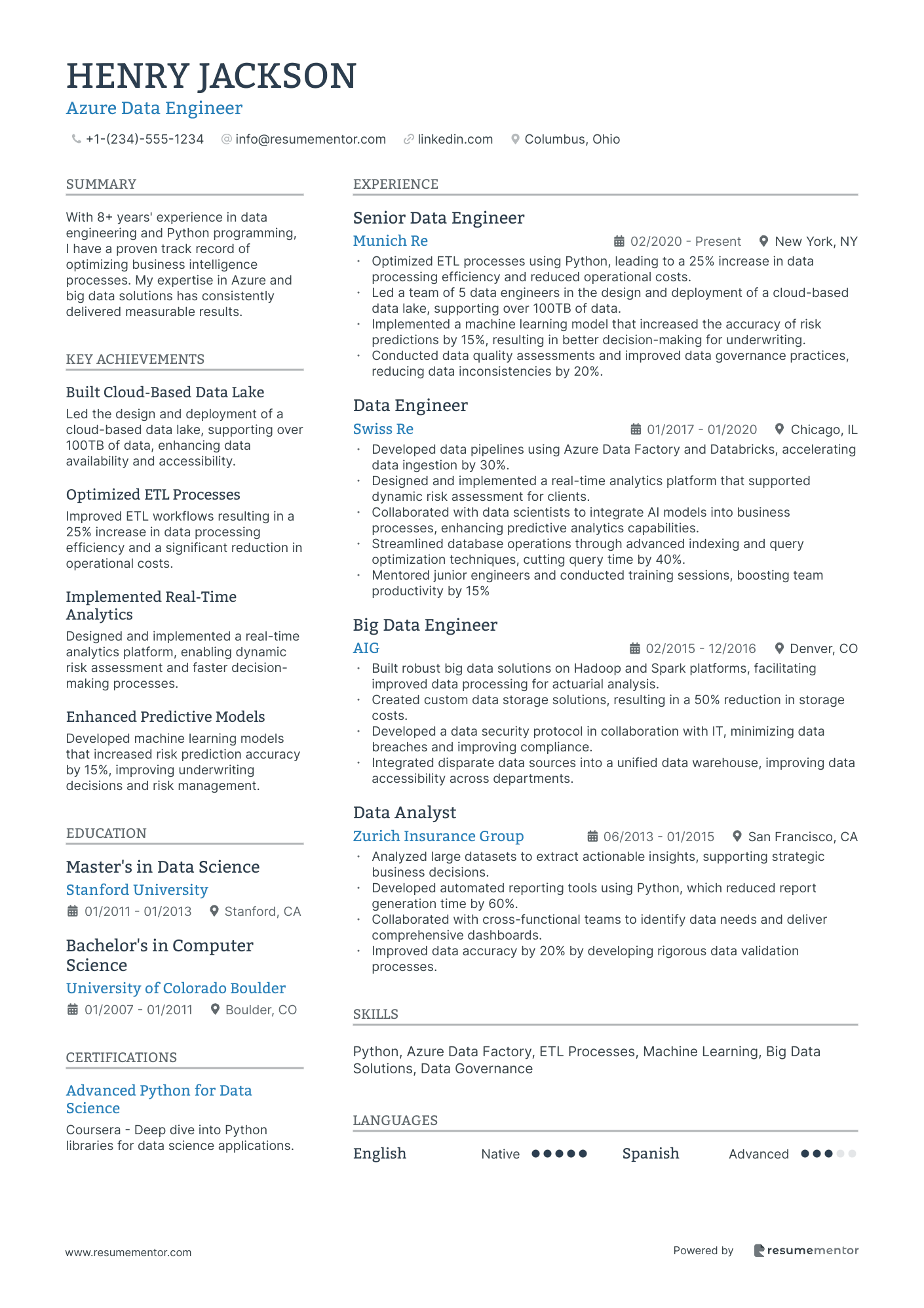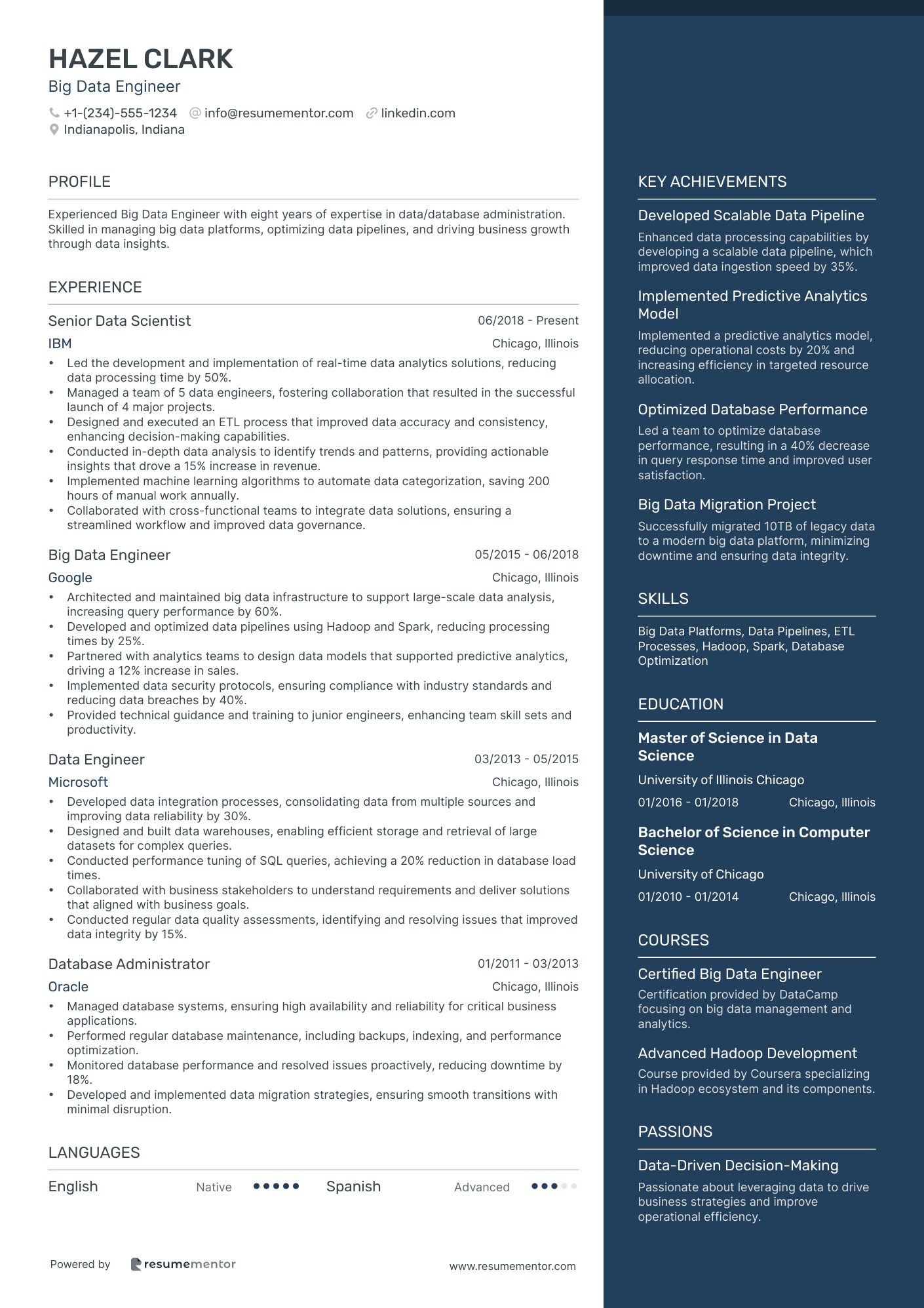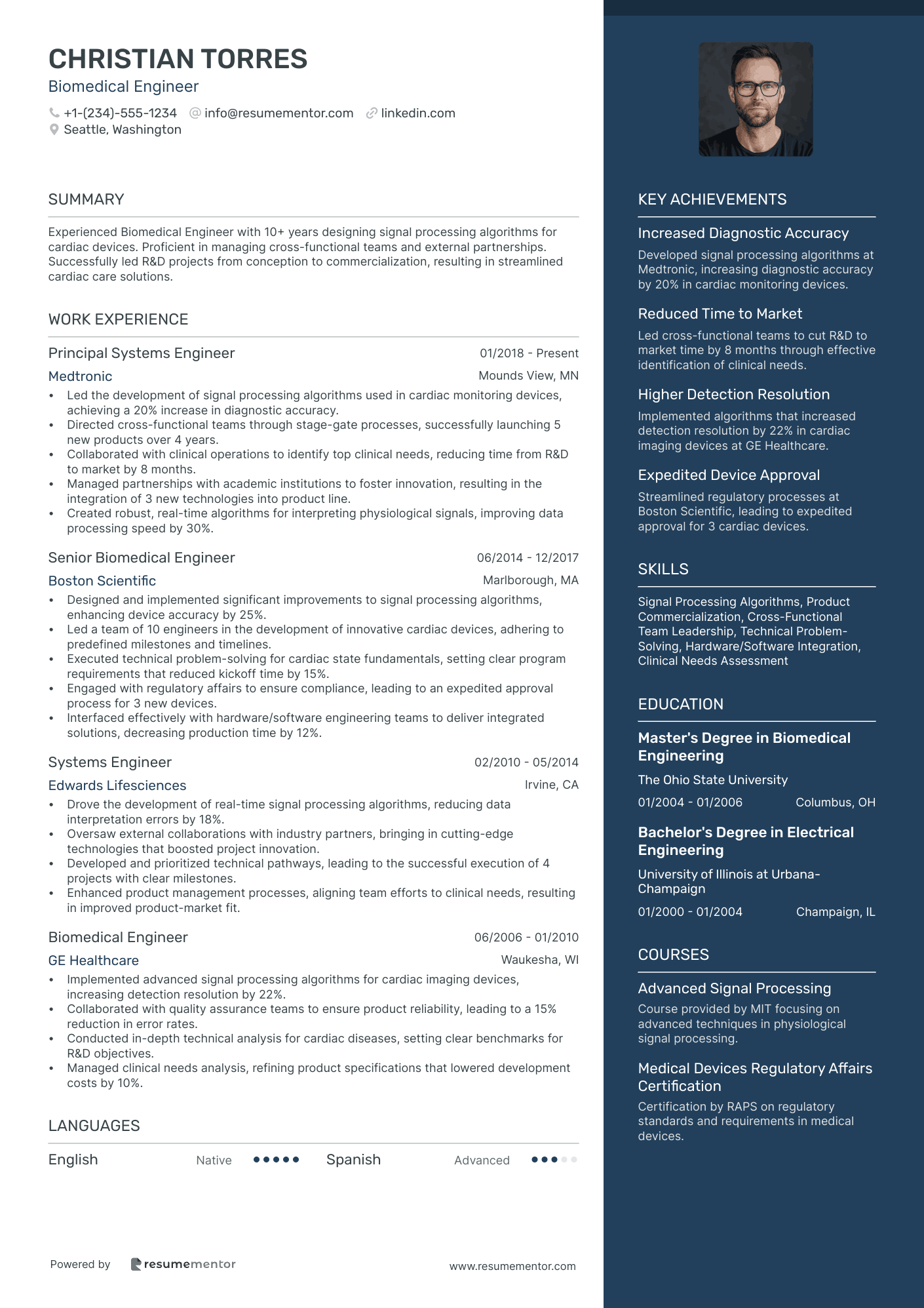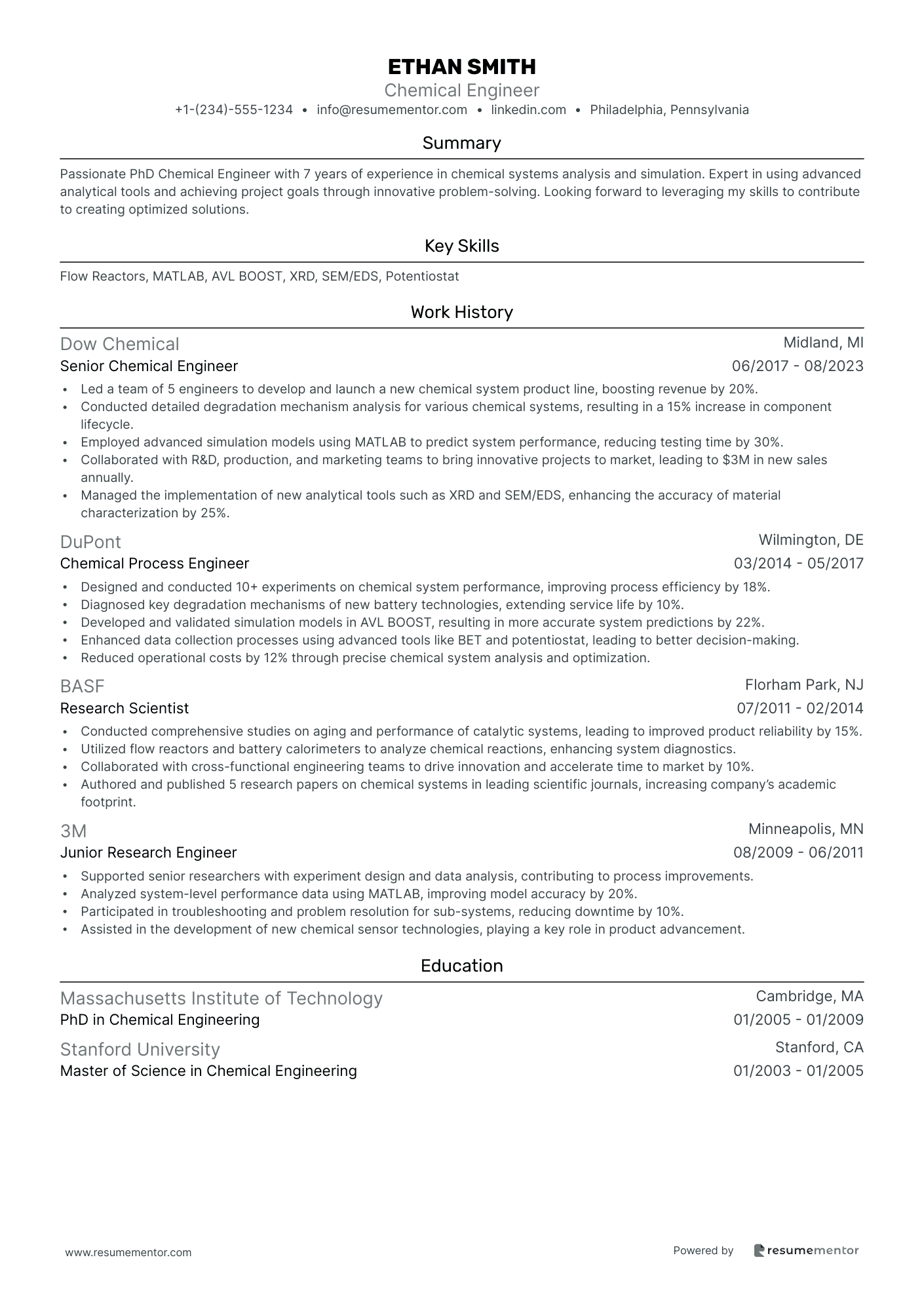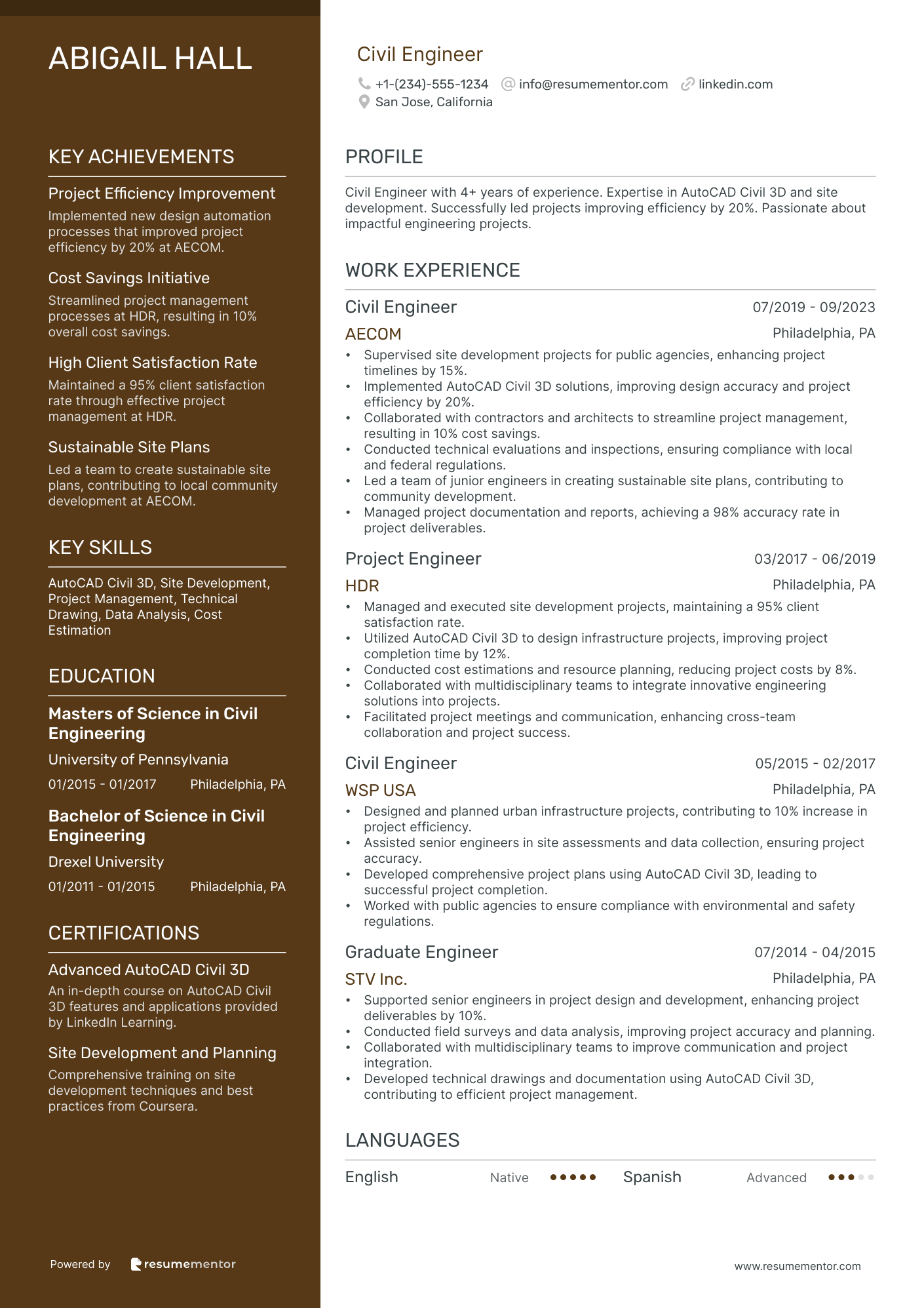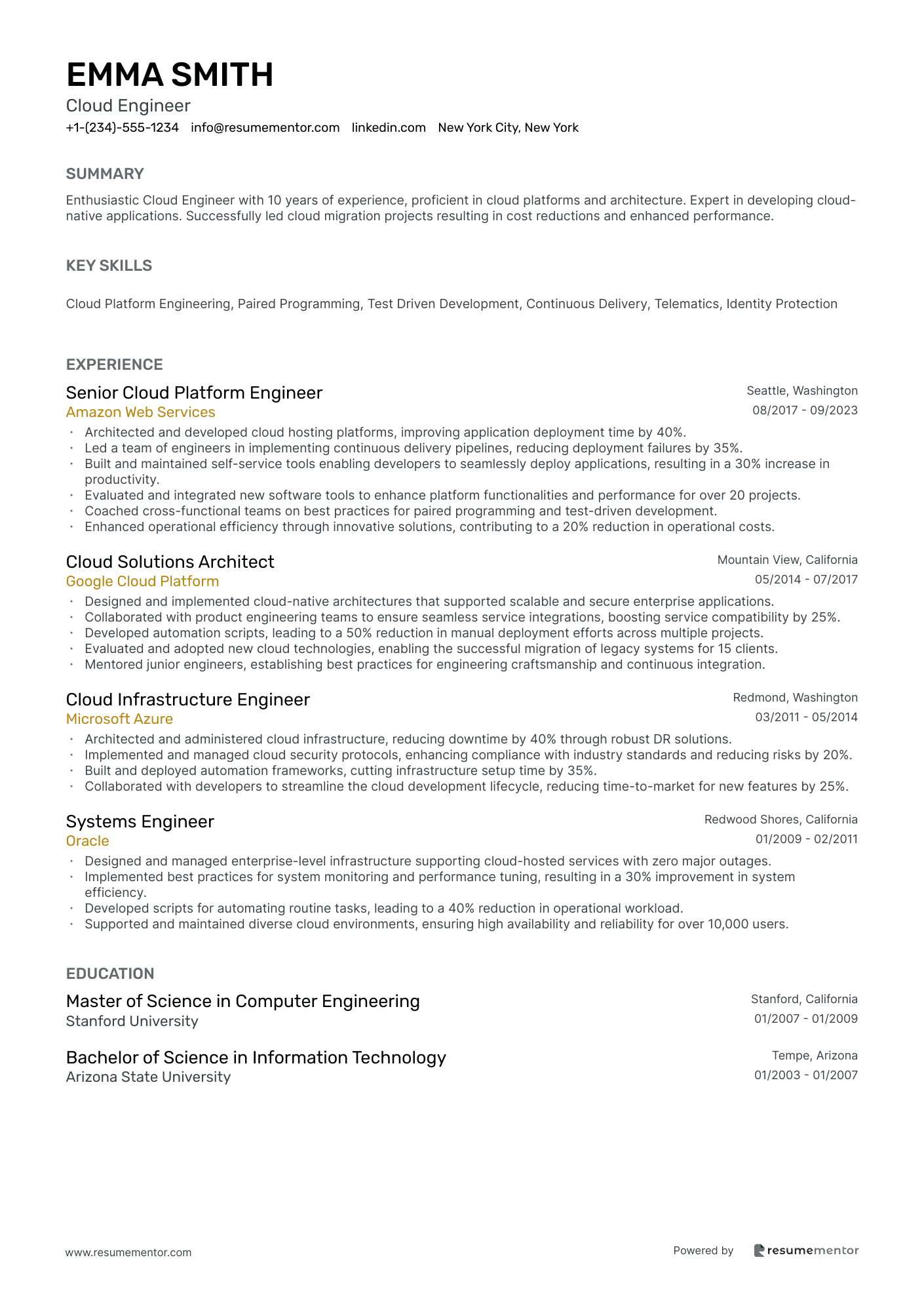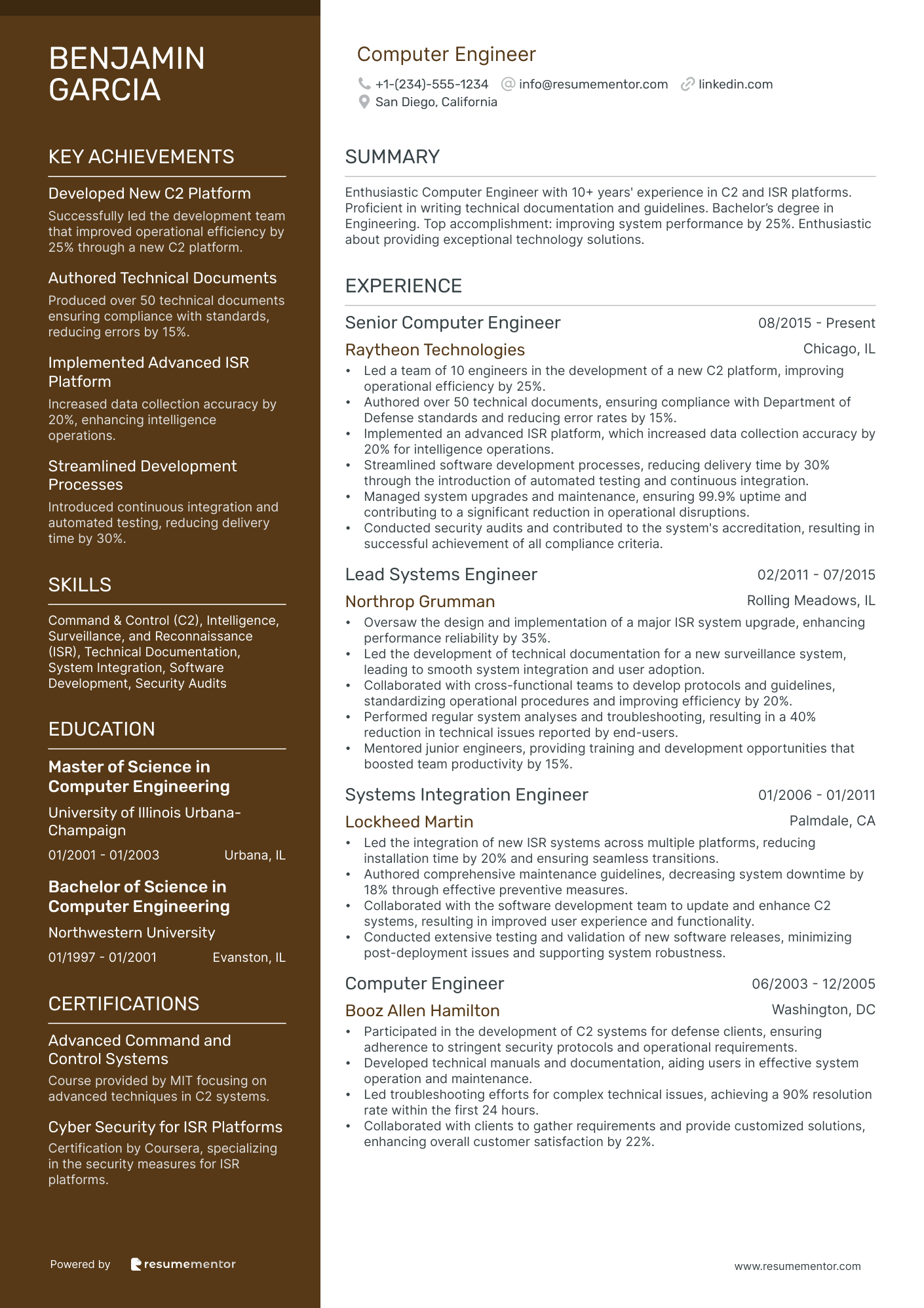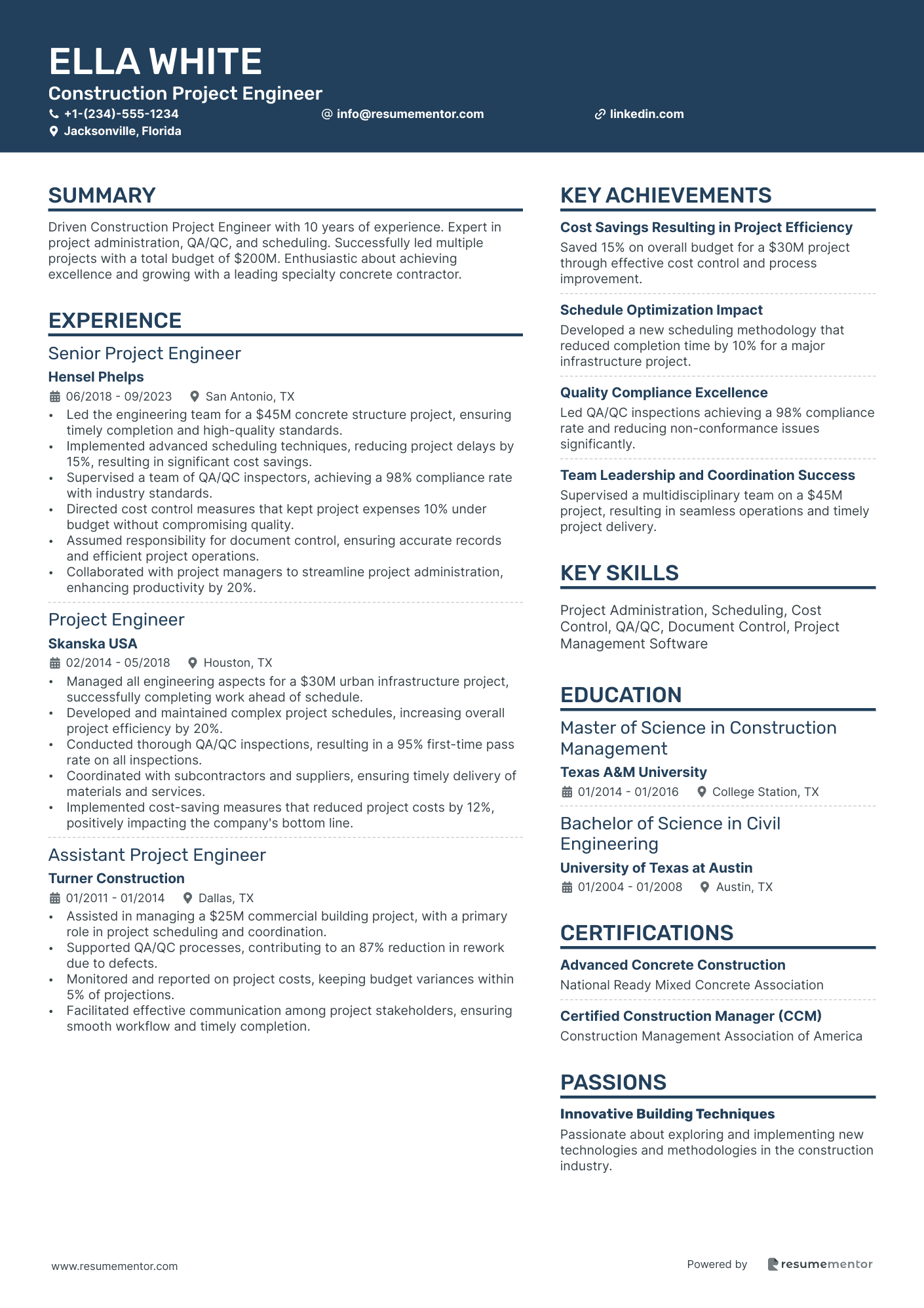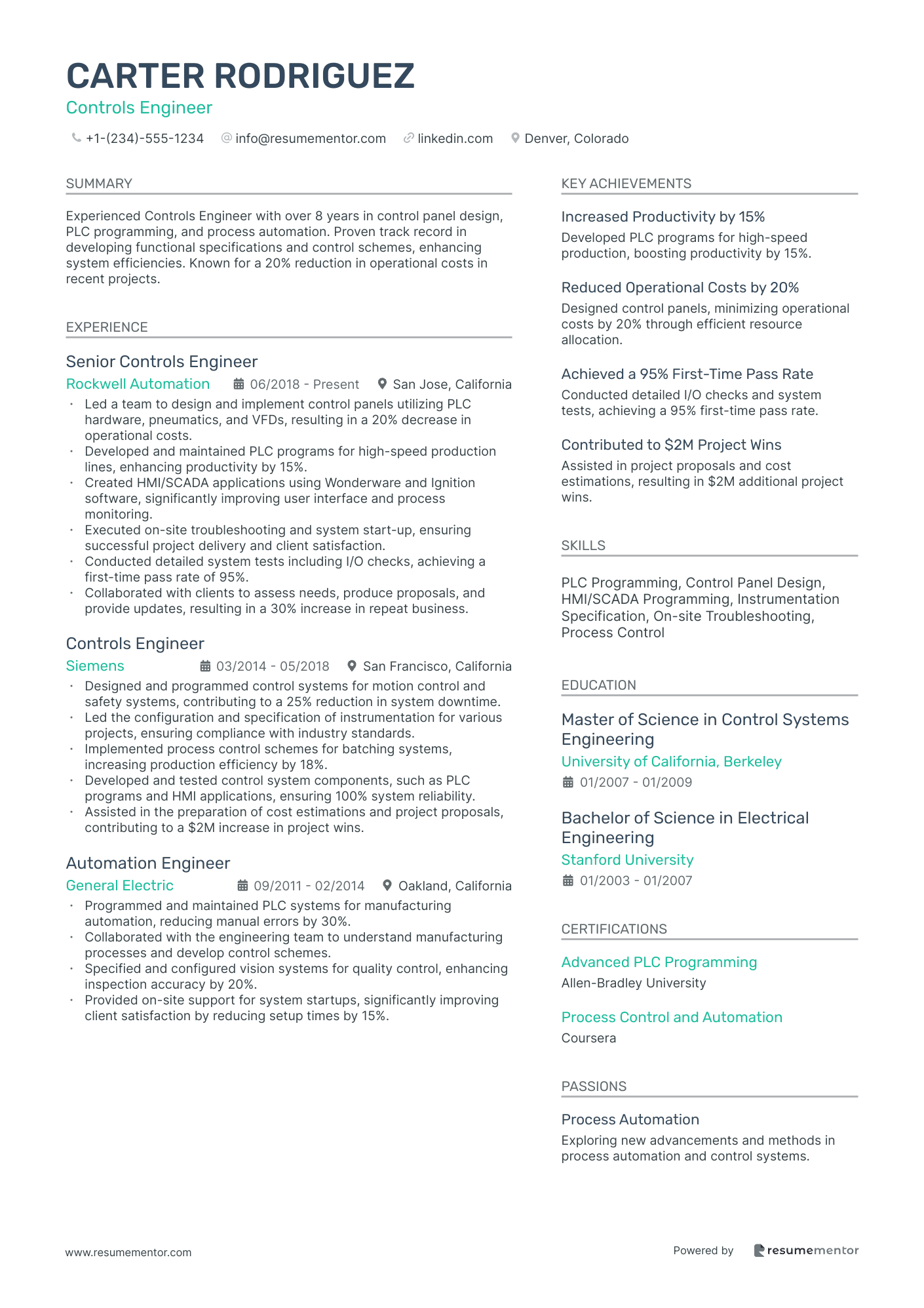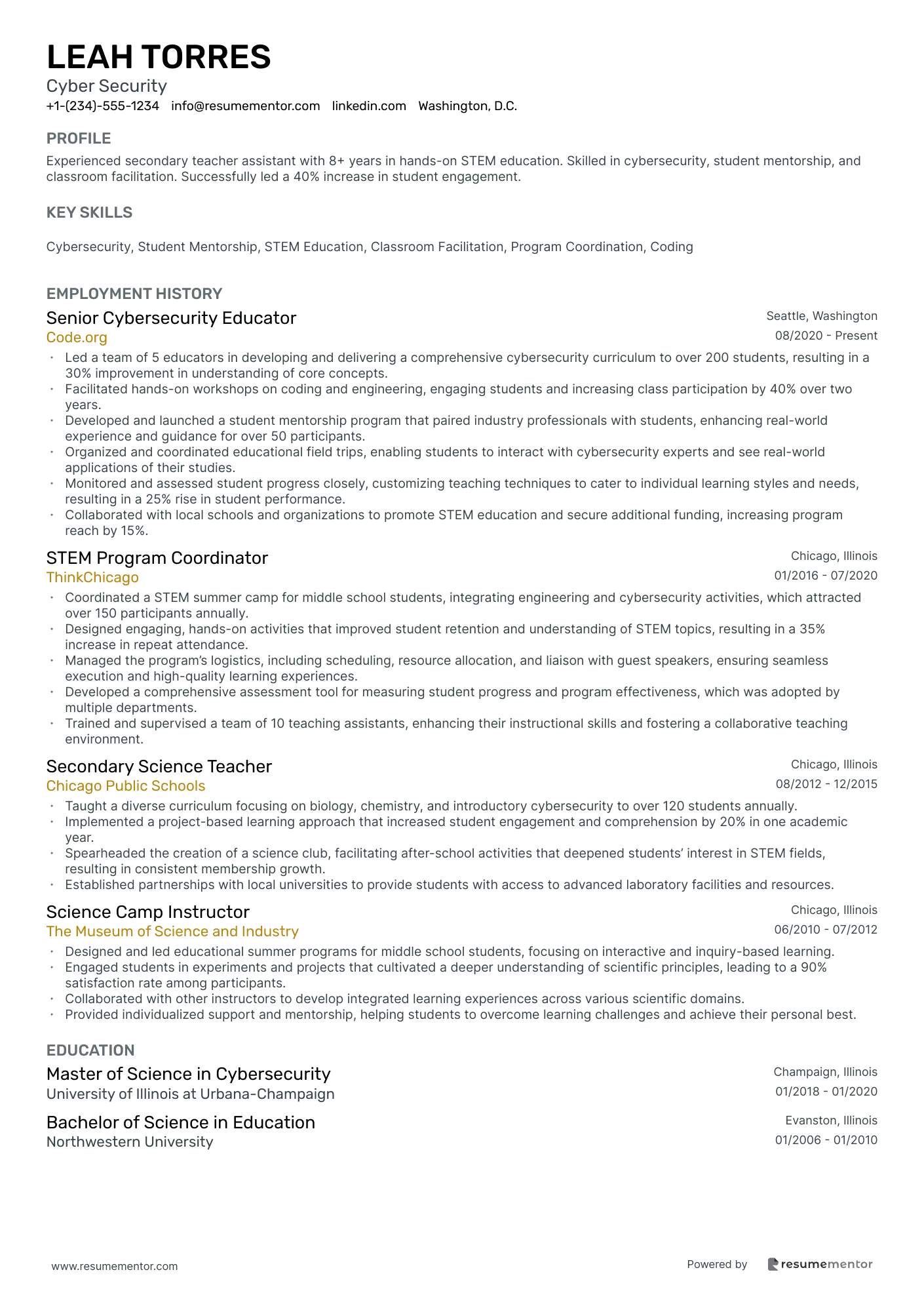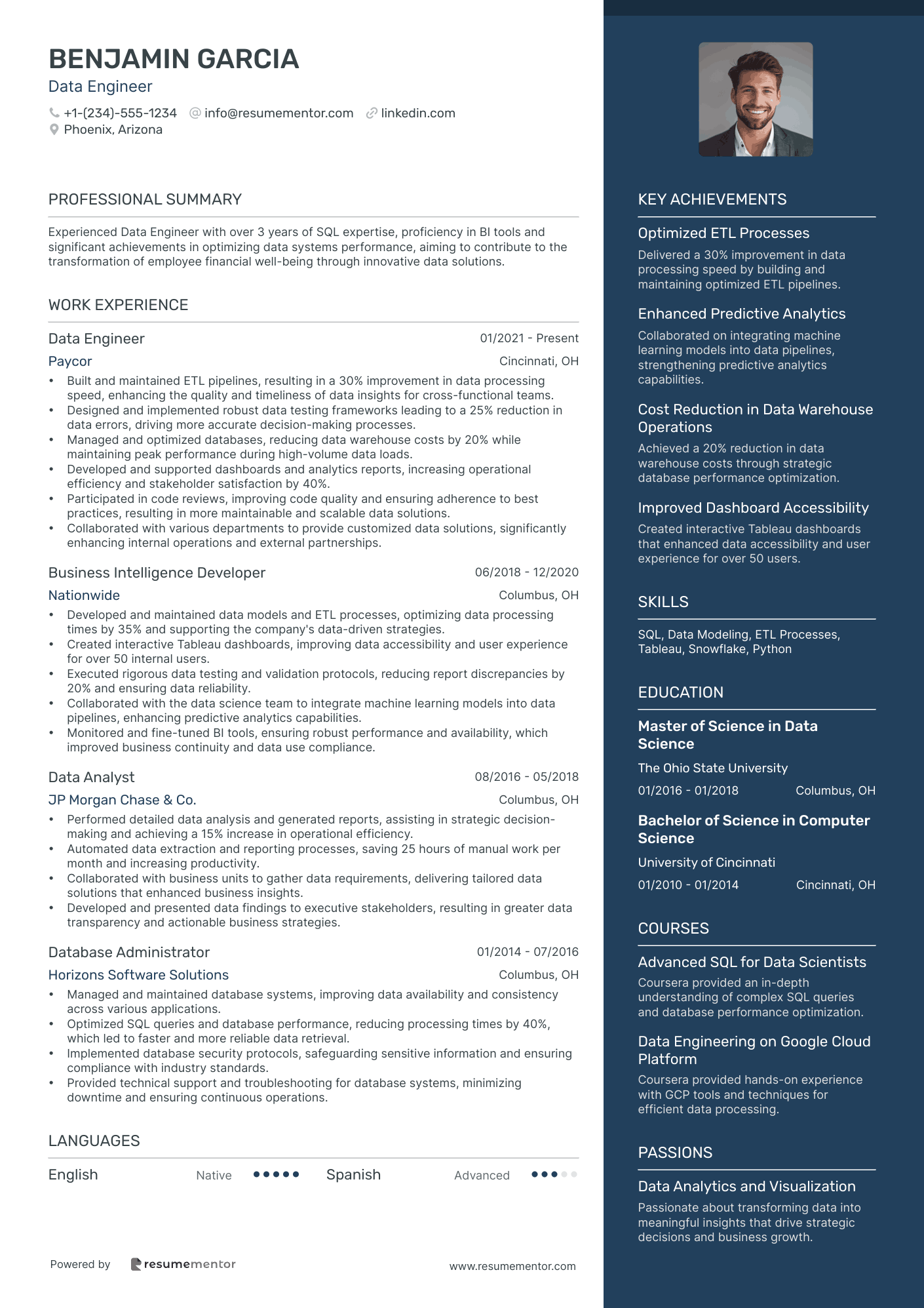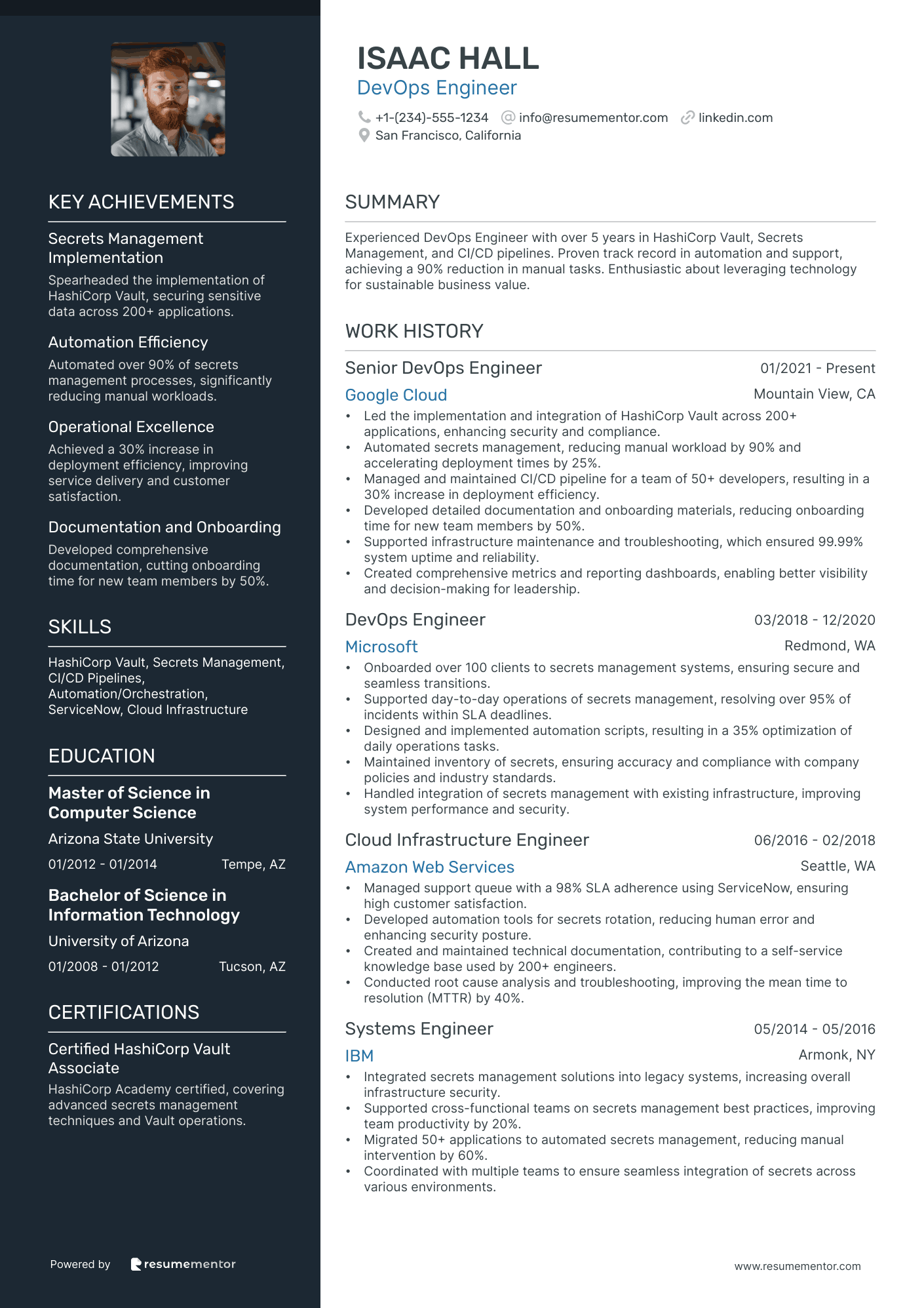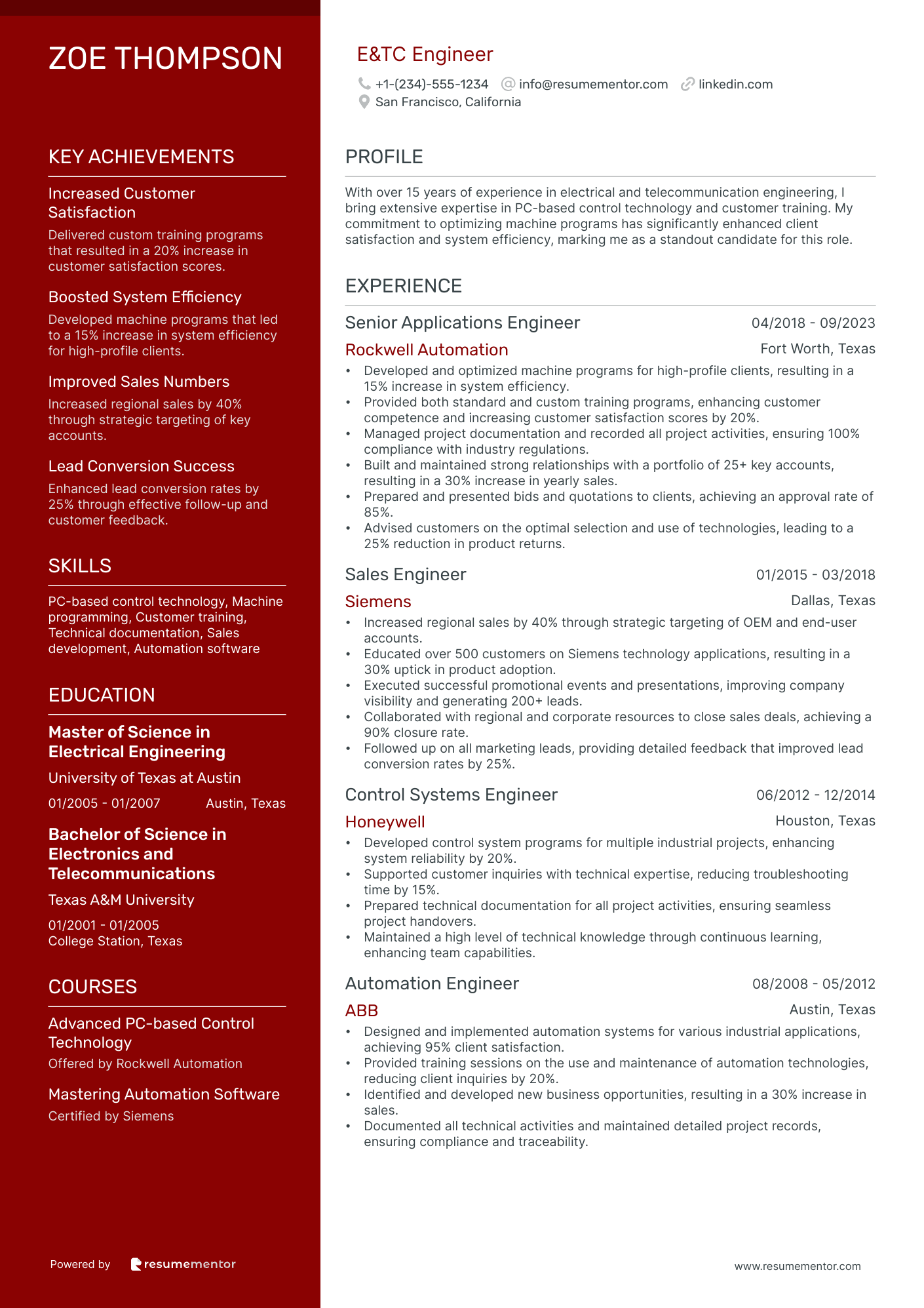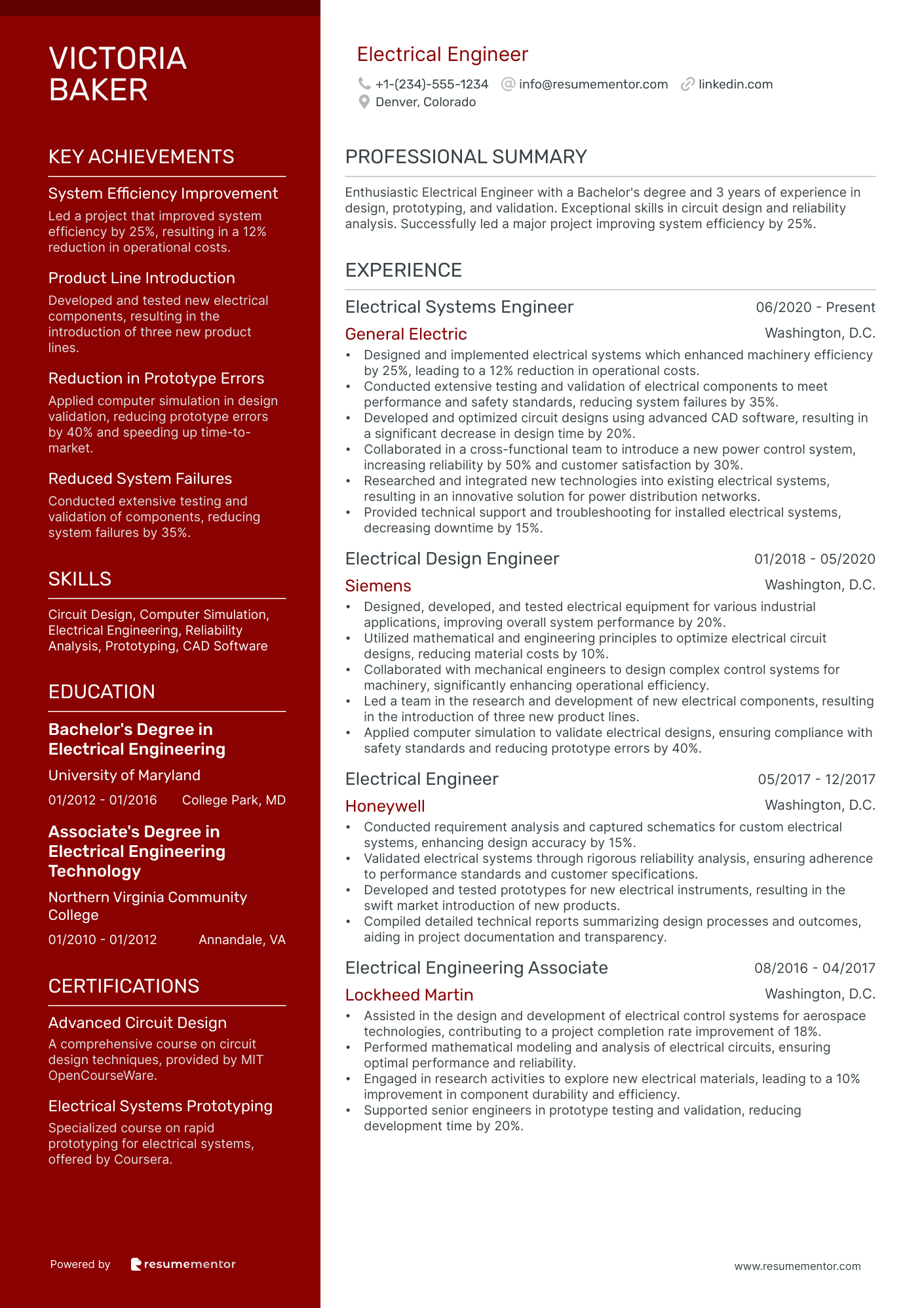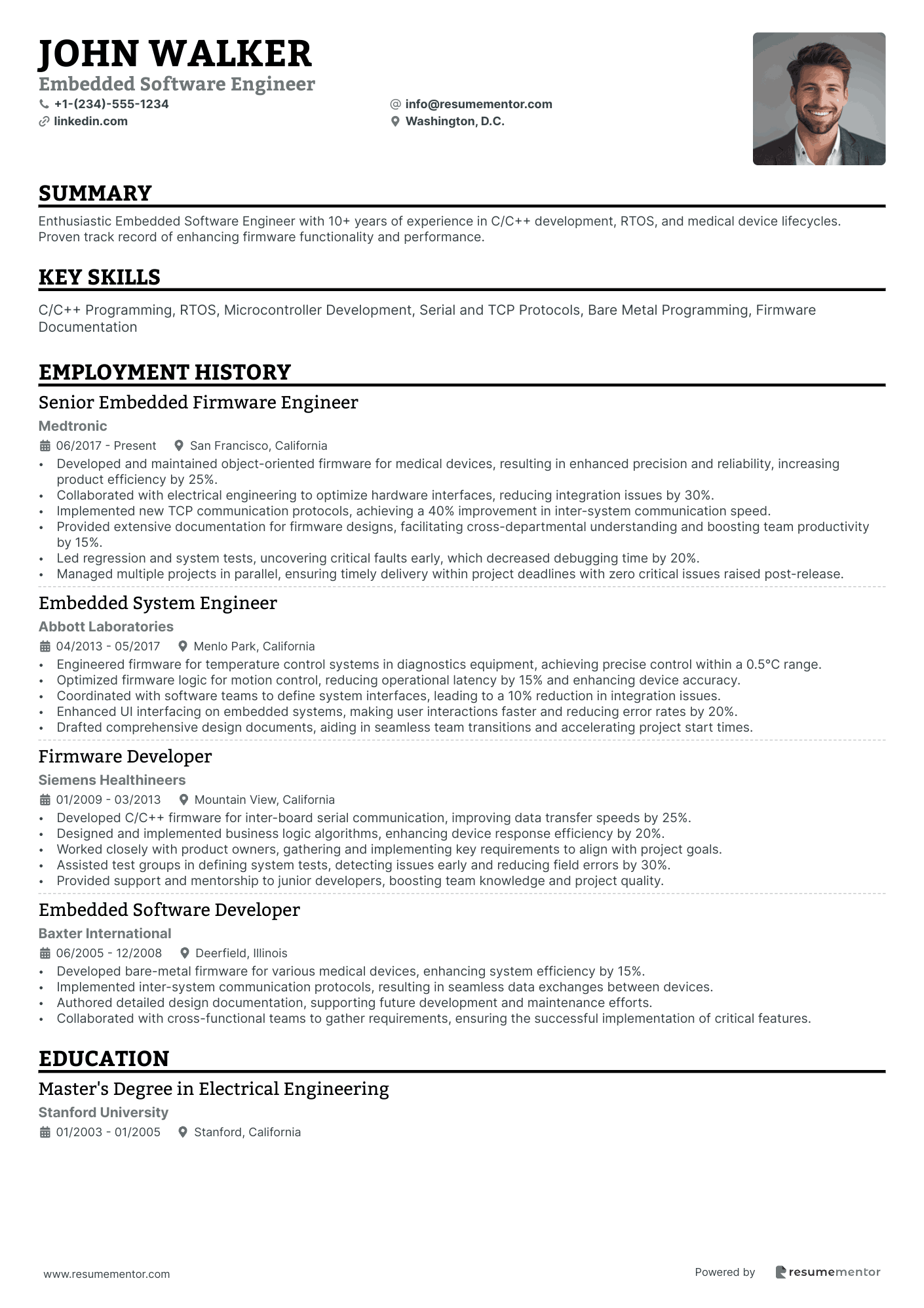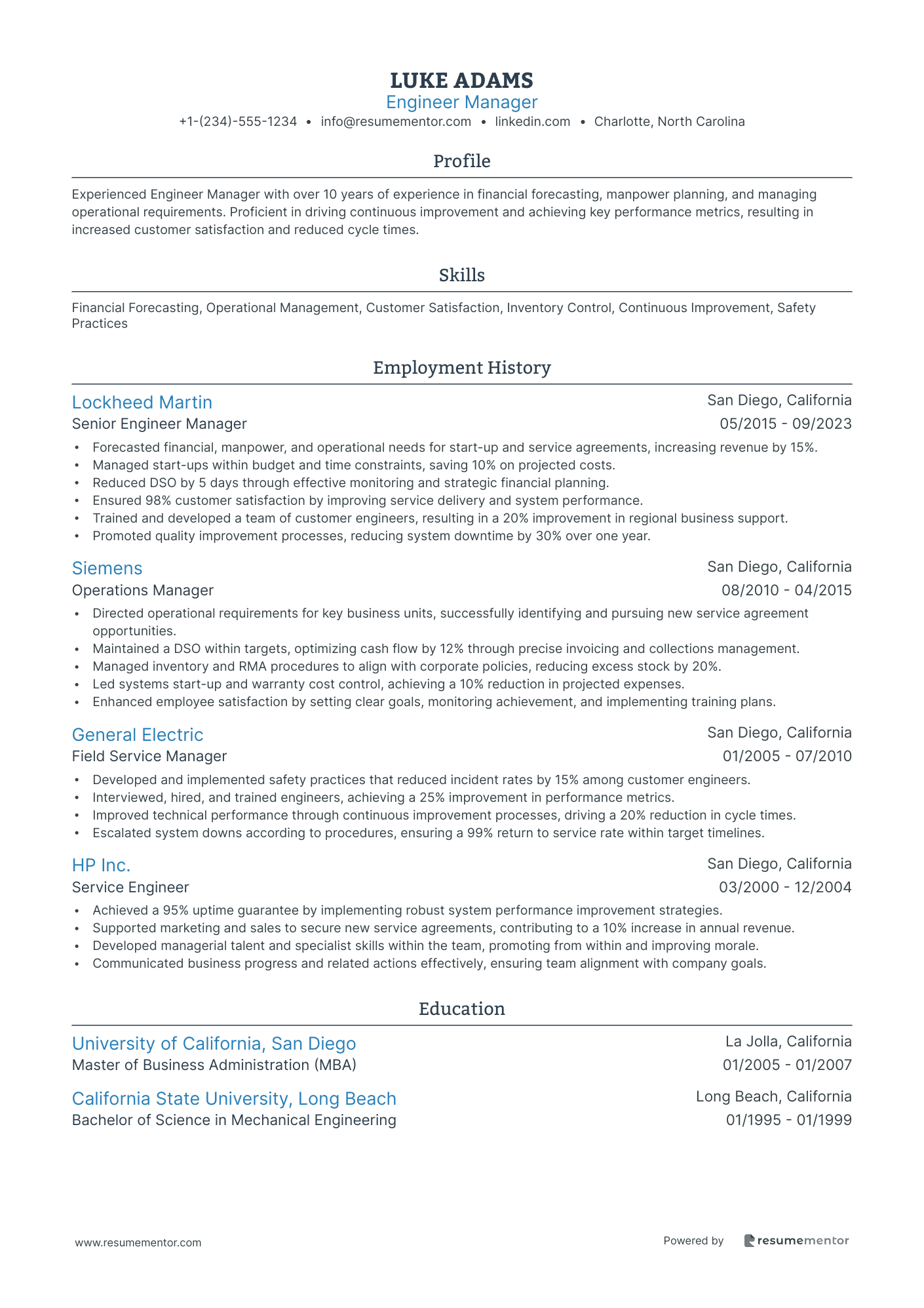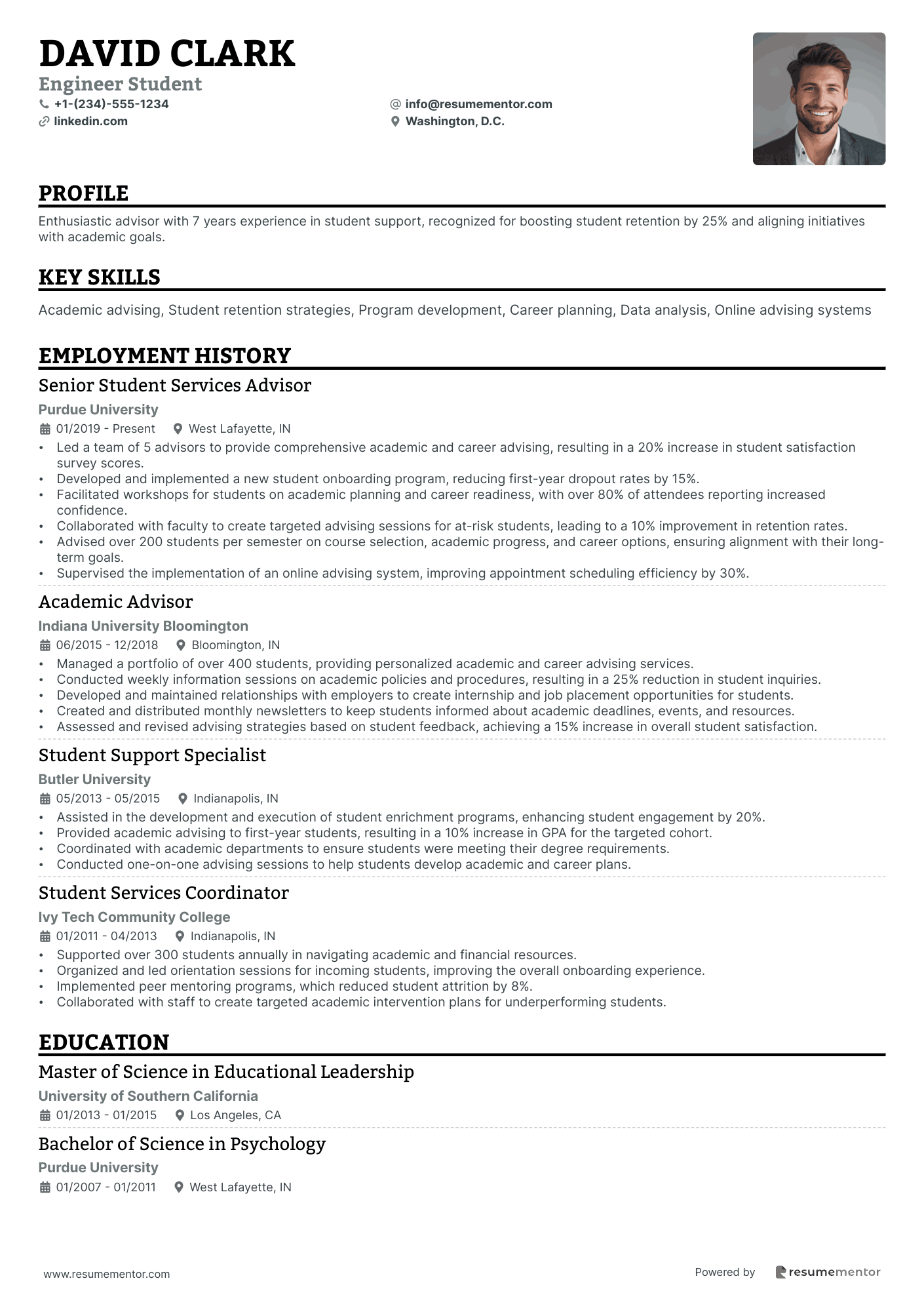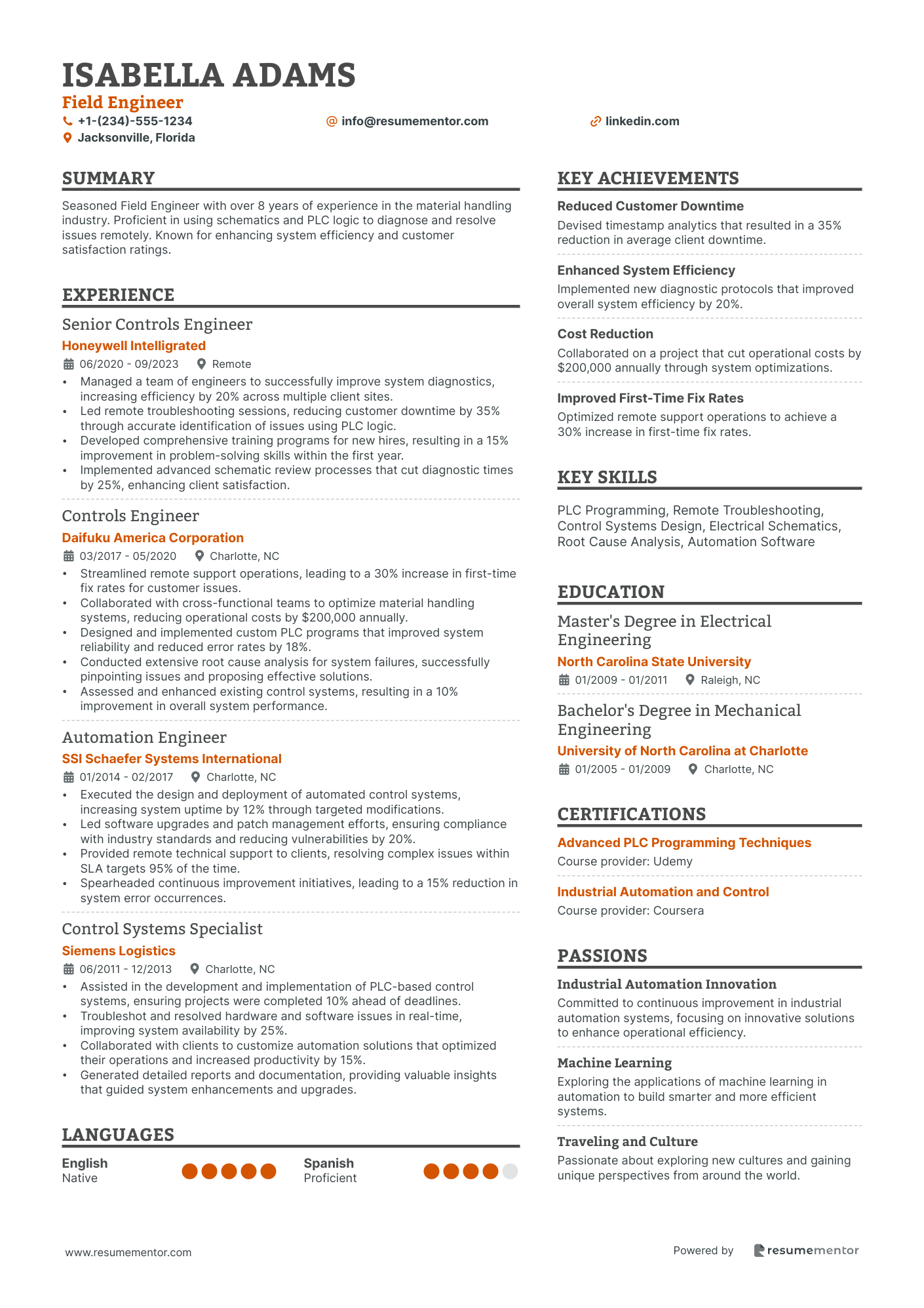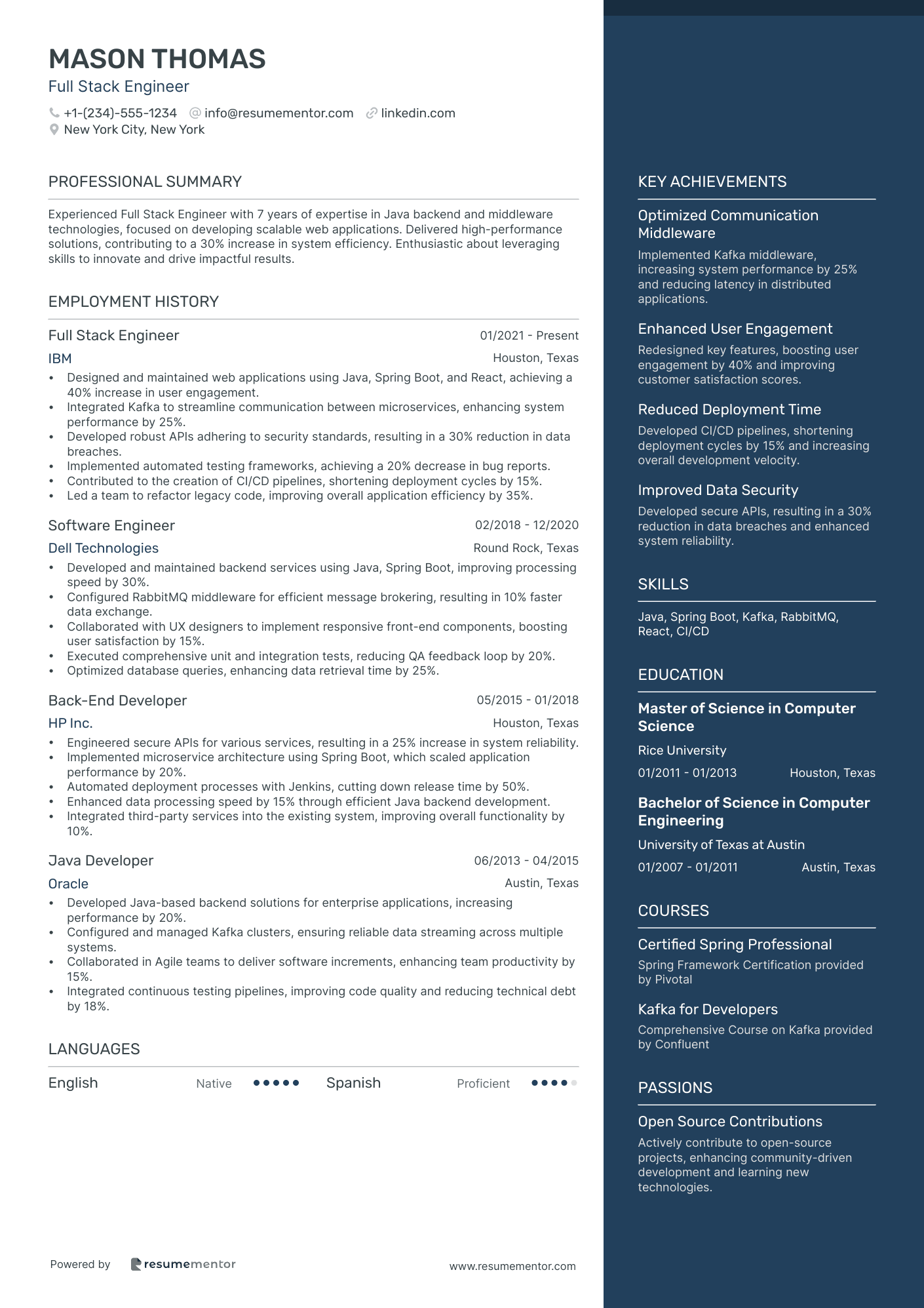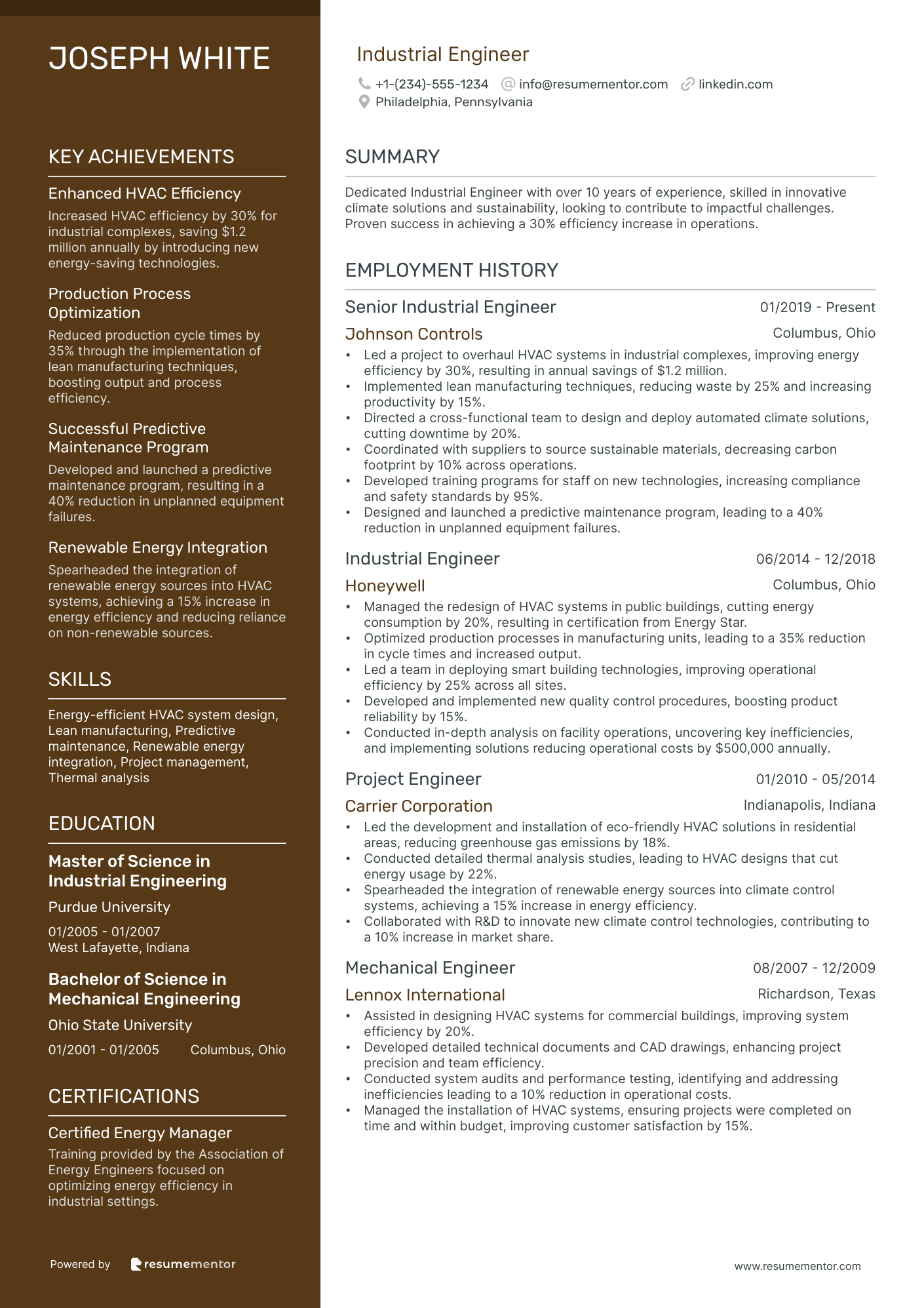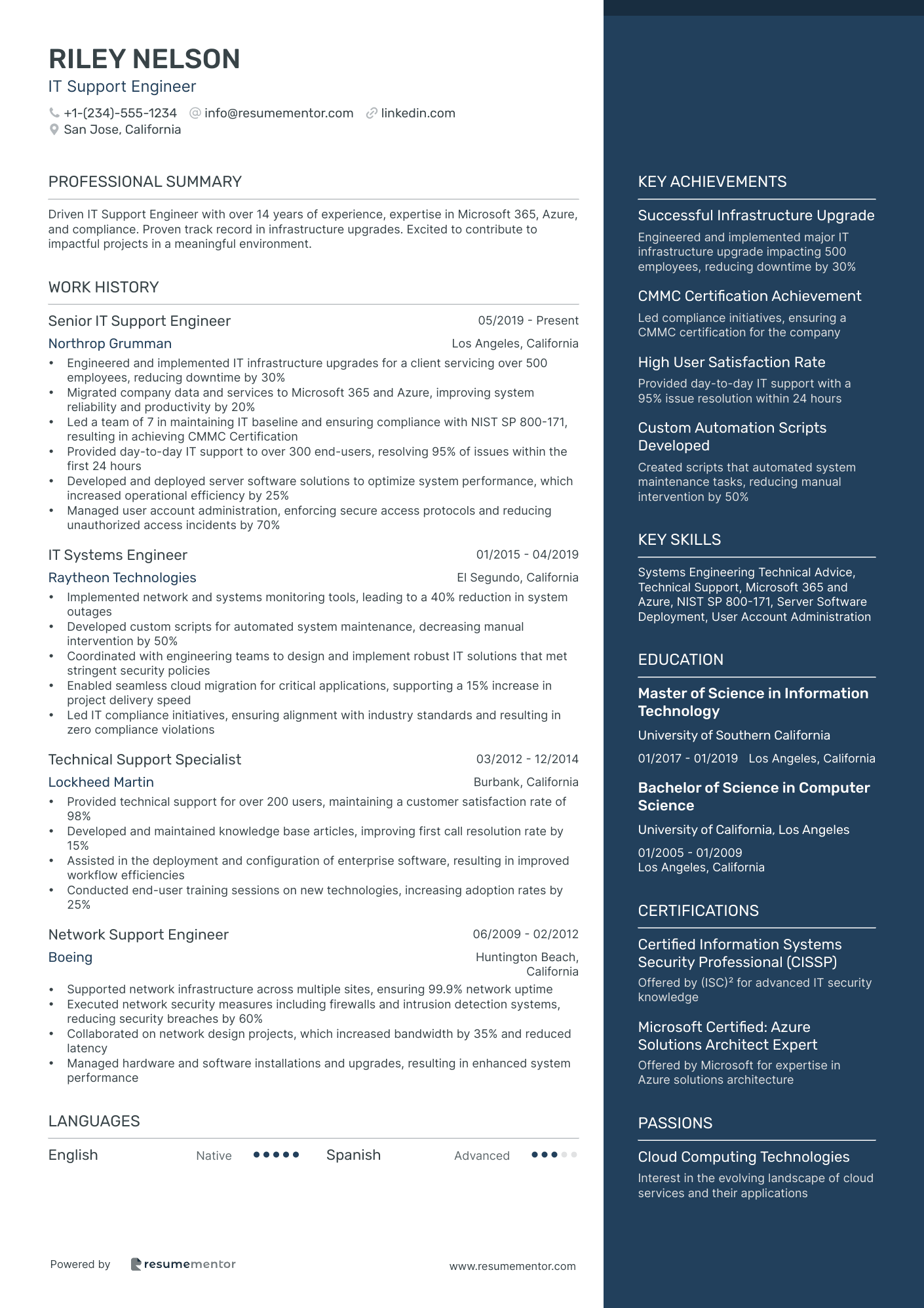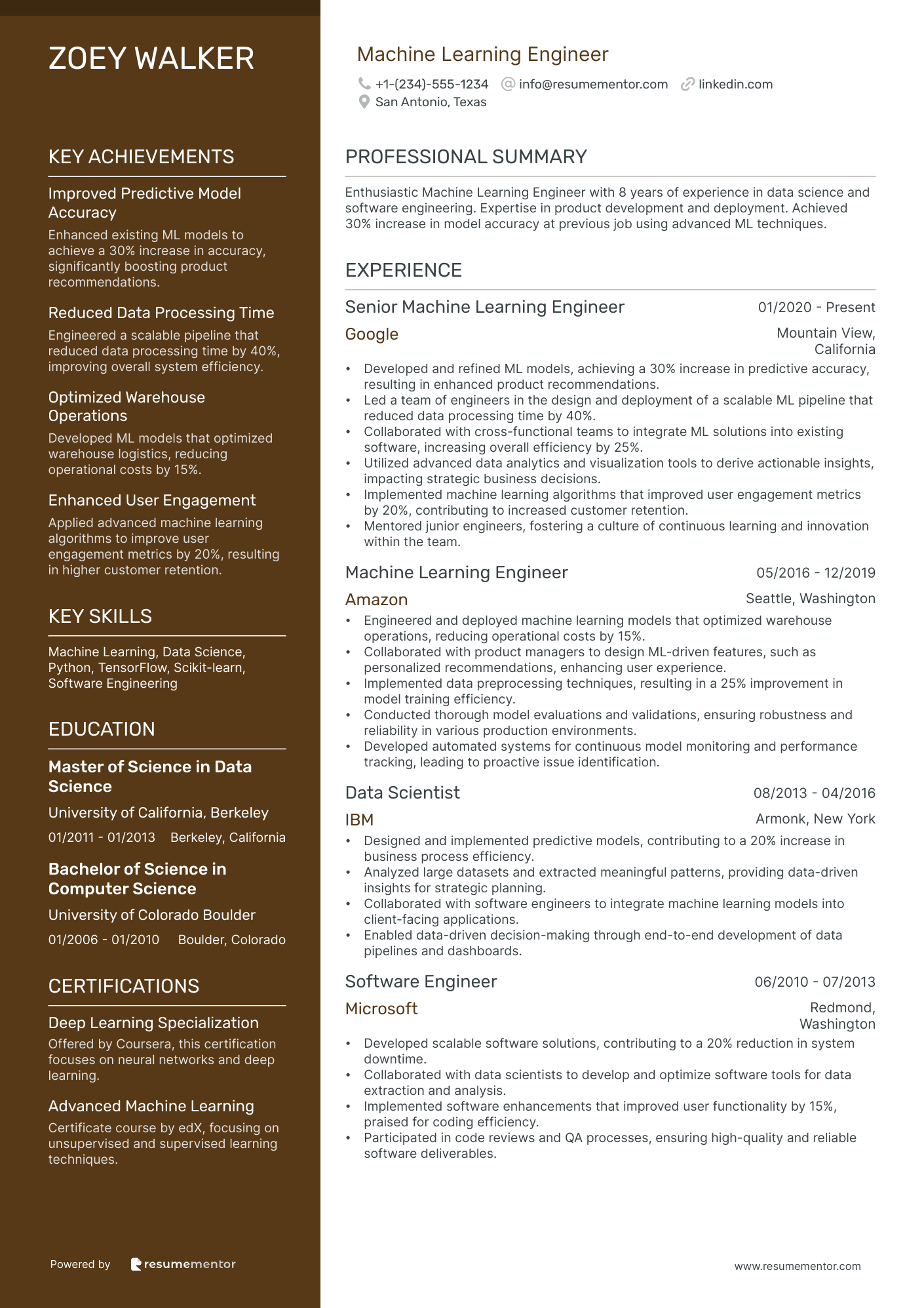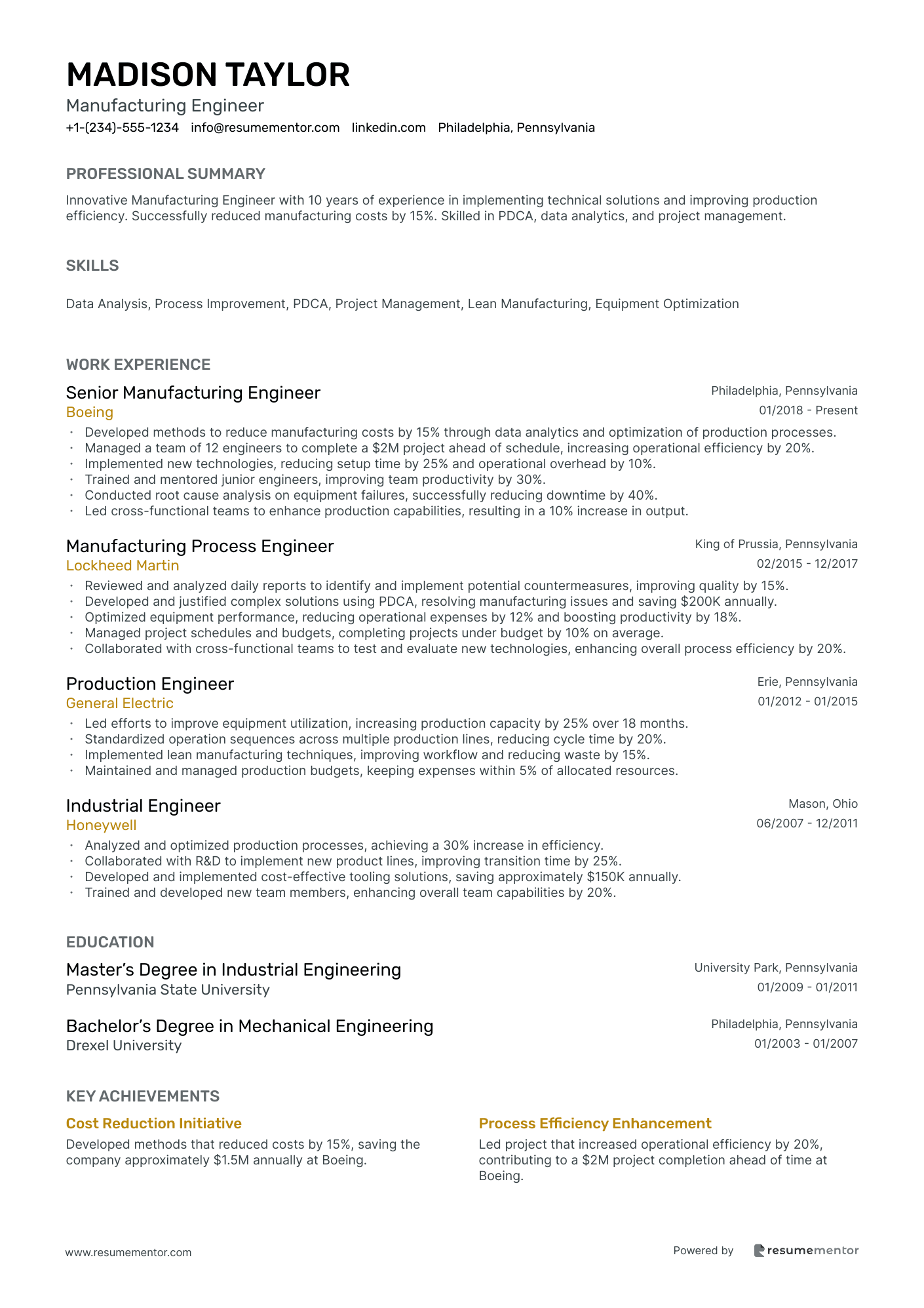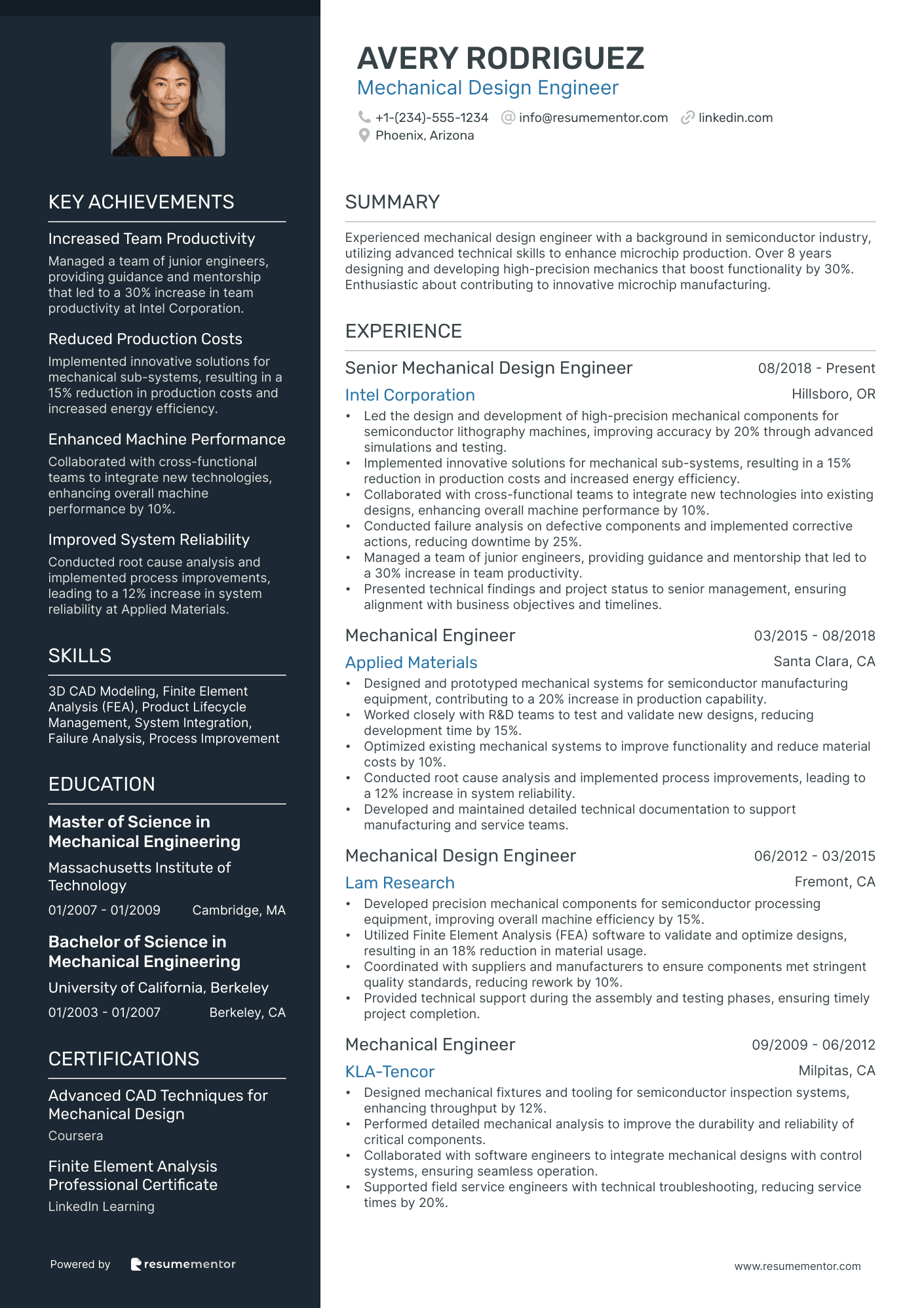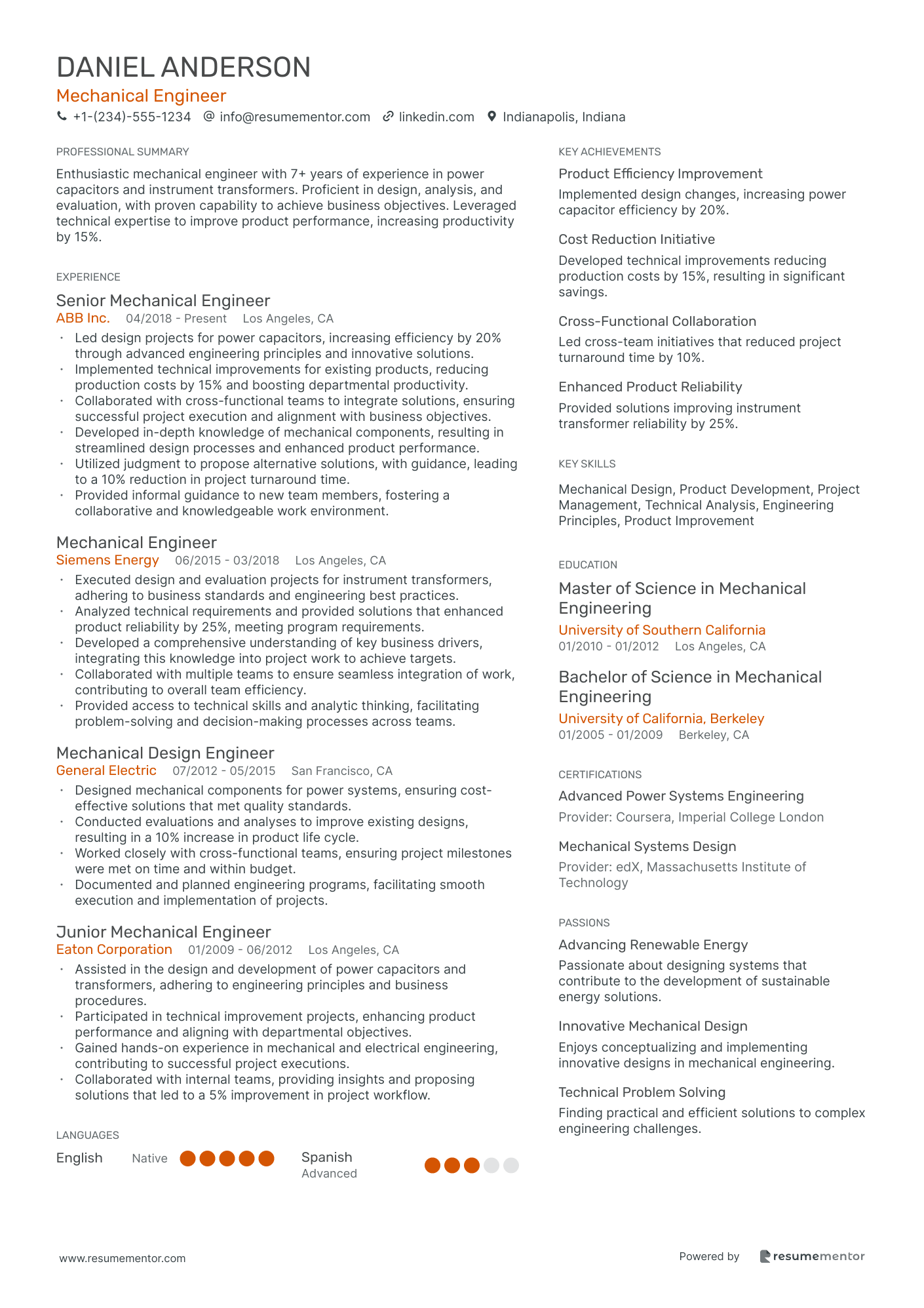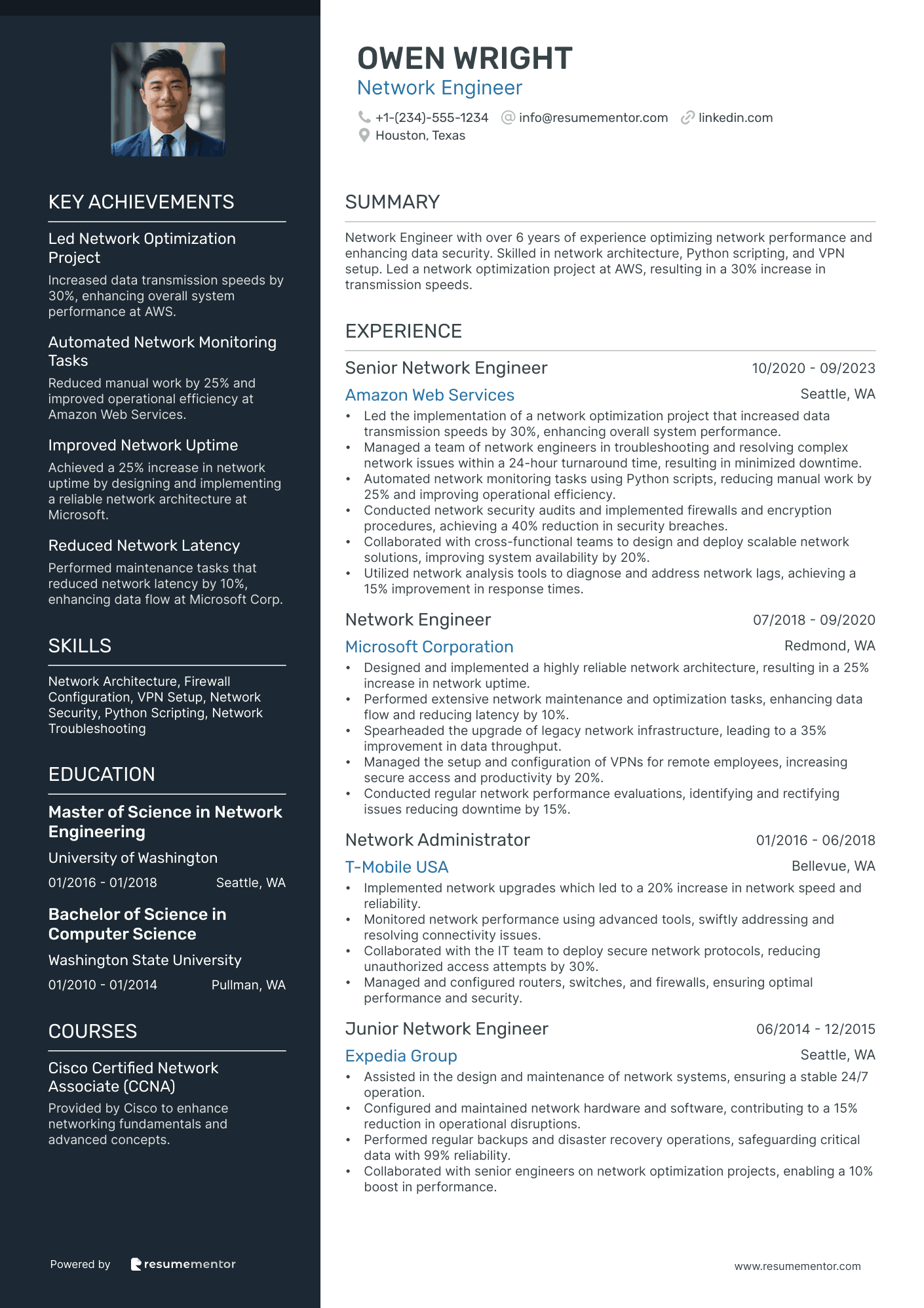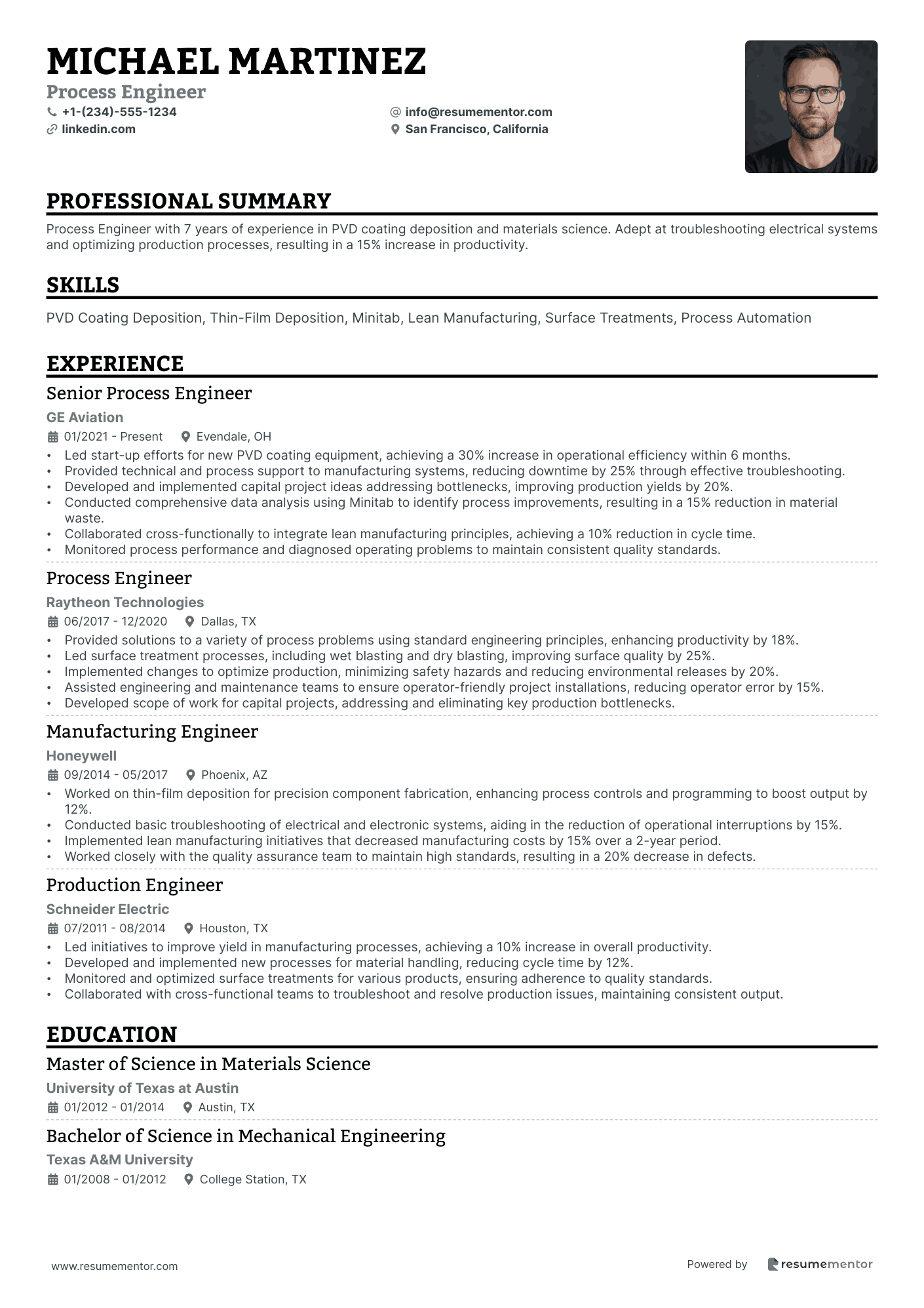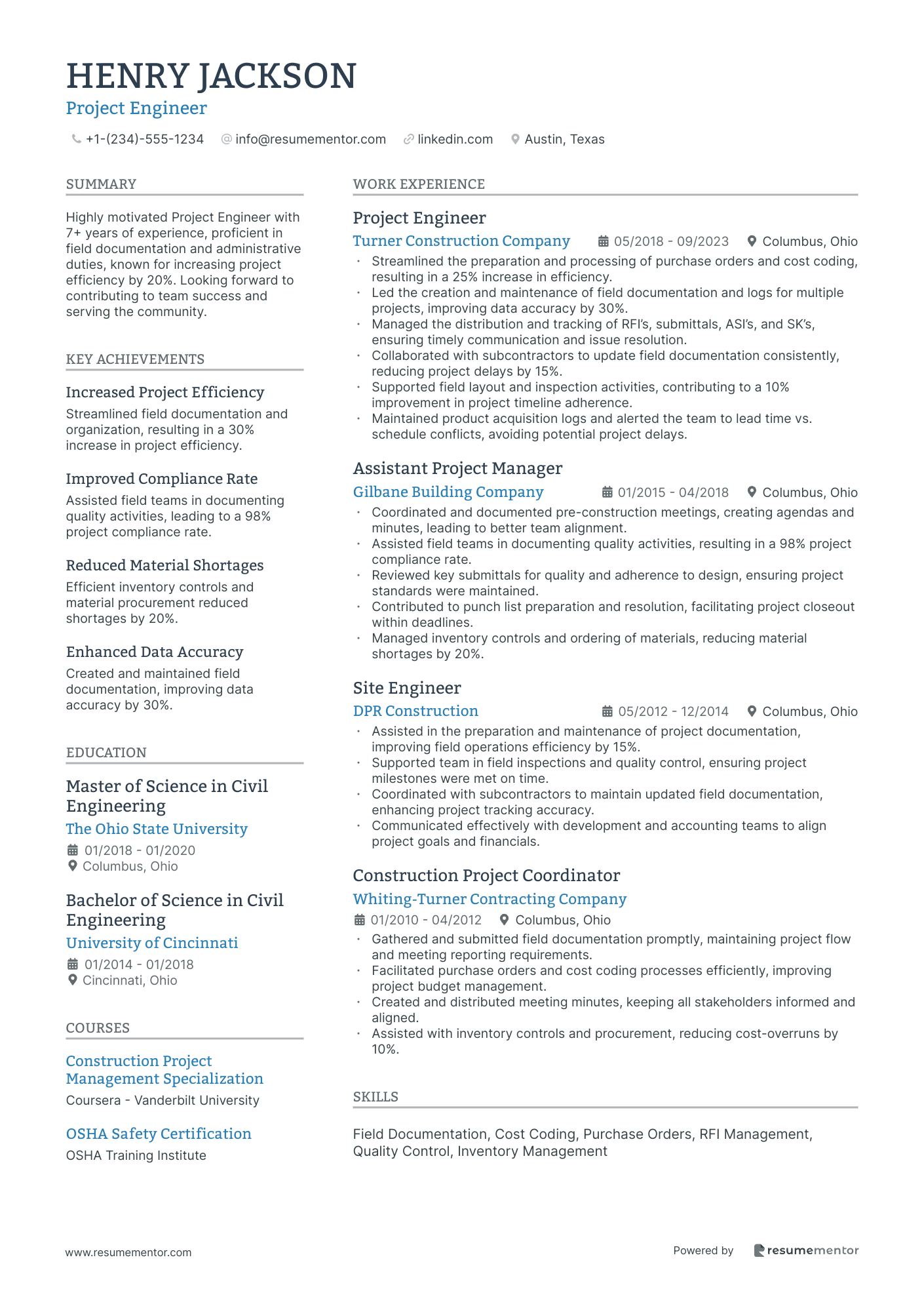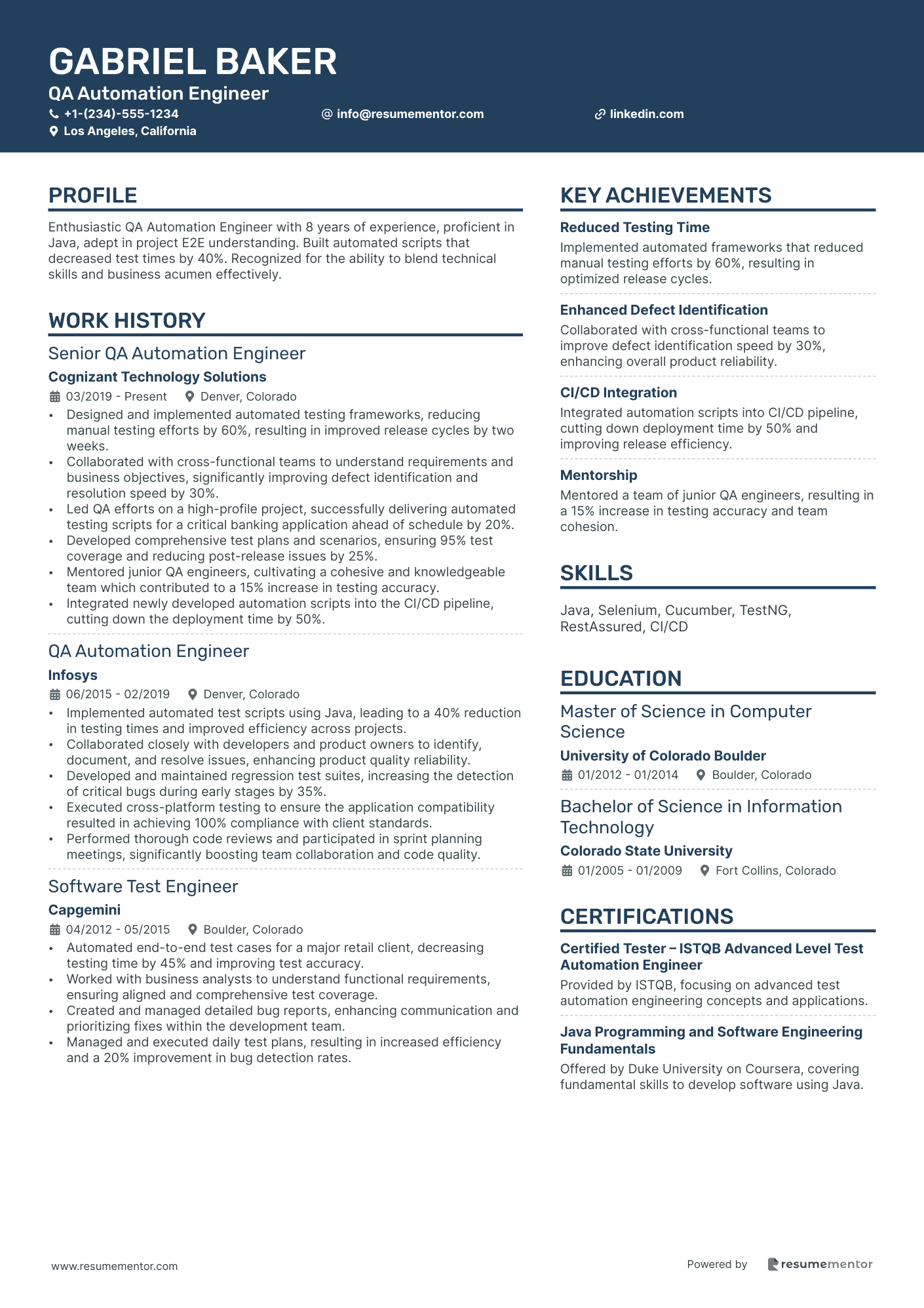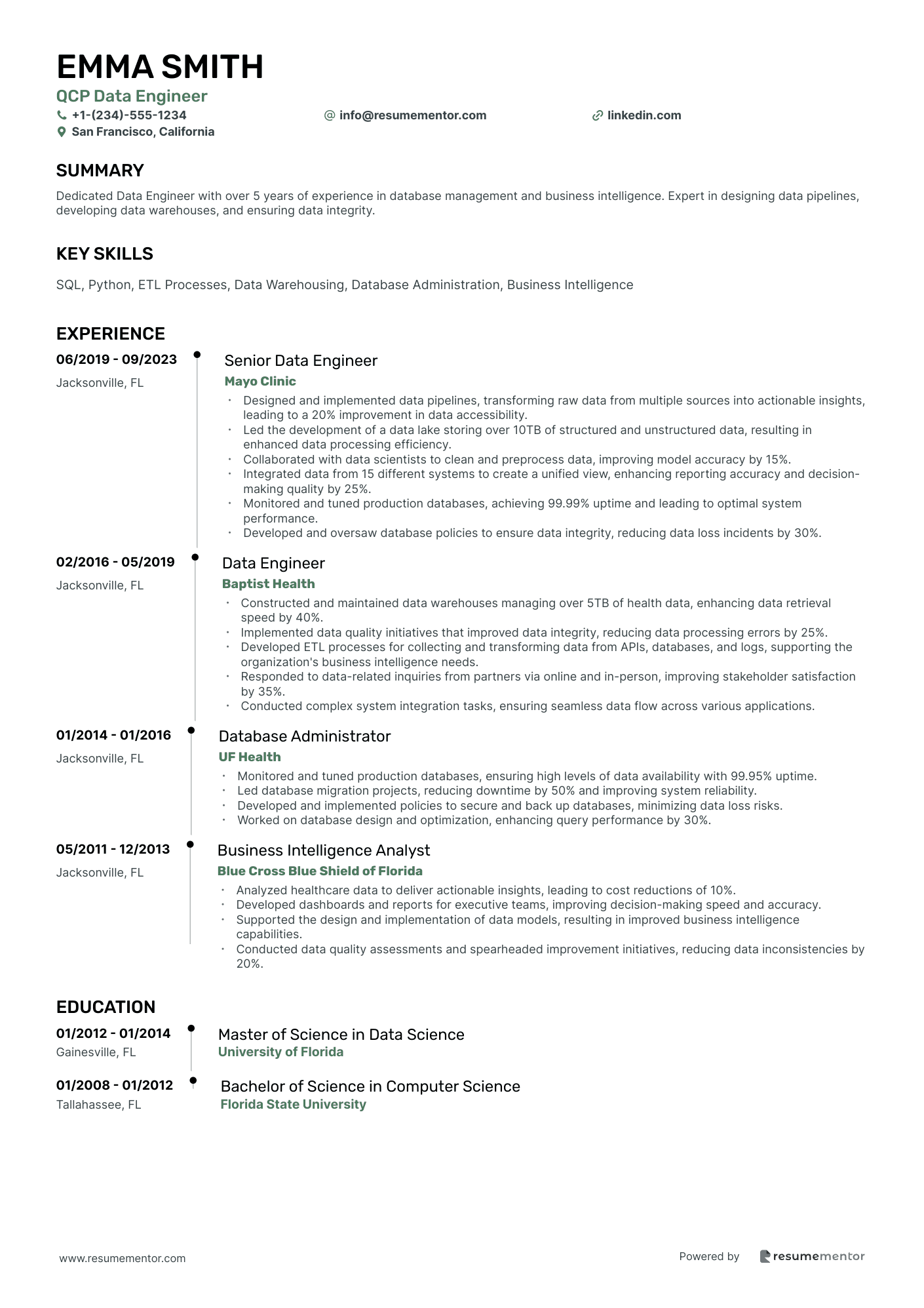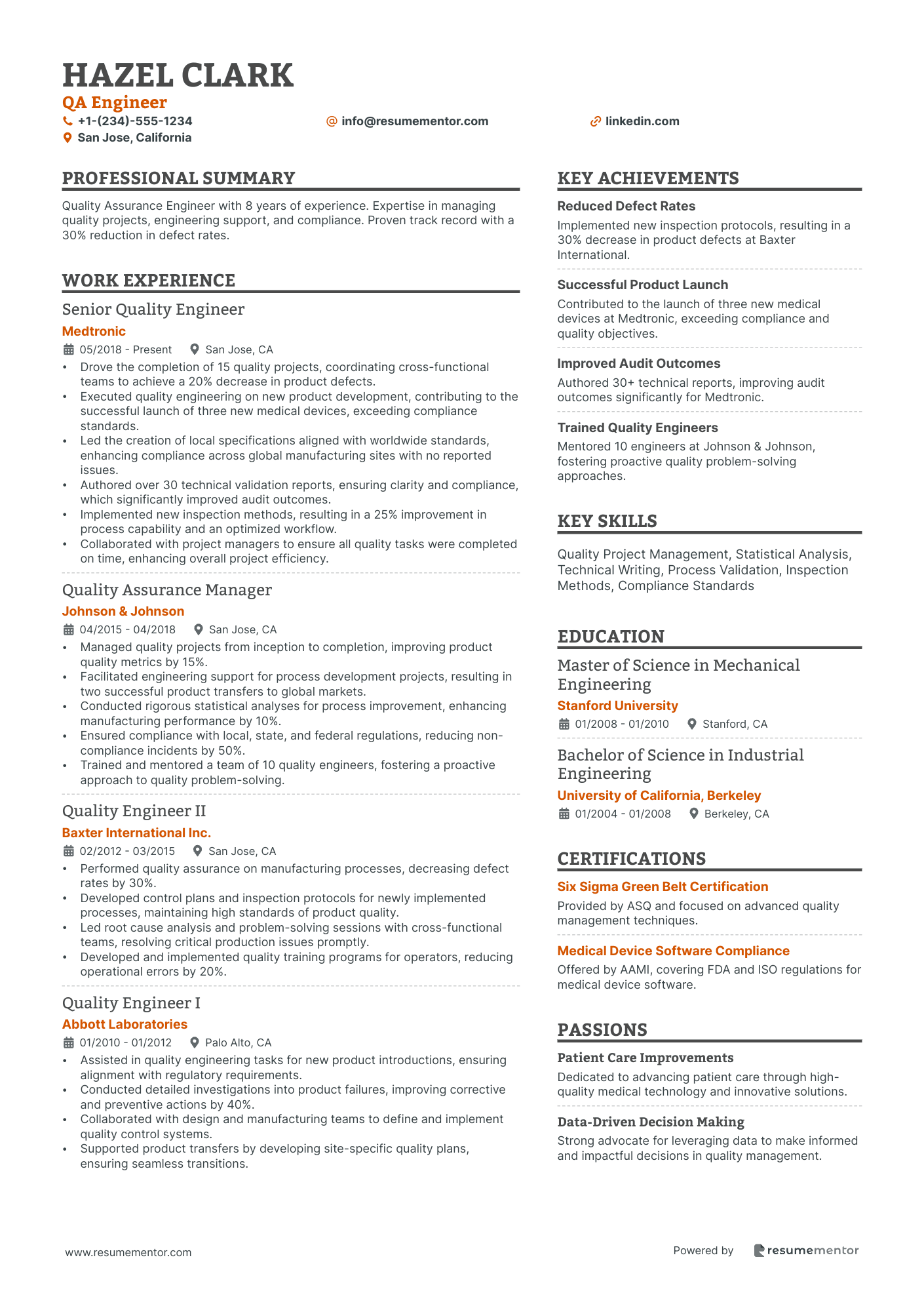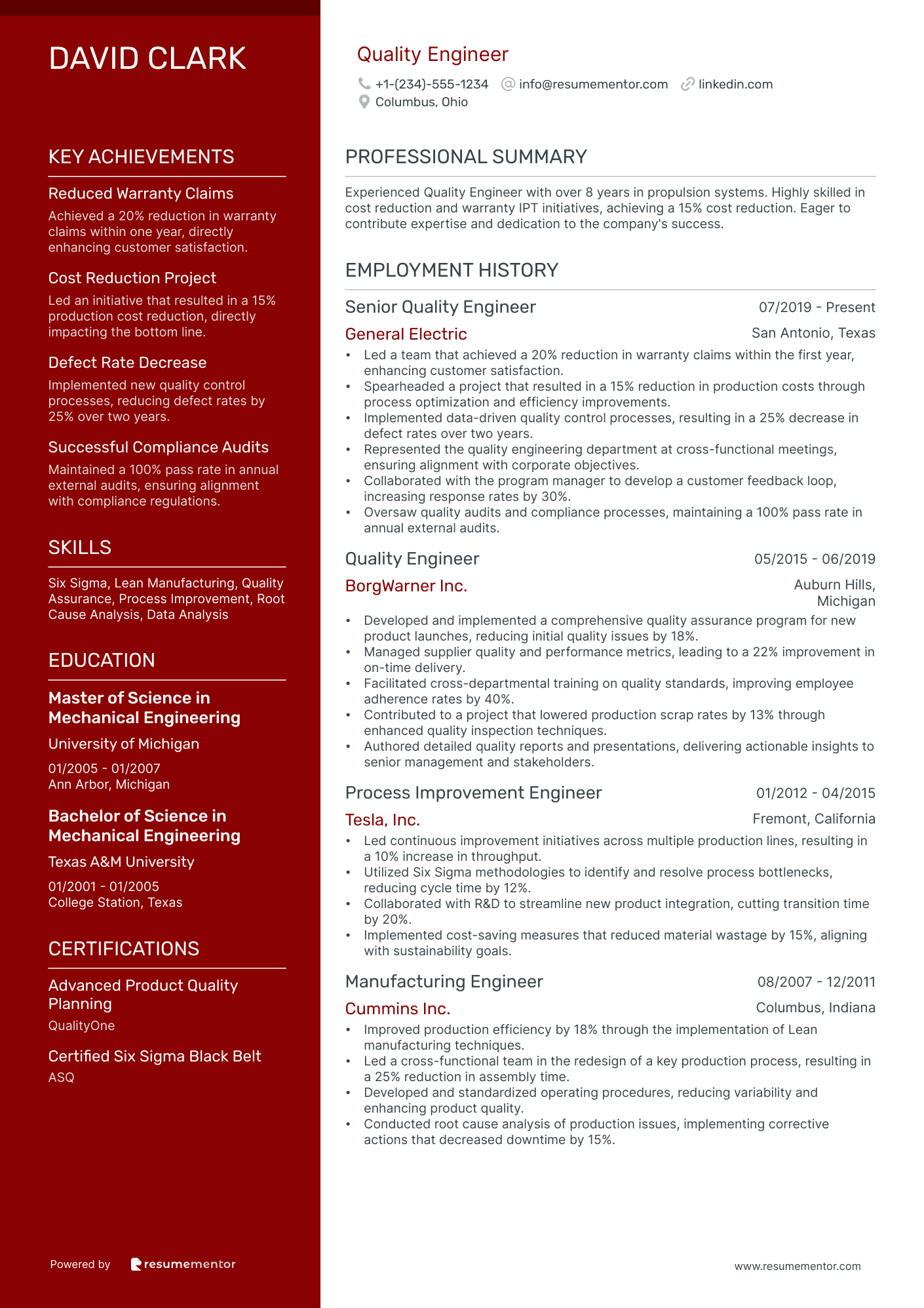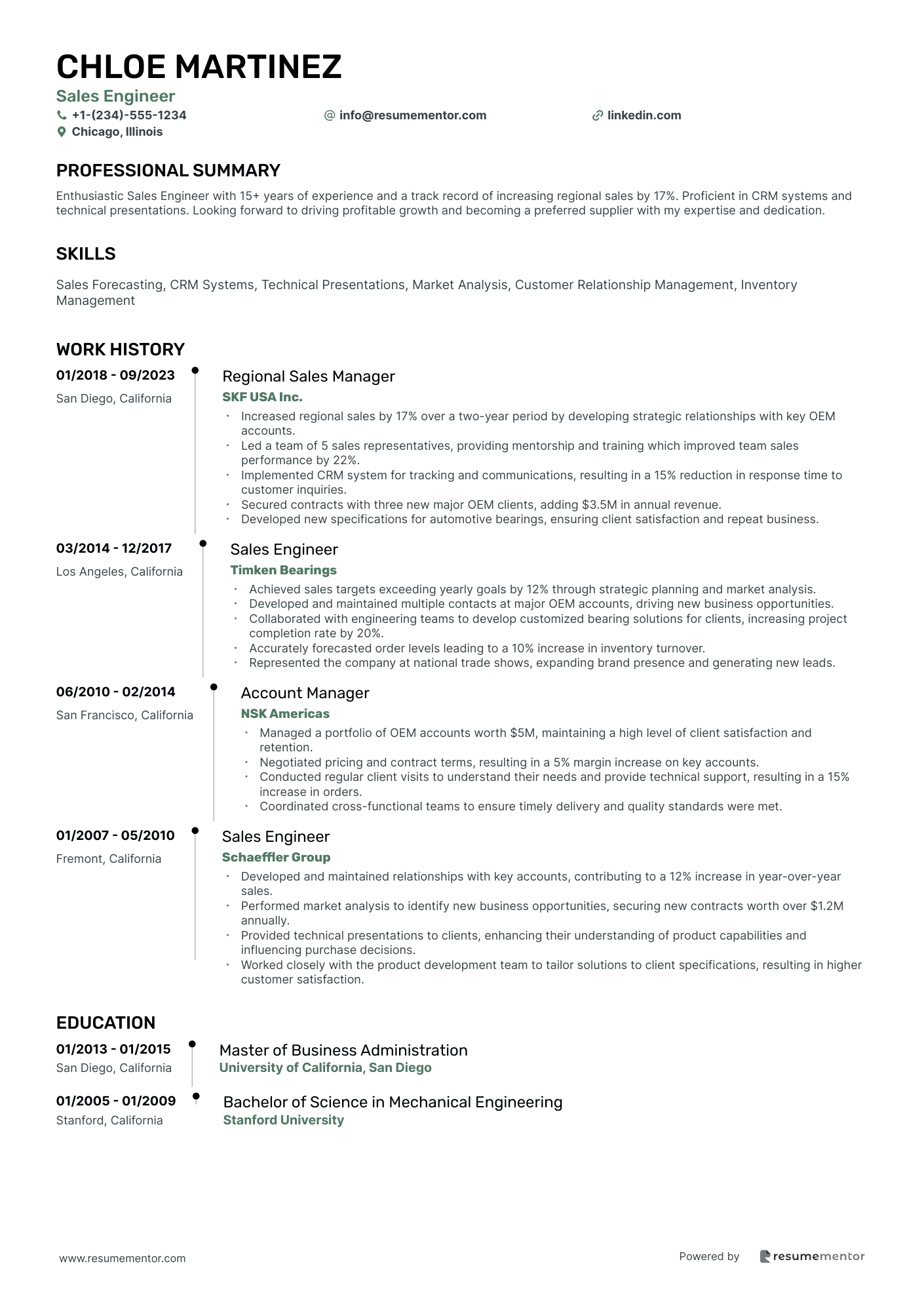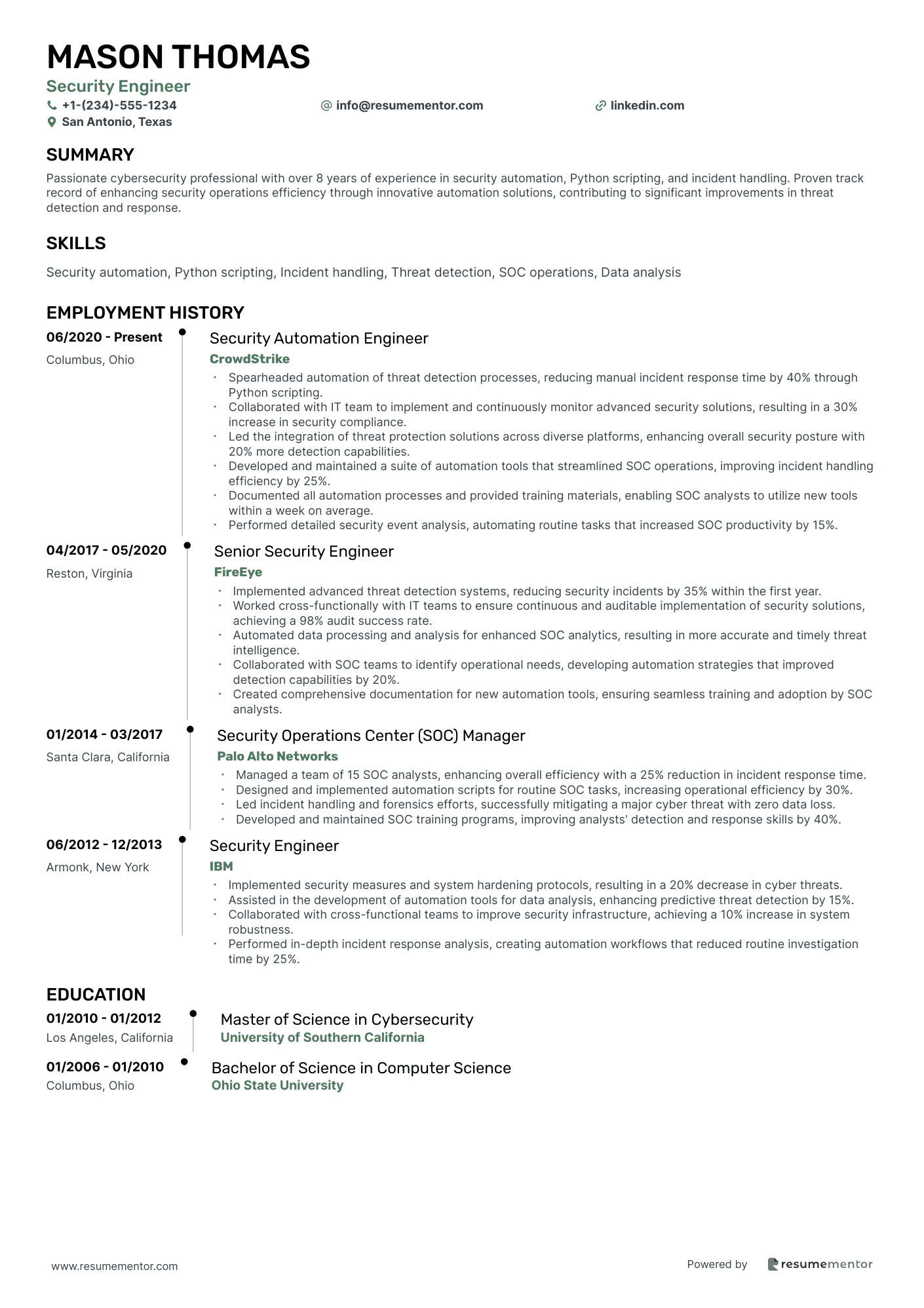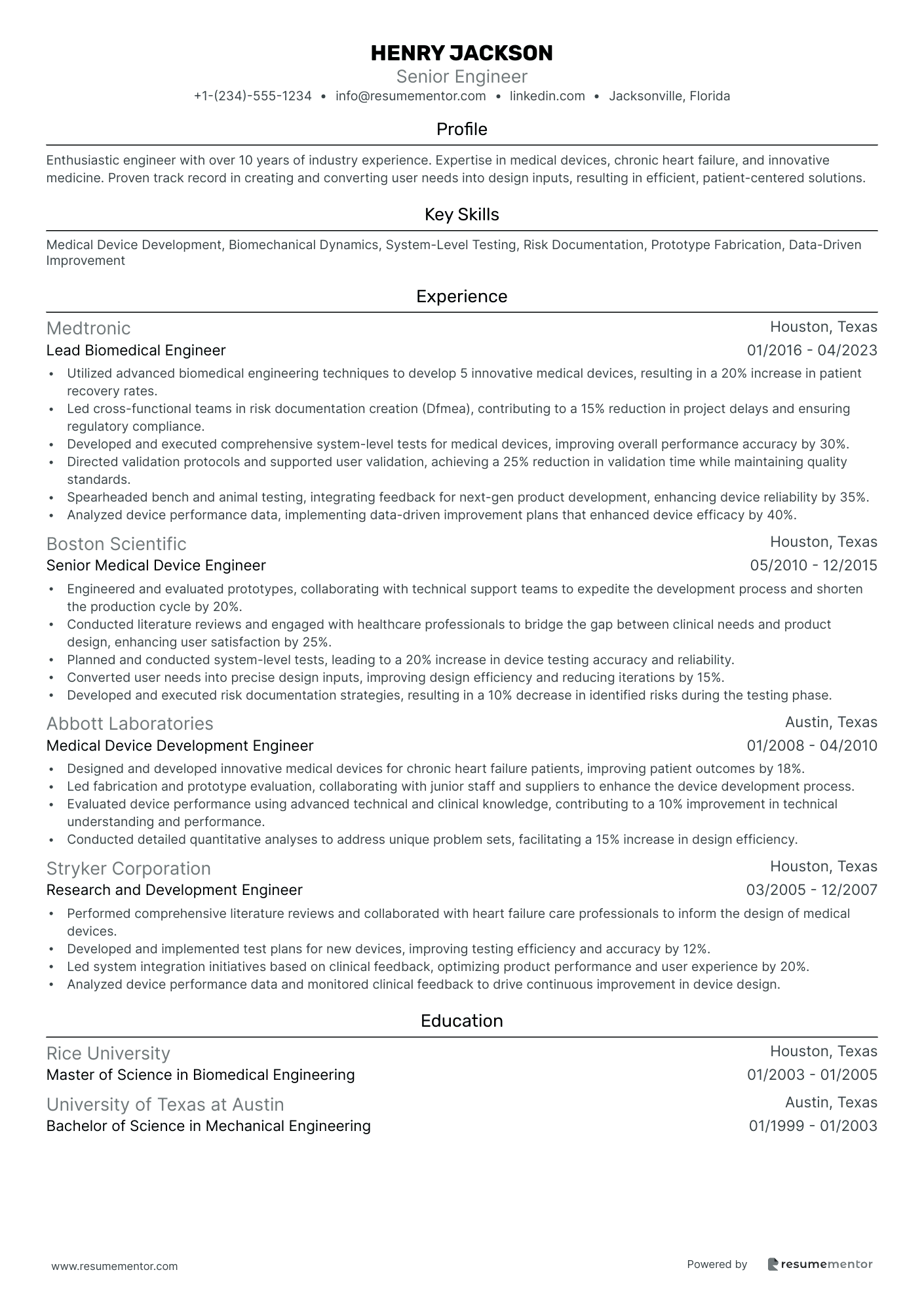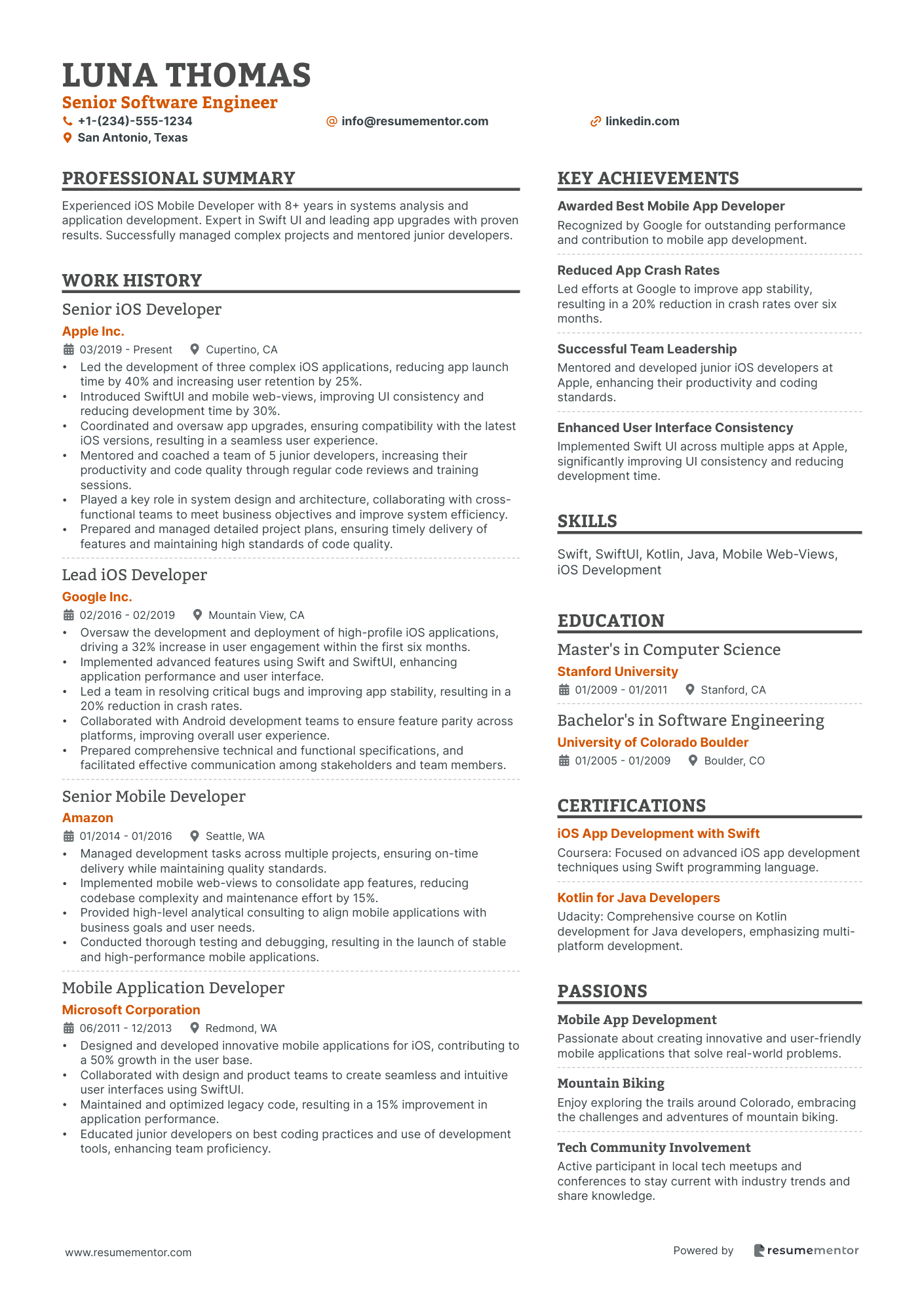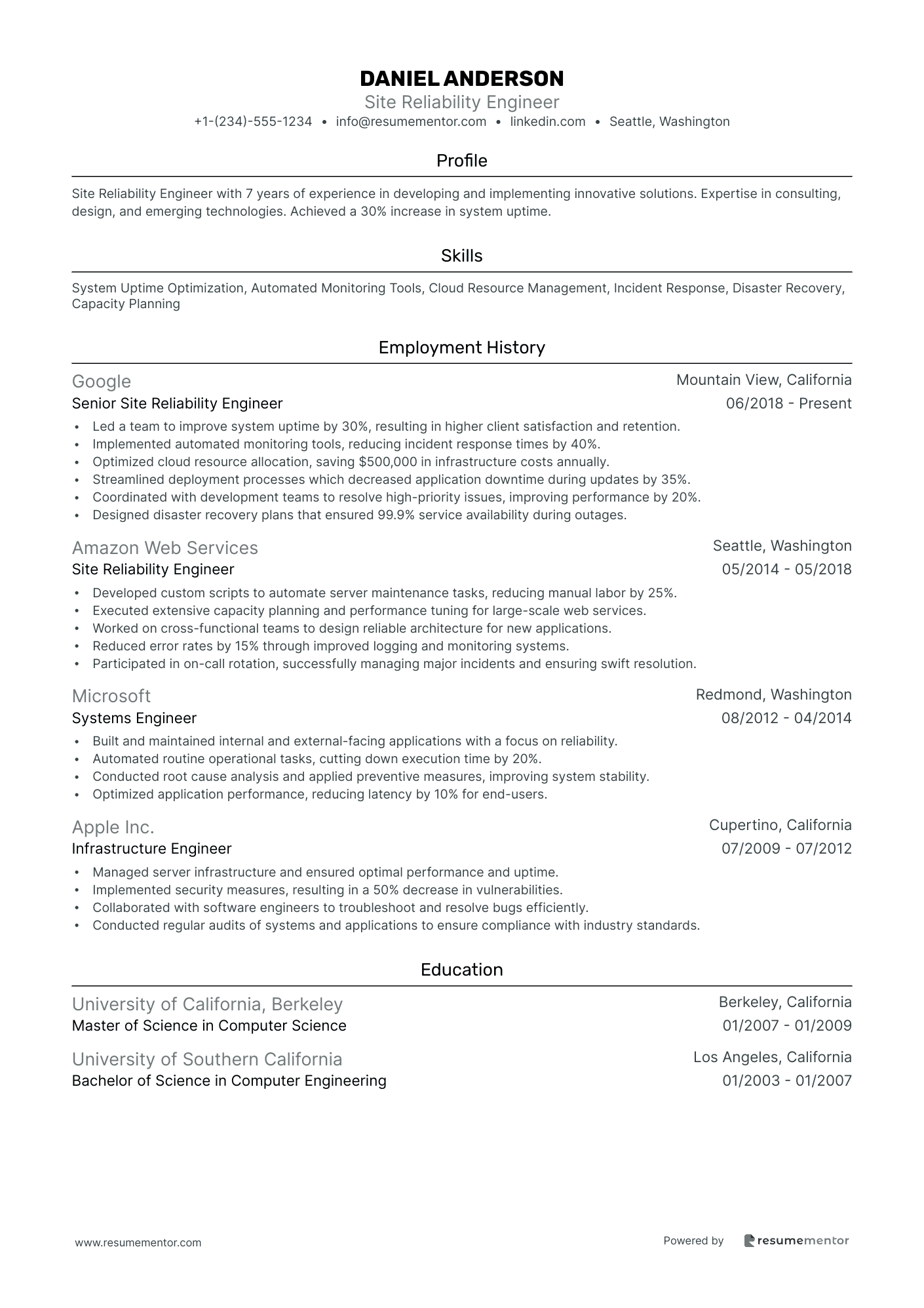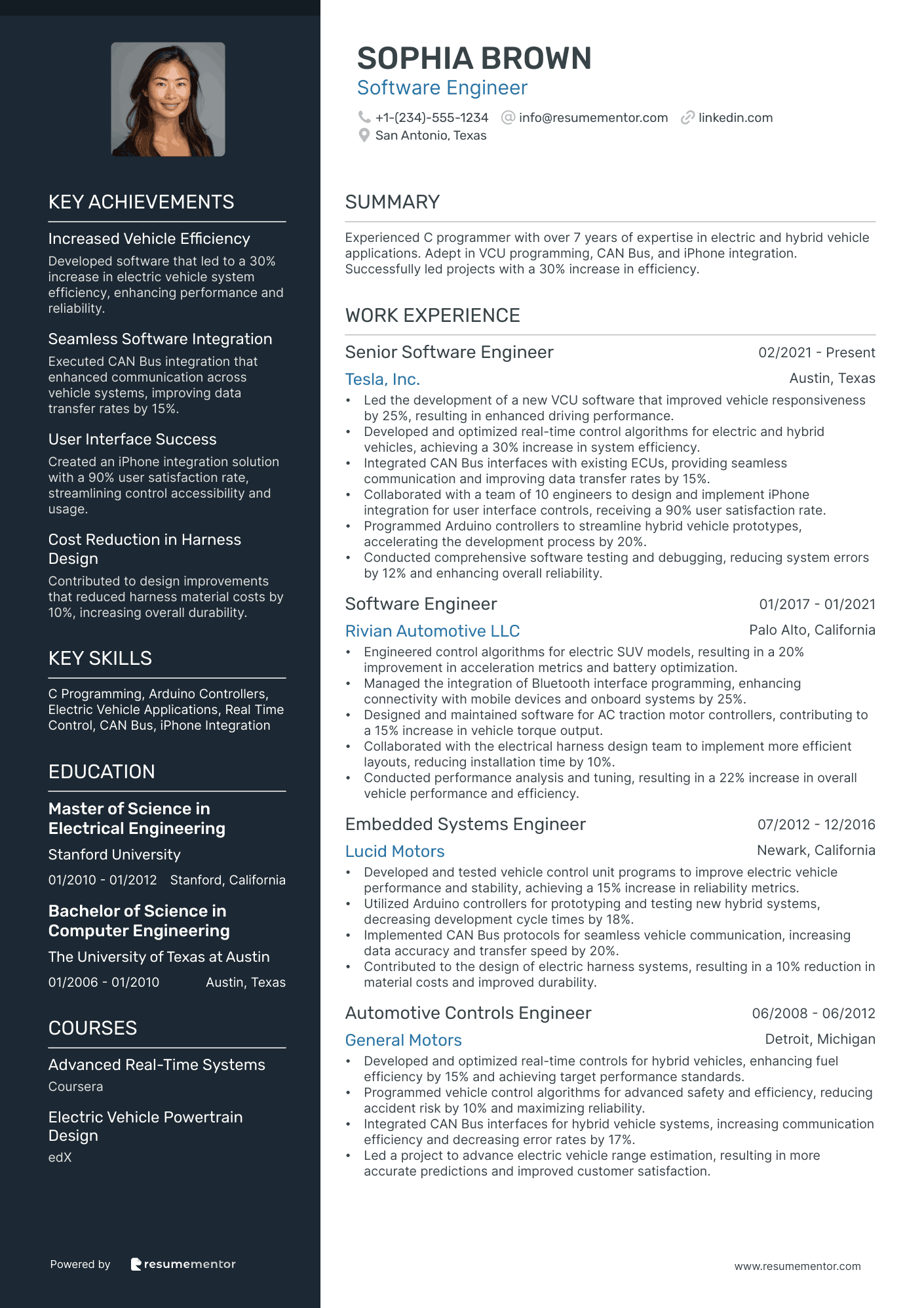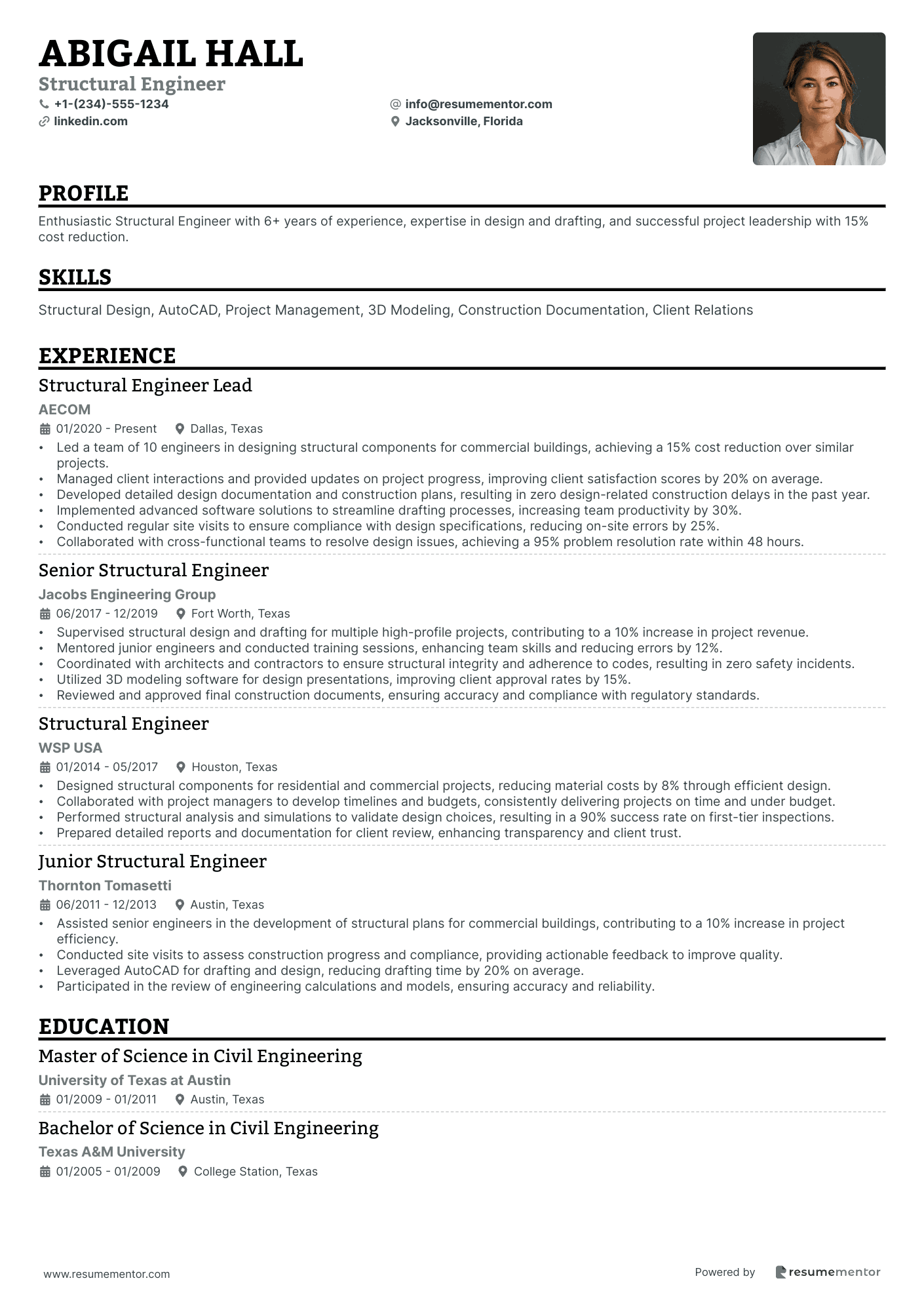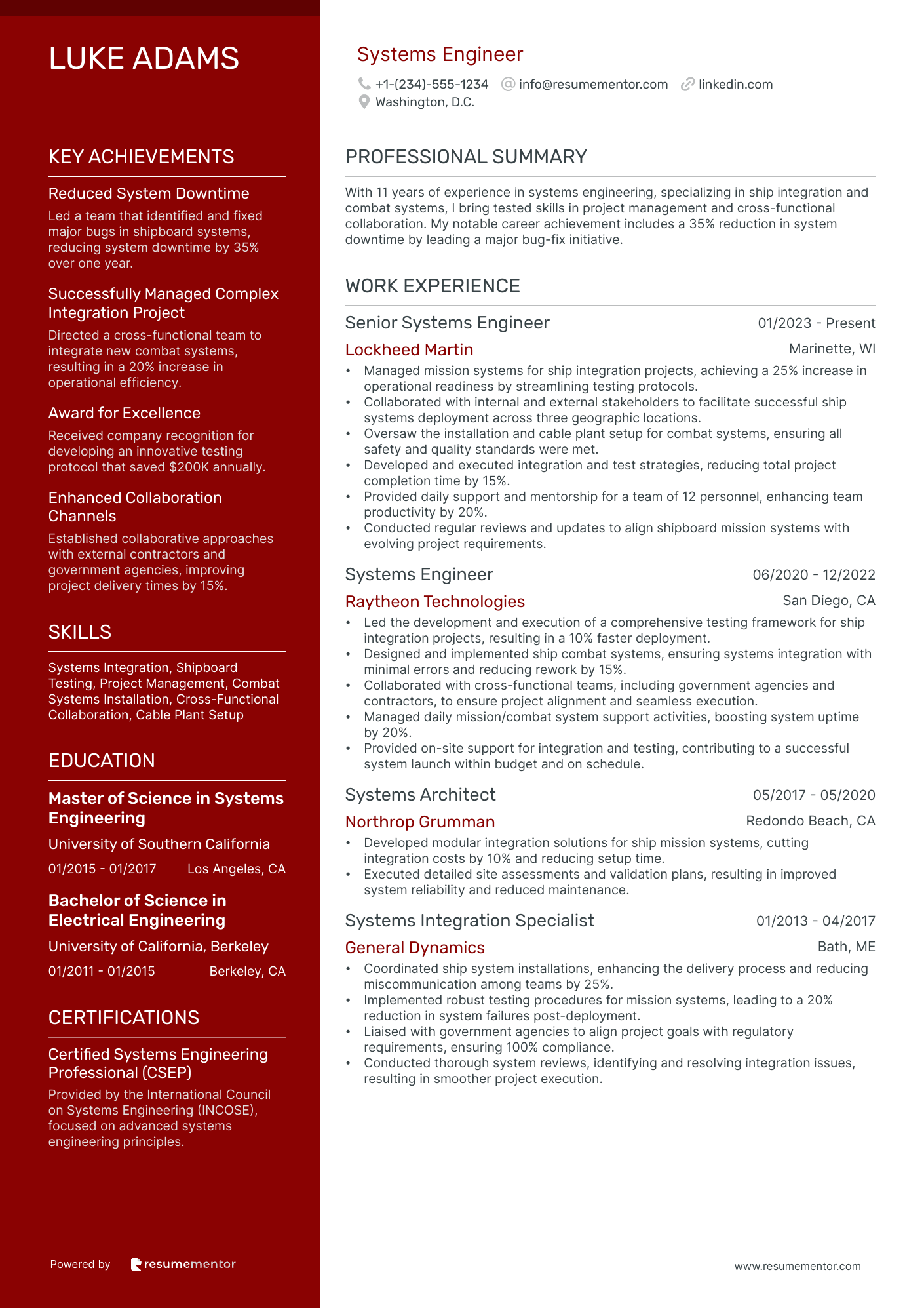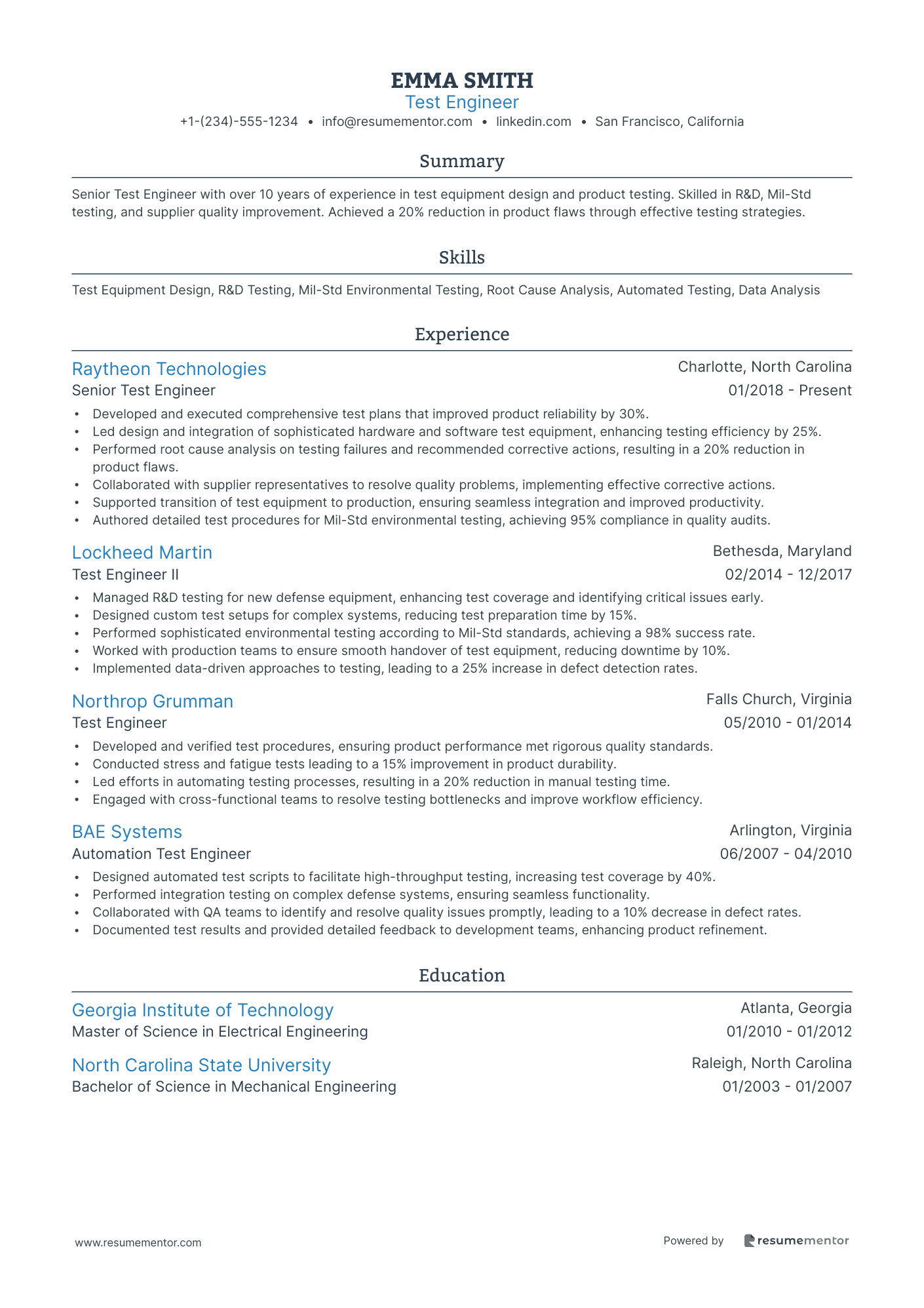47+ Engineering Resume Examples

Jul 18, 2024
|
12 min read
Building a strong foundation: Your step-by-step guide to crafting an engineering resume that stands out. Discover expert tips to engineer your career success from the ground up.
Rated by 348 people

Aerospace Engineer resume sample
- •Designed and developed electromechanical systems, improving reliability by 20% and reducing maintenance costs by 15%.
- •Wrote and optimized PLC programs for manufacturing equipment, increasing operational efficiency by 25%.
- •Configured, tested, and troubleshooted automation solutions, meeting all functional and non-functional project requirements.
- •Led a team of engineers on automation projects, consistently delivering solutions ahead of schedule and under budget.
- •Implemented safety standards and regulations, reducing workplace incidents by 10%.
- •Analyzed production challenges, developed solutions, and achieved a 30% efficiency improvement.
- •Developed PLC programming logic for various manufacturing equipment, resulting in enhanced productivity and system integration.
- •Collaborated with cross-functional teams to develop automation solutions, completing projects 15% faster than forecasted.
- •Tested and troubleshooted automated systems, achieving a 95% first-time success rate.
- •Implemented best practices and industry standards, ensuring compliance and reducing error rates by 10%.
- •Trained junior engineers on PLC programming and automation technologies, improving team competency by 20%.
- •Designed and implemented HMI systems for control and monitoring, enhancing user interface and system performance.
- •Wrote and tested PLC programs for new machinery, reducing production setup time by 25%.
- •Resolved technical issues and optimized automated processes, resulting in a 20% increase in operational efficiency.
- •Conducted risk assessments and ensured compliance with industry safety standards, reducing incident rates by 5%.
- •Participated in continuous improvement initiatives, contributing to a 15% enhancement in system productivity.
- •Developed and validated control system software, improving precision and efficiency of automated processes.
- •Integrated sensors, actuators, and communication protocols, enhancing system responsiveness and reliability.
- •Collaborated with design teams to create electromechanical systems, achieving a 10% reduction in production costs.
- •Tested and troubleshooted control systems, maintaining a 98% uptime for automated manufacturing equipment.
Audio Engineer resume sample
- •Managed and maintained all audio systems for main stage services, conferences, and special events, resulting in a 30% increase in audio quality and consistency.
- •Led the recruitment, training, and development of a team of 20+ volunteers, fostering a collaborative and efficient work environment.
- •Initiated regular equipment checkups and maintenance protocols, extending the lifespan of audio gear by 20%.
- •Coordinated with worship directors and production staff to ensure seamless integration of audio elements, reducing service disruptions by 25%.
- •Implemented new audio software and hardware updates, improving operational efficiency by 15%.
- •Oversaw the setup and operation of audio systems for weekly services and special events, contributing to a 40% increase in attendee satisfaction.
- •Trained and mentored a team of 15 volunteers, enhancing their technical skills and confidence in handling audio equipment.
- •Collaborated with pastoral staff to design and implement audio solutions that met diverse ministry needs, resulting in a more immersive worship experience.
- •Conducted regular troubleshooting and maintenance of audio equipment, reducing technical issues by 35%.
- •Facilitated the upgrade of aging audio hardware, resulting in a 25% improvement in sound quality and reliability.
- •Assisted in the setup and operation of audio systems for services and events, ensuring clear and consistent sound quality.
- •Supported the lead audio engineer in troubleshooting and resolving technical issues during live performances.
- •Participated in the training and onboarding of new volunteers, helping to grow the audio team by 50%.
- •Maintained inventory and performed routine maintenance of audio equipment, resulting in a 15% reduction in equipment downtime.
- •Executed audio setup and teardown for daily Masses and special events, ensuring optimal sound quality.
- •Assisted in the regular maintenance and upgrading of audio systems, improving reliability by 20%.
- •Worked closely with the music director to achieve desired audio effects for various liturgical services.
- •Supported audio needs for televised broadcasts, enhancing the quality and reach of services.
Automation Engineer resume sample
- •Led automation projects worth over $2 million, resulting in a 20% increase in production efficiency and a 15% reduction in operational costs.
- •Developed and implemented new PLC programs, improving system accuracy by 30% and reducing downtime by 25%.
- •Coordinated with cross-functional teams on system integration projects, ensuring alignment with company objectives and timely completion.
- •Conducted extensive testing and validation of automated systems, identifying and resolving issues to achieve a 95% first-time pass rate.
- •Mentored junior engineers and provided training on the latest automation technologies, resulting in a 40% improvement in their performance.
- •Monitored and maintained SCADA systems, ensuring reliable data acquisition and process control.
- •Supervised the installation and commissioning of automated systems in multiple plants, reducing project completion time by 20%.
- •Implemented advanced control algorithms in existing systems, improving process stability and reducing variability by 18%.
- •Managed vendor relationships and procured automation components, ensuring high-quality materials and adherence to budget constraints.
- •Developed and programmed HMI applications, enhancing user interface functionality and operator training effectiveness.
- •Performed routine maintenance and troubleshooting of automation equipment, reducing emergency downtime by 15%.
- •Designed and commissioned control systems for multiple industrial clients, optimizing production processes and achieving a 12% increase in throughput.
- •Collaborated with engineers and technicians to customize automation solutions, ensuring client satisfaction and project success.
- •Analyzed system performance data and recommended improvements, leading to a 10% reduction in cycle times.
- •Prepared detailed technical documentation and reports, facilitating regulatory compliance and knowledge transfer.
- •Developed and optimized automation processes for chemical plants, leading to a 15% increase in productivity and a 10% reduction in waste.
- •Conducted risk assessments and implemented safety protocols, enhancing process safety and reducing incidents by 5%.
- •Worked closely with operations teams to ensure seamless automation integration and operator training.
- •Utilized data analysis tools to monitor process performance and recommend actionable insights for continuous improvement.
AWS cloud resume sample
- •Spearheaded the enhancement of cyber threat defense controls, resulting in a 35% improvement in threat detection and response times.
- •Co-developed strategies for network intrusion defense in collaboration with stakeholders, leading to a 20% reduction in cyber incidents.
- •Managed operational business playbooks and ensured compliance with regulatory requirements, leading to a successful audit pass-rate of 100%.
- •Monitored and reported control adherence, providing actionable insights that improved security measures across all business lines.
- •Supported the development and deployment of advanced malware defense mechanisms, reducing malware infection rates by 15%.
- •Collaborated with cross-functional teams to simulate and replicate cyber threats, enhancing the organization's overall defense posture.
- •Led the implementation of advanced network security protocols, resulting in a 25% reduction in data breaches.
- •Conducted rigorous security assessments and developed tailored solutions that improved the network's resilience by 40%.
- •Oversaw a team of junior engineers, ensuring the delivery of high-quality security solutions and increasing team productivity by 30%.
- •Implemented automated monitoring and threat detection tools, improving response times to incidents by 50%.
- •Developed and maintained comprehensive documentation for network security procedures, enhancing knowledge transfer within the team.
- •Analyzed and responded to cyber threats, mitigating potential risks and securing sensitive customer data.
- •Developed and executed regular security audits, ensuring compliance with industry regulations and internal policies.
- •Collaborated with IT teams to establish secure systems, reducing security vulnerabilities by 20%.
- •Trained and mentored team members on best practices for threat identification and response.
- •Implemented and managed security measures to protect IT systems, resulting in a 15% reduction in security breaches.
- •Conducted regular vulnerability assessments and penetration testing to identify and remediate potential threats.
- •Developed and enforced security policies and procedures, increasing overall security compliance by 25%.
- •Collaborated with other departments to ensure comprehensive protection of data and IT resources.
AWS data engineer resume sample
- •Led a data migration project to AWS, reducing system downtime by 30%, and enhancing data retrieval speeds by 20%.
- •Coordinated a team of 8 data engineers to implement real-time data processing pipelines, resulting in a 50% increase in data processing efficiency.
- •Designed and developed ETL processes, improving data accuracy by 35% and ensuring seamless data integration across multiple platforms.
- •Implemented automated data quality checks, reducing data errors by 25%, and improving overall data reliability.
- •Created data visualization dashboards, enabling management to make data-driven decisions, which contributed to a 15% growth in quarterly revenue.
- •Managed cloud infrastructure and data security protocols, ensuring compliance with industry standards and reducing operating costs by 20%.
- •Developed a data analytics platform that supported predictive maintenance, reducing vehicle downtime by 40%.
- •Initiated the transition to a cloud-based data warehouse, resulting in a 30% decrease in data storage costs.
- •Optimized data flow processes which increased data reporting speed by 25%, greatly enhancing operational efficiency.
- •Collaborated with data scientists to implement machine learning models, improving customer segmentation accuracy by 45%.
- •Mentored junior data engineers, providing training sessions that improved team productivity by 35%.
- •Spearheaded the creation of KPI dashboards, resulting in a 20% improvement in decision-making efficiency at the executive level.
- •Developed SQL queries and scripts to automate reporting processes, saving 15 hours per week in manual labor.
- •Conducted data mining and analysis projects, leading to a 10% increase in customer retention through targeted marketing campaigns.
- •Collaborated with IT to integrate new data sources, enriching the company’s data assets by 25%.
- •Assisted in the creation of data reports, leading to a 15% improvement in operational efficiency.
- •Performed data cleaning and preprocessing, improving data quality by 20%.
- •Supported the BI team in developing dashboards that visualized key performance metrics, aiding in strategic decision-making.
- •Analyzed sales and financial data, resulting in insights that enhanced revenue forecasting accuracy by 10%.
Azure Data Engineer resume sample
- •Optimized ETL processes using Python, leading to a 25% increase in data processing efficiency and reduced operational costs.
- •Led a team of 5 data engineers in the design and deployment of a cloud-based data lake, supporting over 100TB of data.
- •Implemented a machine learning model that increased the accuracy of risk predictions by 15%, resulting in better decision-making for underwriting.
- •Conducted data quality assessments and improved data governance practices, reducing data inconsistencies by 20%.
- •Developed data pipelines using Azure Data Factory and Databricks, accelerating data ingestion by 30%.
- •Designed and implemented a real-time analytics platform that supported dynamic risk assessment for clients.
- •Collaborated with data scientists to integrate AI models into business processes, enhancing predictive analytics capabilities.
- •Streamlined database operations through advanced indexing and query optimization techniques, cutting query time by 40%.
- •Mentored junior engineers and conducted training sessions, boosting team productivity by 15%
- •Built robust big data solutions on Hadoop and Spark platforms, facilitating improved data processing for actuarial analysis.
- •Created custom data storage solutions, resulting in a 50% reduction in storage costs.
- •Developed a data security protocol in collaboration with IT, minimizing data breaches and improving compliance.
- •Integrated disparate data sources into a unified data warehouse, improving data accessibility across departments.
- •Analyzed large datasets to extract actionable insights, supporting strategic business decisions.
- •Developed automated reporting tools using Python, which reduced report generation time by 60%.
- •Collaborated with cross-functional teams to identify data needs and deliver comprehensive dashboards.
- •Improved data accuracy by 20% by developing rigorous data validation processes.
Big Data Engineer resume sample
- •Led the development and implementation of real-time data analytics solutions, reducing data processing time by 50%.
- •Managed a team of 5 data engineers, fostering collaboration that resulted in the successful launch of 4 major projects.
- •Designed and executed an ETL process that improved data accuracy and consistency, enhancing decision-making capabilities.
- •Conducted in-depth data analysis to identify trends and patterns, providing actionable insights that drove a 15% increase in revenue.
- •Implemented machine learning algorithms to automate data categorization, saving 200 hours of manual work annually.
- •Collaborated with cross-functional teams to integrate data solutions, ensuring a streamlined workflow and improved data governance.
- •Architected and maintained big data infrastructure to support large-scale data analysis, increasing query performance by 60%.
- •Developed and optimized data pipelines using Hadoop and Spark, reducing processing times by 25%.
- •Partnered with analytics teams to design data models that supported predictive analytics, driving a 12% increase in sales.
- •Implemented data security protocols, ensuring compliance with industry standards and reducing data breaches by 40%.
- •Provided technical guidance and training to junior engineers, enhancing team skill sets and productivity.
- •Developed data integration processes, consolidating data from multiple sources and improving data reliability by 30%.
- •Designed and built data warehouses, enabling efficient storage and retrieval of large datasets for complex queries.
- •Conducted performance tuning of SQL queries, achieving a 20% reduction in database load times.
- •Collaborated with business stakeholders to understand requirements and deliver solutions that aligned with business goals.
- •Conducted regular data quality assessments, identifying and resolving issues that improved data integrity by 15%.
- •Managed database systems, ensuring high availability and reliability for critical business applications.
- •Performed regular database maintenance, including backups, indexing, and performance optimization.
- •Monitored database performance and resolved issues proactively, reducing downtime by 18%.
- •Developed and implemented data migration strategies, ensuring smooth transitions with minimal disruption.
Biomedical Engineer resume sample
- •Led the development of signal processing algorithms used in cardiac monitoring devices, achieving a 20% increase in diagnostic accuracy.
- •Directed cross-functional teams through stage-gate processes, successfully launching 5 new products over 4 years.
- •Collaborated with clinical operations to identify top clinical needs, reducing time from R&D to market by 8 months.
- •Managed partnerships with academic institutions to foster innovation, resulting in the integration of 3 new technologies into product line.
- •Created robust, real-time algorithms for interpreting physiological signals, improving data processing speed by 30%.
- •Designed and implemented significant improvements to signal processing algorithms, enhancing device accuracy by 25%.
- •Led a team of 10 engineers in the development of innovative cardiac devices, adhering to predefined milestones and timelines.
- •Executed technical problem-solving for cardiac state fundamentals, setting clear program requirements that reduced kickoff time by 15%.
- •Engaged with regulatory affairs to ensure compliance, leading to an expedited approval process for 3 new devices.
- •Interfaced effectively with hardware/software engineering teams to deliver integrated solutions, decreasing production time by 12%.
- •Drove the development of real-time signal processing algorithms, reducing data interpretation errors by 18%.
- •Oversaw external collaborations with industry partners, bringing in cutting-edge technologies that boosted project innovation.
- •Developed and prioritized technical pathways, leading to the successful execution of 4 projects with clear milestones.
- •Enhanced product management processes, aligning team efforts to clinical needs, resulting in improved product-market fit.
- •Implemented advanced signal processing algorithms for cardiac imaging devices, increasing detection resolution by 22%.
- •Collaborated with quality assurance teams to ensure product reliability, leading to a 15% reduction in error rates.
- •Conducted in-depth technical analysis for cardiac diseases, setting clear benchmarks for R&D objectives.
- •Managed clinical needs analysis, refining product specifications that lowered development costs by 10%.
Chemical Engineer resume sample
- •Led a team of 5 engineers to develop and launch a new chemical system product line, boosting revenue by 20%.
- •Conducted detailed degradation mechanism analysis for various chemical systems, resulting in a 15% increase in component lifecycle.
- •Employed advanced simulation models using MATLAB to predict system performance, reducing testing time by 30%.
- •Collaborated with R&D, production, and marketing teams to bring innovative projects to market, leading to $3M in new sales annually.
- •Managed the implementation of new analytical tools such as XRD and SEM/EDS, enhancing the accuracy of material characterization by 25%.
- •Designed and conducted 10+ experiments on chemical system performance, improving process efficiency by 18%.
- •Diagnosed key degradation mechanisms of new battery technologies, extending service life by 10%.
- •Developed and validated simulation models in AVL BOOST, resulting in more accurate system predictions by 22%.
- •Enhanced data collection processes using advanced tools like BET and potentiostat, leading to better decision-making.
- •Reduced operational costs by 12% through precise chemical system analysis and optimization.
- •Conducted comprehensive studies on aging and performance of catalytic systems, leading to improved product reliability by 15%.
- •Utilized flow reactors and battery calorimeters to analyze chemical reactions, enhancing system diagnostics.
- •Collaborated with cross-functional engineering teams to drive innovation and accelerate time to market by 10%.
- •Authored and published 5 research papers on chemical systems in leading scientific journals, increasing company’s academic footprint.
- •Supported senior researchers with experiment design and data analysis, contributing to process improvements.
- •Analyzed system-level performance data using MATLAB, improving model accuracy by 20%.
- •Participated in troubleshooting and problem resolution for sub-systems, reducing downtime by 10%.
- •Assisted in the development of new chemical sensor technologies, playing a key role in product advancement.
Civil Engineer resume sample
- •Supervised site development projects for public agencies, enhancing project timelines by 15%.
- •Implemented AutoCAD Civil 3D solutions, improving design accuracy and project efficiency by 20%.
- •Collaborated with contractors and architects to streamline project management, resulting in 10% cost savings.
- •Conducted technical evaluations and inspections, ensuring compliance with local and federal regulations.
- •Led a team of junior engineers in creating sustainable site plans, contributing to community development.
- •Managed project documentation and reports, achieving a 98% accuracy rate in project deliverables.
- •Managed and executed site development projects, maintaining a 95% client satisfaction rate.
- •Utilized AutoCAD Civil 3D to design infrastructure projects, improving project completion time by 12%.
- •Conducted cost estimations and resource planning, reducing project costs by 8%.
- •Collaborated with multidisciplinary teams to integrate innovative engineering solutions into projects.
- •Facilitated project meetings and communication, enhancing cross-team collaboration and project success.
- •Designed and planned urban infrastructure projects, contributing to 10% increase in project efficiency.
- •Assisted senior engineers in site assessments and data collection, ensuring project accuracy.
- •Developed comprehensive project plans using AutoCAD Civil 3D, leading to successful project completion.
- •Worked with public agencies to ensure compliance with environmental and safety regulations.
- •Supported senior engineers in project design and development, enhancing project deliverables by 10%.
- •Conducted field surveys and data analysis, improving project accuracy and planning.
- •Collaborated with multidisciplinary teams to improve communication and project integration.
- •Developed technical drawings and documentation using AutoCAD Civil 3D, contributing to efficient project management.
Cloud Engineer resume sample
- •Architected and developed cloud hosting platforms, improving application deployment time by 40%.
- •Led a team of engineers in implementing continuous delivery pipelines, reducing deployment failures by 35%.
- •Built and maintained self-service tools enabling developers to seamlessly deploy applications, resulting in a 30% increase in productivity.
- •Evaluated and integrated new software tools to enhance platform functionalities and performance for over 20 projects.
- •Coached cross-functional teams on best practices for paired programming and test-driven development.
- •Enhanced operational efficiency through innovative solutions, contributing to a 20% reduction in operational costs.
- •Designed and implemented cloud-native architectures that supported scalable and secure enterprise applications.
- •Collaborated with product engineering teams to ensure seamless service integrations, boosting service compatibility by 25%.
- •Developed automation scripts, leading to a 50% reduction in manual deployment efforts across multiple projects.
- •Evaluated and adopted new cloud technologies, enabling the successful migration of legacy systems for 15 clients.
- •Mentored junior engineers, establishing best practices for engineering craftsmanship and continuous integration.
- •Architected and administered cloud infrastructure, reducing downtime by 40% through robust DR solutions.
- •Implemented and managed cloud security protocols, enhancing compliance with industry standards and reducing risks by 20%.
- •Built and deployed automation frameworks, cutting infrastructure setup time by 35%.
- •Collaborated with developers to streamline the cloud development lifecycle, reducing time-to-market for new features by 25%.
- •Designed and managed enterprise-level infrastructure supporting cloud-hosted services with zero major outages.
- •Implemented best practices for system monitoring and performance tuning, resulting in a 30% improvement in system efficiency.
- •Developed scripts for automating routine tasks, leading to a 40% reduction in operational workload.
- •Supported and maintained diverse cloud environments, ensuring high availability and reliability for over 10,000 users.
Computer Engineer resume sample
- •Led a team of 10 engineers in the development of a new C2 platform, improving operational efficiency by 25%.
- •Authored over 50 technical documents, ensuring compliance with Department of Defense standards and reducing error rates by 15%.
- •Implemented an advanced ISR platform, which increased data collection accuracy by 20% for intelligence operations.
- •Streamlined software development processes, reducing delivery time by 30% through the introduction of automated testing and continuous integration.
- •Managed system upgrades and maintenance, ensuring 99.9% uptime and contributing to a significant reduction in operational disruptions.
- •Conducted security audits and contributed to the system's accreditation, resulting in successful achievement of all compliance criteria.
- •Oversaw the design and implementation of a major ISR system upgrade, enhancing performance reliability by 35%.
- •Led the development of technical documentation for a new surveillance system, leading to smooth system integration and user adoption.
- •Collaborated with cross-functional teams to develop protocols and guidelines, standardizing operational procedures and improving efficiency by 20%.
- •Performed regular system analyses and troubleshooting, resulting in a 40% reduction in technical issues reported by end-users.
- •Mentored junior engineers, providing training and development opportunities that boosted team productivity by 15%.
- •Led the integration of new ISR systems across multiple platforms, reducing installation time by 20% and ensuring seamless transitions.
- •Authored comprehensive maintenance guidelines, decreasing system downtime by 18% through effective preventive measures.
- •Collaborated with the software development team to update and enhance C2 systems, resulting in improved user experience and functionality.
- •Conducted extensive testing and validation of new software releases, minimizing post-deployment issues and supporting system robustness.
- •Participated in the development of C2 systems for defense clients, ensuring adherence to stringent security protocols and operational requirements.
- •Developed technical manuals and documentation, aiding users in effective system operation and maintenance.
- •Led troubleshooting efforts for complex technical issues, achieving a 90% resolution rate within the first 24 hours.
- •Collaborated with clients to gather requirements and provide customized solutions, enhancing overall customer satisfaction by 22%.
Construction Project Engineer resume sample
- •Led the engineering team for a $45M concrete structure project, ensuring timely completion and high-quality standards.
- •Implemented advanced scheduling techniques, reducing project delays by 15%, resulting in significant cost savings.
- •Supervised a team of QA/QC inspectors, achieving a 98% compliance rate with industry standards.
- •Directed cost control measures that kept project expenses 10% under budget without compromising quality.
- •Assumed responsibility for document control, ensuring accurate records and efficient project operations.
- •Collaborated with project managers to streamline project administration, enhancing productivity by 20%.
- •Managed all engineering aspects for a $30M urban infrastructure project, successfully completing work ahead of schedule.
- •Developed and maintained complex project schedules, increasing overall project efficiency by 20%.
- •Conducted thorough QA/QC inspections, resulting in a 95% first-time pass rate on all inspections.
- •Coordinated with subcontractors and suppliers, ensuring timely delivery of materials and services.
- •Implemented cost-saving measures that reduced project costs by 12%, positively impacting the company's bottom line.
- •Assisted in managing a $25M commercial building project, with a primary role in project scheduling and coordination.
- •Supported QA/QC processes, contributing to an 87% reduction in rework due to defects.
- •Monitored and reported on project costs, keeping budget variances within 5% of projections.
- •Facilitated effective communication among project stakeholders, ensuring smooth workflow and timely completion.
- •Coordinated all administrative tasks for a $20M infrastructure project, resulting in project completion 10% under budget.
- •Maintained comprehensive project documentation, improving accuracy and responsiveness.
- •Assisted with scheduling and planning, leading to a 15% increase in project management efficiency.
- •Worked closely with the cost controller to monitor expenses, ensuring project financial health.
Controls Engineer resume sample
- •Led a team to design and implement control panels utilizing PLC hardware, pneumatics, and VFDs, resulting in a 20% decrease in operational costs.
- •Developed and maintained PLC programs for high-speed production lines, enhancing productivity by 15%.
- •Created HMI/SCADA applications using Wonderware and Ignition software, significantly improving user interface and process monitoring.
- •Executed on-site troubleshooting and system start-up, ensuring successful project delivery and client satisfaction.
- •Conducted detailed system tests including I/O checks, achieving a first-time pass rate of 95%.
- •Collaborated with clients to assess needs, produce proposals, and provide updates, resulting in a 30% increase in repeat business.
- •Designed and programmed control systems for motion control and safety systems, contributing to a 25% reduction in system downtime.
- •Led the configuration and specification of instrumentation for various projects, ensuring compliance with industry standards.
- •Implemented process control schemes for batching systems, increasing production efficiency by 18%.
- •Developed and tested control system components, such as PLC programs and HMI applications, ensuring 100% system reliability.
- •Assisted in the preparation of cost estimations and project proposals, contributing to a $2M increase in project wins.
- •Programmed and maintained PLC systems for manufacturing automation, reducing manual errors by 30%.
- •Collaborated with the engineering team to understand manufacturing processes and develop control schemes.
- •Specified and configured vision systems for quality control, enhancing inspection accuracy by 20%.
- •Provided on-site support for system startups, significantly improving client satisfaction by reducing setup times by 15%.
- •Designed control panels with PLC hardware and motor starters, enhancing system integration and performance.
- •Programmed HMI/SCADA systems using IFix, resulting in improved real-time data visualization for operators.
- •Conducted thorough testing of control system components, ensuring compliance with project requirements.
- •Developed functional specifications for process control systems, significantly reducing system errors and downtime.
Cyber Security resume sample
- •Led a team of 5 educators in developing and delivering a comprehensive cybersecurity curriculum to over 200 students, resulting in a 30% improvement in understanding of core concepts.
- •Facilitated hands-on workshops on coding and engineering, engaging students and increasing class participation by 40% over two years.
- •Developed and launched a student mentorship program that paired industry professionals with students, enhancing real-world experience and guidance for over 50 participants.
- •Organized and coordinated educational field trips, enabling students to interact with cybersecurity experts and see real-world applications of their studies.
- •Monitored and assessed student progress closely, customizing teaching techniques to cater to individual learning styles and needs, resulting in a 25% rise in student performance.
- •Collaborated with local schools and organizations to promote STEM education and secure additional funding, increasing program reach by 15%.
- •Coordinated a STEM summer camp for middle school students, integrating engineering and cybersecurity activities, which attracted over 150 participants annually.
- •Designed engaging, hands-on activities that improved student retention and understanding of STEM topics, resulting in a 35% increase in repeat attendance.
- •Managed the program’s logistics, including scheduling, resource allocation, and liaison with guest speakers, ensuring seamless execution and high-quality learning experiences.
- •Developed a comprehensive assessment tool for measuring student progress and program effectiveness, which was adopted by multiple departments.
- •Trained and supervised a team of 10 teaching assistants, enhancing their instructional skills and fostering a collaborative teaching environment.
- •Taught a diverse curriculum focusing on biology, chemistry, and introductory cybersecurity to over 120 students annually.
- •Implemented a project-based learning approach that increased student engagement and comprehension by 20% in one academic year.
- •Spearheaded the creation of a science club, facilitating after-school activities that deepened students’ interest in STEM fields, resulting in consistent membership growth.
- •Established partnerships with local universities to provide students with access to advanced laboratory facilities and resources.
- •Designed and led educational summer programs for middle school students, focusing on interactive and inquiry-based learning.
- •Engaged students in experiments and projects that cultivated a deeper understanding of scientific principles, leading to a 90% satisfaction rate among participants.
- •Collaborated with other instructors to develop integrated learning experiences across various scientific domains.
- •Provided individualized support and mentorship, helping students to overcome learning challenges and achieve their personal best.
Data Engineer resume sample
- •Built and maintained ETL pipelines, resulting in a 30% improvement in data processing speed, enhancing the quality and timeliness of data insights for cross-functional teams.
- •Designed and implemented robust data testing frameworks leading to a 25% reduction in data errors, driving more accurate decision-making processes.
- •Managed and optimized databases, reducing data warehouse costs by 20% while maintaining peak performance during high-volume data loads.
- •Developed and supported dashboards and analytics reports, increasing operational efficiency and stakeholder satisfaction by 40%.
- •Participated in code reviews, improving code quality and ensuring adherence to best practices, resulting in more maintainable and scalable data solutions.
- •Collaborated with various departments to provide customized data solutions, significantly enhancing internal operations and external partnerships.
- •Developed and maintained data models and ETL processes, optimizing data processing times by 35% and supporting the company's data-driven strategies.
- •Created interactive Tableau dashboards, improving data accessibility and user experience for over 50 internal users.
- •Executed rigorous data testing and validation protocols, reducing report discrepancies by 20% and ensuring data reliability.
- •Collaborated with the data science team to integrate machine learning models into data pipelines, enhancing predictive analytics capabilities.
- •Monitored and fine-tuned BI tools, ensuring robust performance and availability, which improved business continuity and data use compliance.
- •Performed detailed data analysis and generated reports, assisting in strategic decision-making and achieving a 15% increase in operational efficiency.
- •Automated data extraction and reporting processes, saving 25 hours of manual work per month and increasing productivity.
- •Collaborated with business units to gather data requirements, delivering tailored data solutions that enhanced business insights.
- •Developed and presented data findings to executive stakeholders, resulting in greater data transparency and actionable business strategies.
- •Managed and maintained database systems, improving data availability and consistency across various applications.
- •Optimized SQL queries and database performance, reducing processing times by 40%, which led to faster and more reliable data retrieval.
- •Implemented database security protocols, safeguarding sensitive information and ensuring compliance with industry standards.
- •Provided technical support and troubleshooting for database systems, minimizing downtime and ensuring continuous operations.
Devops Engineer resume sample
- •Led the implementation and integration of HashiCorp Vault across 200+ applications, enhancing security and compliance.
- •Automated secrets management, reducing manual workload by 90% and accelerating deployment times by 25%.
- •Managed and maintained CI/CD pipeline for a team of 50+ developers, resulting in a 30% increase in deployment efficiency.
- •Developed detailed documentation and onboarding materials, reducing onboarding time for new team members by 50%.
- •Supported infrastructure maintenance and troubleshooting, which ensured 99.99% system uptime and reliability.
- •Created comprehensive metrics and reporting dashboards, enabling better visibility and decision-making for leadership.
- •Onboarded over 100 clients to secrets management systems, ensuring secure and seamless transitions.
- •Supported day-to-day operations of secrets management, resolving over 95% of incidents within SLA deadlines.
- •Designed and implemented automation scripts, resulting in a 35% optimization of daily operations tasks.
- •Maintained inventory of secrets, ensuring accuracy and compliance with company policies and industry standards.
- •Handled integration of secrets management with existing infrastructure, improving system performance and security.
- •Managed support queue with a 98% SLA adherence using ServiceNow, ensuring high customer satisfaction.
- •Developed automation tools for secrets rotation, reducing human error and enhancing security posture.
- •Created and maintained technical documentation, contributing to a self-service knowledge base used by 200+ engineers.
- •Conducted root cause analysis and troubleshooting, improving the mean time to resolution (MTTR) by 40%.
- •Integrated secrets management solutions into legacy systems, increasing overall infrastructure security.
- •Supported cross-functional teams on secrets management best practices, improving team productivity by 20%.
- •Migrated 50+ applications to automated secrets management, reducing manual intervention by 60%.
- •Coordinated with multiple teams to ensure seamless integration of secrets across various environments.
E&TC engineer resume sample
- •Developed and optimized machine programs for high-profile clients, resulting in a 15% increase in system efficiency.
- •Provided both standard and custom training programs, enhancing customer competence and increasing customer satisfaction scores by 20%.
- •Managed project documentation and recorded all project activities, ensuring 100% compliance with industry regulations.
- •Built and maintained strong relationships with a portfolio of 25+ key accounts, resulting in a 30% increase in yearly sales.
- •Prepared and presented bids and quotations to clients, achieving an approval rate of 85%.
- •Advised customers on the optimal selection and use of technologies, leading to a 25% reduction in product returns.
- •Increased regional sales by 40% through strategic targeting of OEM and end-user accounts.
- •Educated over 500 customers on Siemens technology applications, resulting in a 30% uptick in product adoption.
- •Executed successful promotional events and presentations, improving company visibility and generating 200+ leads.
- •Collaborated with regional and corporate resources to close sales deals, achieving a 90% closure rate.
- •Followed up on all marketing leads, providing detailed feedback that improved lead conversion rates by 25%.
- •Developed control system programs for multiple industrial projects, enhancing system reliability by 20%.
- •Supported customer inquiries with technical expertise, reducing troubleshooting time by 15%.
- •Prepared technical documentation for all project activities, ensuring seamless project handovers.
- •Maintained a high level of technical knowledge through continuous learning, enhancing team capabilities.
- •Designed and implemented automation systems for various industrial applications, achieving 95% client satisfaction.
- •Provided training sessions on the use and maintenance of automation technologies, reducing client inquiries by 20%.
- •Identified and developed new business opportunities, resulting in a 30% increase in sales.
- •Documented all technical activities and maintained detailed project records, ensuring compliance and traceability.
Electrical Engineer resume sample
- •Designed and implemented electrical systems which enhanced machinery efficiency by 25%, leading to a 12% reduction in operational costs.
- •Conducted extensive testing and validation of electrical components to meet performance and safety standards, reducing system failures by 35%.
- •Developed and optimized circuit designs using advanced CAD software, resulting in a significant decrease in design time by 20%.
- •Collaborated in a cross-functional team to introduce a new power control system, increasing reliability by 50% and customer satisfaction by 30%.
- •Researched and integrated new technologies into existing electrical systems, resulting in an innovative solution for power distribution networks.
- •Provided technical support and troubleshooting for installed electrical systems, decreasing downtime by 15%.
- •Designed, developed, and tested electrical equipment for various industrial applications, improving overall system performance by 20%.
- •Utilized mathematical and engineering principles to optimize electrical circuit designs, reducing material costs by 10%.
- •Collaborated with mechanical engineers to design complex control systems for machinery, significantly enhancing operational efficiency.
- •Led a team in the research and development of new electrical components, resulting in the introduction of three new product lines.
- •Applied computer simulation to validate electrical designs, ensuring compliance with safety standards and reducing prototype errors by 40%.
- •Conducted requirement analysis and captured schematics for custom electrical systems, enhancing design accuracy by 15%.
- •Validated electrical systems through rigorous reliability analysis, ensuring adherence to performance standards and customer specifications.
- •Developed and tested prototypes for new electrical instruments, resulting in the swift market introduction of new products.
- •Compiled detailed technical reports summarizing design processes and outcomes, aiding in project documentation and transparency.
- •Assisted in the design and development of electrical control systems for aerospace technologies, contributing to a project completion rate improvement of 18%.
- •Performed mathematical modeling and analysis of electrical circuits, ensuring optimal performance and reliability.
- •Engaged in research activities to explore new electrical materials, leading to a 10% improvement in component durability and efficiency.
- •Supported senior engineers in prototype testing and validation, reducing development time by 20%.
Embedded Software Engineer resume sample
- •Developed and maintained object-oriented firmware for medical devices, resulting in enhanced precision and reliability, increasing product efficiency by 25%.
- •Collaborated with electrical engineering to optimize hardware interfaces, reducing integration issues by 30%.
- •Implemented new TCP communication protocols, achieving a 40% improvement in inter-system communication speed.
- •Provided extensive documentation for firmware designs, facilitating cross-departmental understanding and boosting team productivity by 15%.
- •Led regression and system tests, uncovering critical faults early, which decreased debugging time by 20%.
- •Managed multiple projects in parallel, ensuring timely delivery within project deadlines with zero critical issues raised post-release.
- •Engineered firmware for temperature control systems in diagnostics equipment, achieving precise control within a 0.5°C range.
- •Optimized firmware logic for motion control, reducing operational latency by 15% and enhancing device accuracy.
- •Coordinated with software teams to define system interfaces, leading to a 10% reduction in integration issues.
- •Enhanced UI interfacing on embedded systems, making user interactions faster and reducing error rates by 20%.
- •Drafted comprehensive design documents, aiding in seamless team transitions and accelerating project start times.
- •Developed C/C++ firmware for inter-board serial communication, improving data transfer speeds by 25%.
- •Designed and implemented business logic algorithms, enhancing device response efficiency by 20%.
- •Worked closely with product owners, gathering and implementing key requirements to align with project goals.
- •Assisted test groups in defining system tests, detecting issues early and reducing field errors by 30%.
- •Provided support and mentorship to junior developers, boosting team knowledge and project quality.
- •Developed bare-metal firmware for various medical devices, enhancing system efficiency by 15%.
- •Implemented inter-system communication protocols, resulting in seamless data exchanges between devices.
- •Authored detailed design documentation, supporting future development and maintenance efforts.
- •Collaborated with cross-functional teams to gather requirements, ensuring the successful implementation of critical features.
Engineer Manager resume sample
- •Forecasted financial, manpower, and operational needs for start-up and service agreements, increasing revenue by 15%.
- •Managed start-ups within budget and time constraints, saving 10% on projected costs.
- •Reduced DSO by 5 days through effective monitoring and strategic financial planning.
- •Ensured 98% customer satisfaction by improving service delivery and system performance.
- •Trained and developed a team of customer engineers, resulting in a 20% improvement in regional business support.
- •Promoted quality improvement processes, reducing system downtime by 30% over one year.
- •Directed operational requirements for key business units, successfully identifying and pursuing new service agreement opportunities.
- •Maintained a DSO within targets, optimizing cash flow by 12% through precise invoicing and collections management.
- •Managed inventory and RMA procedures to align with corporate policies, reducing excess stock by 20%.
- •Led systems start-up and warranty cost control, achieving a 10% reduction in projected expenses.
- •Enhanced employee satisfaction by setting clear goals, monitoring achievement, and implementing training plans.
- •Developed and implemented safety practices that reduced incident rates by 15% among customer engineers.
- •Interviewed, hired, and trained engineers, achieving a 25% improvement in performance metrics.
- •Improved technical performance through continuous improvement processes, driving a 20% reduction in cycle times.
- •Escalated system downs according to procedures, ensuring a 99% return to service rate within target timelines.
- •Achieved a 95% uptime guarantee by implementing robust system performance improvement strategies.
- •Supported marketing and sales to secure new service agreements, contributing to a 10% increase in annual revenue.
- •Developed managerial talent and specialist skills within the team, promoting from within and improving morale.
- •Communicated business progress and related actions effectively, ensuring team alignment with company goals.
Engineer Student resume sample
- •Led a team of 5 advisors to provide comprehensive academic and career advising, resulting in a 20% increase in student satisfaction survey scores.
- •Developed and implemented a new student onboarding program, reducing first-year dropout rates by 15%.
- •Facilitated workshops for students on academic planning and career readiness, with over 80% of attendees reporting increased confidence.
- •Collaborated with faculty to create targeted advising sessions for at-risk students, leading to a 10% improvement in retention rates.
- •Advised over 200 students per semester on course selection, academic progress, and career options, ensuring alignment with their long-term goals.
- •Supervised the implementation of an online advising system, improving appointment scheduling efficiency by 30%.
- •Managed a portfolio of over 400 students, providing personalized academic and career advising services.
- •Conducted weekly information sessions on academic policies and procedures, resulting in a 25% reduction in student inquiries.
- •Developed and maintained relationships with employers to create internship and job placement opportunities for students.
- •Created and distributed monthly newsletters to keep students informed about academic deadlines, events, and resources.
- •Assessed and revised advising strategies based on student feedback, achieving a 15% increase in overall student satisfaction.
- •Assisted in the development and execution of student enrichment programs, enhancing student engagement by 20%.
- •Provided academic advising to first-year students, resulting in a 10% increase in GPA for the targeted cohort.
- •Coordinated with academic departments to ensure students were meeting their degree requirements.
- •Conducted one-on-one advising sessions to help students develop academic and career plans.
- •Supported over 300 students annually in navigating academic and financial resources.
- •Organized and led orientation sessions for incoming students, improving the overall onboarding experience.
- •Implemented peer mentoring programs, which reduced student attrition by 8%.
- •Collaborated with staff to create targeted academic intervention plans for underperforming students.
Field Engineer resume sample
- •Managed a team of engineers to successfully improve system diagnostics, increasing efficiency by 20% across multiple client sites.
- •Led remote troubleshooting sessions, reducing customer downtime by 35% through accurate identification of issues using PLC logic.
- •Developed comprehensive training programs for new hires, resulting in a 15% improvement in problem-solving skills within the first year.
- •Implemented advanced schematic review processes that cut diagnostic times by 25%, enhancing client satisfaction.
- •Streamlined remote support operations, leading to a 30% increase in first-time fix rates for customer issues.
- •Collaborated with cross-functional teams to optimize material handling systems, reducing operational costs by $200,000 annually.
- •Designed and implemented custom PLC programs that improved system reliability and reduced error rates by 18%.
- •Conducted extensive root cause analysis for system failures, successfully pinpointing issues and proposing effective solutions.
- •Assessed and enhanced existing control systems, resulting in a 10% improvement in overall system performance.
- •Executed the design and deployment of automated control systems, increasing system uptime by 12% through targeted modifications.
- •Led software upgrades and patch management efforts, ensuring compliance with industry standards and reducing vulnerabilities by 20%.
- •Provided remote technical support to clients, resolving complex issues within SLA targets 95% of the time.
- •Spearheaded continuous improvement initiatives, leading to a 15% reduction in system error occurrences.
- •Assisted in the development and implementation of PLC-based control systems, ensuring projects were completed 10% ahead of deadlines.
- •Troubleshot and resolved hardware and software issues in real-time, improving system availability by 25%.
- •Collaborated with clients to customize automation solutions that optimized their operations and increased productivity by 15%.
- •Generated detailed reports and documentation, providing valuable insights that guided system enhancements and upgrades.
Full Stack Engineer resume sample
- •Designed and maintained web applications using Java, Spring Boot, and React, achieving a 40% increase in user engagement.
- •Integrated Kafka to streamline communication between microservices, enhancing system performance by 25%.
- •Developed robust APIs adhering to security standards, resulting in a 30% reduction in data breaches.
- •Implemented automated testing frameworks, achieving a 20% decrease in bug reports.
- •Contributed to the creation of CI/CD pipelines, shortening deployment cycles by 15%.
- •Led a team to refactor legacy code, improving overall application efficiency by 35%.
- •Developed and maintained backend services using Java, Spring Boot, improving processing speed by 30%.
- •Configured RabbitMQ middleware for efficient message brokering, resulting in 10% faster data exchange.
- •Collaborated with UX designers to implement responsive front-end components, boosting user satisfaction by 15%.
- •Executed comprehensive unit and integration tests, reducing QA feedback loop by 20%.
- •Optimized database queries, enhancing data retrieval time by 25%.
- •Engineered secure APIs for various services, resulting in a 25% increase in system reliability.
- •Implemented microservice architecture using Spring Boot, which scaled application performance by 20%.
- •Automated deployment processes with Jenkins, cutting down release time by 50%.
- •Enhanced data processing speed by 15% through efficient Java backend development.
- •Integrated third-party services into the existing system, improving overall functionality by 10%.
- •Developed Java-based backend solutions for enterprise applications, increasing performance by 20%.
- •Configured and managed Kafka clusters, ensuring reliable data streaming across multiple systems.
- •Collaborated in Agile teams to deliver software increments, enhancing team productivity by 15%.
- •Integrated continuous testing pipelines, improving code quality and reducing technical debt by 18%.
Industrial Engineer resume sample
- •Led a project to overhaul HVAC systems in industrial complexes, improving energy efficiency by 30%, resulting in annual savings of $1.2 million.
- •Implemented lean manufacturing techniques, reducing waste by 25% and increasing productivity by 15%.
- •Directed a cross-functional team to design and deploy automated climate solutions, cutting downtime by 20%.
- •Coordinated with suppliers to source sustainable materials, decreasing carbon footprint by 10% across operations.
- •Developed training programs for staff on new technologies, increasing compliance and safety standards by 95%.
- •Designed and launched a predictive maintenance program, leading to a 40% reduction in unplanned equipment failures.
- •Managed the redesign of HVAC systems in public buildings, cutting energy consumption by 20%, resulting in certification from Energy Star.
- •Optimized production processes in manufacturing units, leading to a 35% reduction in cycle times and increased output.
- •Led a team in deploying smart building technologies, improving operational efficiency by 25% across all sites.
- •Developed and implemented new quality control procedures, boosting product reliability by 15%.
- •Conducted in-depth analysis on facility operations, uncovering key inefficiencies, and implementing solutions reducing operational costs by $500,000 annually.
- •Led the development and installation of eco-friendly HVAC solutions in residential areas, reducing greenhouse gas emissions by 18%.
- •Conducted detailed thermal analysis studies, leading to HVAC designs that cut energy usage by 22%.
- •Spearheaded the integration of renewable energy sources into climate control systems, achieving a 15% increase in energy efficiency.
- •Collaborated with R&D to innovate new climate control technologies, contributing to a 10% increase in market share.
- •Assisted in designing HVAC systems for commercial buildings, improving system efficiency by 20%.
- •Developed detailed technical documents and CAD drawings, enhancing project precision and team efficiency.
- •Conducted system audits and performance testing, identifying and addressing inefficiencies leading to a 10% reduction in operational costs.
- •Managed the installation of HVAC systems, ensuring projects were completed on time and within budget, improving customer satisfaction by 15%.
IT support engineer resume sample
- •Engineered and implemented IT infrastructure upgrades for a client servicing over 500 employees, reducing downtime by 30%
- •Migrated company data and services to Microsoft 365 and Azure, improving system reliability and productivity by 20%
- •Led a team of 7 in maintaining IT baseline and ensuring compliance with NIST SP 800-171, resulting in achieving CMMC Certification
- •Provided day-to-day IT support to over 300 end-users, resolving 95% of issues within the first 24 hours
- •Developed and deployed server software solutions to optimize system performance, which increased operational efficiency by 25%
- •Managed user account administration, enforcing secure access protocols and reducing unauthorized access incidents by 70%
- •Implemented network and systems monitoring tools, leading to a 40% reduction in system outages
- •Developed custom scripts for automated system maintenance, decreasing manual intervention by 50%
- •Coordinated with engineering teams to design and implement robust IT solutions that met stringent security policies
- •Enabled seamless cloud migration for critical applications, supporting a 15% increase in project delivery speed
- •Led IT compliance initiatives, ensuring alignment with industry standards and resulting in zero compliance violations
- •Provided technical support for over 200 users, maintaining a customer satisfaction rate of 98%
- •Developed and maintained knowledge base articles, improving first call resolution rate by 15%
- •Assisted in the deployment and configuration of enterprise software, resulting in improved workflow efficiencies
- •Conducted end-user training sessions on new technologies, increasing adoption rates by 25%
- •Supported network infrastructure across multiple sites, ensuring 99.9% network uptime
- •Executed network security measures including firewalls and intrusion detection systems, reducing security breaches by 60%
- •Collaborated on network design projects, which increased bandwidth by 35% and reduced latency
- •Managed hardware and software installations and upgrades, resulting in enhanced system performance
Machine Learning Engineer resume sample
- •Developed and refined ML models, achieving a 30% increase in predictive accuracy, resulting in enhanced product recommendations.
- •Led a team of engineers in the design and deployment of a scalable ML pipeline that reduced data processing time by 40%.
- •Collaborated with cross-functional teams to integrate ML solutions into existing software, increasing overall efficiency by 25%.
- •Utilized advanced data analytics and visualization tools to derive actionable insights, impacting strategic business decisions.
- •Implemented machine learning algorithms that improved user engagement metrics by 20%, contributing to increased customer retention.
- •Mentored junior engineers, fostering a culture of continuous learning and innovation within the team.
- •Engineered and deployed machine learning models that optimized warehouse operations, reducing operational costs by 15%.
- •Collaborated with product managers to design ML-driven features, such as personalized recommendations, enhancing user experience.
- •Implemented data preprocessing techniques, resulting in a 25% improvement in model training efficiency.
- •Conducted thorough model evaluations and validations, ensuring robustness and reliability in various production environments.
- •Developed automated systems for continuous model monitoring and performance tracking, leading to proactive issue identification.
- •Designed and implemented predictive models, contributing to a 20% increase in business process efficiency.
- •Analyzed large datasets and extracted meaningful patterns, providing data-driven insights for strategic planning.
- •Collaborated with software engineers to integrate machine learning models into client-facing applications.
- •Enabled data-driven decision-making through end-to-end development of data pipelines and dashboards.
- •Developed scalable software solutions, contributing to a 20% reduction in system downtime.
- •Collaborated with data scientists to develop and optimize software tools for data extraction and analysis.
- •Implemented software enhancements that improved user functionality by 15%, praised for coding efficiency.
- •Participated in code reviews and QA processes, ensuring high-quality and reliable software deliverables.
Manufacturing Engineer resume sample
- •Developed methods to reduce manufacturing costs by 15% through data analytics and optimization of production processes.
- •Managed a team of 12 engineers to complete a $2M project ahead of schedule, increasing operational efficiency by 20%.
- •Implemented new technologies, reducing setup time by 25% and operational overhead by 10%.
- •Trained and mentored junior engineers, improving team productivity by 30%.
- •Conducted root cause analysis on equipment failures, successfully reducing downtime by 40%.
- •Led cross-functional teams to enhance production capabilities, resulting in a 10% increase in output.
- •Reviewed and analyzed daily reports to identify and implement potential countermeasures, improving quality by 15%.
- •Developed and justified complex solutions using PDCA, resolving manufacturing issues and saving $200K annually.
- •Optimized equipment performance, reducing operational expenses by 12% and boosting productivity by 18%.
- •Managed project schedules and budgets, completing projects under budget by 10% on average.
- •Collaborated with cross-functional teams to test and evaluate new technologies, enhancing overall process efficiency by 20%.
- •Led efforts to improve equipment utilization, increasing production capacity by 25% over 18 months.
- •Standardized operation sequences across multiple production lines, reducing cycle time by 20%.
- •Implemented lean manufacturing techniques, improving workflow and reducing waste by 15%.
- •Maintained and managed production budgets, keeping expenses within 5% of allocated resources.
- •Analyzed and optimized production processes, achieving a 30% increase in efficiency.
- •Collaborated with R&D to implement new product lines, improving transition time by 25%.
- •Developed and implemented cost-effective tooling solutions, saving approximately $150K annually.
- •Trained and developed new team members, enhancing overall team capabilities by 20%.
Mechanical Design Engineer resume sample
- •Led the design and development of high-precision mechanical components for semiconductor lithography machines, improving accuracy by 20% through advanced simulations and testing.
- •Implemented innovative solutions for mechanical sub-systems, resulting in a 15% reduction in production costs and increased energy efficiency.
- •Collaborated with cross-functional teams to integrate new technologies into existing designs, enhancing overall machine performance by 10%.
- •Conducted failure analysis on defective components and implemented corrective actions, reducing downtime by 25%.
- •Managed a team of junior engineers, providing guidance and mentorship that led to a 30% increase in team productivity.
- •Presented technical findings and project status to senior management, ensuring alignment with business objectives and timelines.
- •Designed and prototyped mechanical systems for semiconductor manufacturing equipment, contributing to a 20% increase in production capability.
- •Worked closely with R&D teams to test and validate new designs, reducing development time by 15%.
- •Optimized existing mechanical systems to improve functionality and reduce material costs by 10%.
- •Conducted root cause analysis and implemented process improvements, leading to a 12% increase in system reliability.
- •Developed and maintained detailed technical documentation to support manufacturing and service teams.
- •Developed precision mechanical components for semiconductor processing equipment, improving overall machine efficiency by 15%.
- •Utilized Finite Element Analysis (FEA) software to validate and optimize designs, resulting in an 18% reduction in material usage.
- •Coordinated with suppliers and manufacturers to ensure components met stringent quality standards, reducing rework by 10%.
- •Provided technical support during the assembly and testing phases, ensuring timely project completion.
- •Designed mechanical fixtures and tooling for semiconductor inspection systems, enhancing throughput by 12%.
- •Performed detailed mechanical analysis to improve the durability and reliability of critical components.
- •Collaborated with software engineers to integrate mechanical designs with control systems, ensuring seamless operation.
- •Supported field service engineers with technical troubleshooting, reducing service times by 20%.
Mechanical Engineer resume sample
- •Led design projects for power capacitors, increasing efficiency by 20% through advanced engineering principles and innovative solutions.
- •Implemented technical improvements for existing products, reducing production costs by 15% and boosting departmental productivity.
- •Collaborated with cross-functional teams to integrate solutions, ensuring successful project execution and alignment with business objectives.
- •Developed in-depth knowledge of mechanical components, resulting in streamlined design processes and enhanced product performance.
- •Utilized judgment to propose alternative solutions, with guidance, leading to a 10% reduction in project turnaround time.
- •Provided informal guidance to new team members, fostering a collaborative and knowledgeable work environment.
- •Executed design and evaluation projects for instrument transformers, adhering to business standards and engineering best practices.
- •Analyzed technical requirements and provided solutions that enhanced product reliability by 25%, meeting program requirements.
- •Developed a comprehensive understanding of key business drivers, integrating this knowledge into project work to achieve targets.
- •Collaborated with multiple teams to ensure seamless integration of work, contributing to overall team efficiency.
- •Provided access to technical skills and analytic thinking, facilitating problem-solving and decision-making processes across teams.
- •Designed mechanical components for power systems, ensuring cost-effective solutions that met quality standards.
- •Conducted evaluations and analyses to improve existing designs, resulting in a 10% increase in product life cycle.
- •Worked closely with cross-functional teams, ensuring project milestones were met on time and within budget.
- •Documented and planned engineering programs, facilitating smooth execution and implementation of projects.
- •Assisted in the design and development of power capacitors and transformers, adhering to engineering principles and business procedures.
- •Participated in technical improvement projects, enhancing product performance and aligning with departmental objectives.
- •Gained hands-on experience in mechanical and electrical engineering, contributing to successful project executions.
- •Collaborated with internal teams, providing insights and proposing solutions that led to a 5% improvement in project workflow.
Network Engineer resume sample
- •Led the implementation of a network optimization project that increased data transmission speeds by 30%, enhancing overall system performance.
- •Managed a team of network engineers in troubleshooting and resolving complex network issues within a 24-hour turnaround time, resulting in minimized downtime.
- •Automated network monitoring tasks using Python scripts, reducing manual work by 25% and improving operational efficiency.
- •Conducted network security audits and implemented firewalls and encryption procedures, achieving a 40% reduction in security breaches.
- •Collaborated with cross-functional teams to design and deploy scalable network solutions, improving system availability by 20%.
- •Utilized network analysis tools to diagnose and address network lags, achieving a 15% improvement in response times.
- •Designed and implemented a highly reliable network architecture, resulting in a 25% increase in network uptime.
- •Performed extensive network maintenance and optimization tasks, enhancing data flow and reducing latency by 10%.
- •Spearheaded the upgrade of legacy network infrastructure, leading to a 35% improvement in data throughput.
- •Managed the setup and configuration of VPNs for remote employees, increasing secure access and productivity by 20%.
- •Conducted regular network performance evaluations, identifying and rectifying issues reducing downtime by 15%.
- •Implemented network upgrades which led to a 20% increase in network speed and reliability.
- •Monitored network performance using advanced tools, swiftly addressing and resolving connectivity issues.
- •Collaborated with the IT team to deploy secure network protocols, reducing unauthorized access attempts by 30%.
- •Managed and configured routers, switches, and firewalls, ensuring optimal performance and security.
- •Assisted in the design and maintenance of network systems, ensuring a stable 24/7 operation.
- •Configured and maintained network hardware and software, contributing to a 15% reduction in operational disruptions.
- •Performed regular backups and disaster recovery operations, safeguarding critical data with 99% reliability.
- •Collaborated with senior engineers on network optimization projects, enabling a 10% boost in performance.
Process Engineer resume sample
- •Led start-up efforts for new PVD coating equipment, achieving a 30% increase in operational efficiency within 6 months.
- •Provided technical and process support to manufacturing systems, reducing downtime by 25% through effective troubleshooting.
- •Developed and implemented capital project ideas addressing bottlenecks, improving production yields by 20%.
- •Conducted comprehensive data analysis using Minitab to identify process improvements, resulting in a 15% reduction in material waste.
- •Collaborated cross-functionally to integrate lean manufacturing principles, achieving a 10% reduction in cycle time.
- •Monitored process performance and diagnosed operating problems to maintain consistent quality standards.
- •Provided solutions to a variety of process problems using standard engineering principles, enhancing productivity by 18%.
- •Led surface treatment processes, including wet blasting and dry blasting, improving surface quality by 25%.
- •Implemented changes to optimize production, minimizing safety hazards and reducing environmental releases by 20%.
- •Assisted engineering and maintenance teams to ensure operator-friendly project installations, reducing operator error by 15%.
- •Developed scope of work for capital projects, addressing and eliminating key production bottlenecks.
- •Worked on thin-film deposition for precision component fabrication, enhancing process controls and programming to boost output by 12%.
- •Conducted basic troubleshooting of electrical and electronic systems, aiding in the reduction of operational interruptions by 15%.
- •Implemented lean manufacturing initiatives that decreased manufacturing costs by 15% over a 2-year period.
- •Worked closely with the quality assurance team to maintain high standards, resulting in a 20% decrease in defects.
- •Led initiatives to improve yield in manufacturing processes, achieving a 10% increase in overall productivity.
- •Developed and implemented new processes for material handling, reducing cycle time by 12%.
- •Monitored and optimized surface treatments for various products, ensuring adherence to quality standards.
- •Collaborated with cross-functional teams to troubleshoot and resolve production issues, maintaining consistent output.
Project Engineer resume sample
- •Streamlined the preparation and processing of purchase orders and cost coding, resulting in a 25% increase in efficiency.
- •Led the creation and maintenance of field documentation and logs for multiple projects, improving data accuracy by 30%.
- •Managed the distribution and tracking of RFI’s, submittals, ASI’s, and SK’s, ensuring timely communication and issue resolution.
- •Collaborated with subcontractors to update field documentation consistently, reducing project delays by 15%.
- •Supported field layout and inspection activities, contributing to a 10% improvement in project timeline adherence.
- •Maintained product acquisition logs and alerted the team to lead time vs. schedule conflicts, avoiding potential project delays.
- •Coordinated and documented pre-construction meetings, creating agendas and minutes, leading to better team alignment.
- •Assisted field teams in documenting quality activities, resulting in a 98% project compliance rate.
- •Reviewed key submittals for quality and adherence to design, ensuring project standards were maintained.
- •Contributed to punch list preparation and resolution, facilitating project closeout within deadlines.
- •Managed inventory controls and ordering of materials, reducing material shortages by 20%.
- •Assisted in the preparation and maintenance of project documentation, improving field operations efficiency by 15%.
- •Supported team in field inspections and quality control, ensuring project milestones were met on time.
- •Coordinated with subcontractors to maintain updated field documentation, enhancing project tracking accuracy.
- •Communicated effectively with development and accounting teams to align project goals and financials.
- •Gathered and submitted field documentation promptly, maintaining project flow and meeting reporting requirements.
- •Facilitated purchase orders and cost coding processes efficiently, improving project budget management.
- •Created and distributed meeting minutes, keeping all stakeholders informed and aligned.
- •Assisted with inventory controls and procurement, reducing cost-overruns by 10%.
QA automation engineer resume sample
- •Designed and implemented automated testing frameworks, reducing manual testing efforts by 60%, resulting in improved release cycles by two weeks.
- •Collaborated with cross-functional teams to understand requirements and business objectives, significantly improving defect identification and resolution speed by 30%.
- •Led QA efforts on a high-profile project, successfully delivering automated testing scripts for a critical banking application ahead of schedule by 20%.
- •Developed comprehensive test plans and scenarios, ensuring 95% test coverage and reducing post-release issues by 25%.
- •Mentored junior QA engineers, cultivating a cohesive and knowledgeable team which contributed to a 15% increase in testing accuracy.
- •Integrated newly developed automation scripts into the CI/CD pipeline, cutting down the deployment time by 50%.
- •Implemented automated test scripts using Java, leading to a 40% reduction in testing times and improved efficiency across projects.
- •Collaborated closely with developers and product owners to identify, document, and resolve issues, enhancing product quality reliability.
- •Developed and maintained regression test suites, increasing the detection of critical bugs during early stages by 35%.
- •Executed cross-platform testing to ensure the application compatibility resulted in achieving 100% compliance with client standards.
- •Performed thorough code reviews and participated in sprint planning meetings, significantly boosting team collaboration and code quality.
- •Automated end-to-end test cases for a major retail client, decreasing testing time by 45% and improving test accuracy.
- •Worked with business analysts to understand functional requirements, ensuring aligned and comprehensive test coverage.
- •Created and managed detailed bug reports, enhancing communication and prioritizing fixes within the development team.
- •Managed and executed daily test plans, resulting in increased efficiency and a 20% improvement in bug detection rates.
- •Conducted extensive manual and automated tests, ensuring software applications met all client specifications and quality standards.
- •Developed reusable and efficient automation scripts for repetitive tasks, leading to a 35% increase in testing performance.
- •Collaborated with the development team to resolve issues identified during quality assurance, accelerating product enhancement cycles.
- •Analyzed complex code structures to identify potential issues, resulting in a 50% reduction in critical errors.
QCP data engineer resume sample
- •Designed and implemented data pipelines, transforming raw data from multiple sources into actionable insights, leading to a 20% improvement in data accessibility.
- •Led the development of a data lake storing over 10TB of structured and unstructured data, resulting in enhanced data processing efficiency.
- •Collaborated with data scientists to clean and preprocess data, improving model accuracy by 15%.
- •Integrated data from 15 different systems to create a unified view, enhancing reporting accuracy and decision-making quality by 25%.
- •Monitored and tuned production databases, achieving 99.99% uptime and leading to optimal system performance.
- •Developed and oversaw database policies to ensure data integrity, reducing data loss incidents by 30%.
- •Constructed and maintained data warehouses managing over 5TB of health data, enhancing data retrieval speed by 40%.
- •Implemented data quality initiatives that improved data integrity, reducing data processing errors by 25%.
- •Developed ETL processes for collecting and transforming data from APIs, databases, and logs, supporting the organization's business intelligence needs.
- •Responded to data-related inquiries from partners via online and in-person, improving stakeholder satisfaction by 35%.
- •Conducted complex system integration tasks, ensuring seamless data flow across various applications.
- •Monitored and tuned production databases, ensuring high levels of data availability with 99.95% uptime.
- •Led database migration projects, reducing downtime by 50% and improving system reliability.
- •Developed and implemented policies to secure and back up databases, minimizing data loss risks.
- •Worked on database design and optimization, enhancing query performance by 30%.
- •Analyzed healthcare data to deliver actionable insights, leading to cost reductions of 10%.
- •Developed dashboards and reports for executive teams, improving decision-making speed and accuracy.
- •Supported the design and implementation of data models, resulting in improved business intelligence capabilities.
- •Conducted data quality assessments and spearheaded improvement initiatives, reducing data inconsistencies by 20%.
QA engineer resume sample
- •Drove the completion of 15 quality projects, coordinating cross-functional teams to achieve a 20% decrease in product defects.
- •Executed quality engineering on new product development, contributing to the successful launch of three new medical devices, exceeding compliance standards.
- •Led the creation of local specifications aligned with worldwide standards, enhancing compliance across global manufacturing sites with no reported issues.
- •Authored over 30 technical validation reports, ensuring clarity and compliance, which significantly improved audit outcomes.
- •Implemented new inspection methods, resulting in a 25% improvement in process capability and an optimized workflow.
- •Collaborated with project managers to ensure all quality tasks were completed on time, enhancing overall project efficiency.
- •Managed quality projects from inception to completion, improving product quality metrics by 15%.
- •Facilitated engineering support for process development projects, resulting in two successful product transfers to global markets.
- •Conducted rigorous statistical analyses for process improvement, enhancing manufacturing performance by 10%.
- •Ensured compliance with local, state, and federal regulations, reducing non-compliance incidents by 50%.
- •Trained and mentored a team of 10 quality engineers, fostering a proactive approach to quality problem-solving.
- •Performed quality assurance on manufacturing processes, decreasing defect rates by 30%.
- •Developed control plans and inspection protocols for newly implemented processes, maintaining high standards of product quality.
- •Led root cause analysis and problem-solving sessions with cross-functional teams, resolving critical production issues promptly.
- •Developed and implemented quality training programs for operators, reducing operational errors by 20%.
- •Assisted in quality engineering tasks for new product introductions, ensuring alignment with regulatory requirements.
- •Conducted detailed investigations into product failures, improving corrective and preventive actions by 40%.
- •Collaborated with design and manufacturing teams to define and implement quality control systems.
- •Supported product transfers by developing site-specific quality plans, ensuring seamless transitions.
Quality Engineer resume sample
- •Led a team that achieved a 20% reduction in warranty claims within the first year, enhancing customer satisfaction.
- •Spearheaded a project that resulted in a 15% reduction in production costs through process optimization and efficiency improvements.
- •Implemented data-driven quality control processes, resulting in a 25% decrease in defect rates over two years.
- •Represented the quality engineering department at cross-functional meetings, ensuring alignment with corporate objectives.
- •Collaborated with the program manager to develop a customer feedback loop, increasing response rates by 30%.
- •Oversaw quality audits and compliance processes, maintaining a 100% pass rate in annual external audits.
- •Developed and implemented a comprehensive quality assurance program for new product launches, reducing initial quality issues by 18%.
- •Managed supplier quality and performance metrics, leading to a 22% improvement in on-time delivery.
- •Facilitated cross-departmental training on quality standards, improving employee adherence rates by 40%.
- •Contributed to a project that lowered production scrap rates by 13% through enhanced quality inspection techniques.
- •Authored detailed quality reports and presentations, delivering actionable insights to senior management and stakeholders.
- •Led continuous improvement initiatives across multiple production lines, resulting in a 10% increase in throughput.
- •Utilized Six Sigma methodologies to identify and resolve process bottlenecks, reducing cycle time by 12%.
- •Collaborated with R&D to streamline new product integration, cutting transition time by 20%.
- •Implemented cost-saving measures that reduced material wastage by 15%, aligning with sustainability goals.
- •Improved production efficiency by 18% through the implementation of Lean manufacturing techniques.
- •Led a cross-functional team in the redesign of a key production process, resulting in a 25% reduction in assembly time.
- •Developed and standardized operating procedures, reducing variability and enhancing product quality.
- •Conducted root cause analysis of production issues, implementing corrective actions that decreased downtime by 15%.
Sales Engineer resume sample
- •Increased regional sales by 17% over a two-year period by developing strategic relationships with key OEM accounts.
- •Led a team of 5 sales representatives, providing mentorship and training which improved team sales performance by 22%.
- •Implemented CRM system for tracking and communications, resulting in a 15% reduction in response time to customer inquiries.
- •Secured contracts with three new major OEM clients, adding $3.5M in annual revenue.
- •Developed new specifications for automotive bearings, ensuring client satisfaction and repeat business.
- •Achieved sales targets exceeding yearly goals by 12% through strategic planning and market analysis.
- •Developed and maintained multiple contacts at major OEM accounts, driving new business opportunities.
- •Collaborated with engineering teams to develop customized bearing solutions for clients, increasing project completion rate by 20%.
- •Accurately forecasted order levels leading to a 10% increase in inventory turnover.
- •Represented the company at national trade shows, expanding brand presence and generating new leads.
- •Managed a portfolio of OEM accounts worth $5M, maintaining a high level of client satisfaction and retention.
- •Negotiated pricing and contract terms, resulting in a 5% margin increase on key accounts.
- •Conducted regular client visits to understand their needs and provide technical support, resulting in a 15% increase in orders.
- •Coordinated cross-functional teams to ensure timely delivery and quality standards were met.
- •Developed and maintained relationships with key accounts, contributing to a 12% increase in year-over-year sales.
- •Performed market analysis to identify new business opportunities, securing new contracts worth over $1.2M annually.
- •Provided technical presentations to clients, enhancing their understanding of product capabilities and influencing purchase decisions.
- •Worked closely with the product development team to tailor solutions to client specifications, resulting in higher customer satisfaction.
Security Engineer resume sample
- •Spearheaded automation of threat detection processes, reducing manual incident response time by 40% through Python scripting.
- •Collaborated with IT team to implement and continuously monitor advanced security solutions, resulting in a 30% increase in security compliance.
- •Led the integration of threat protection solutions across diverse platforms, enhancing overall security posture with 20% more detection capabilities.
- •Developed and maintained a suite of automation tools that streamlined SOC operations, improving incident handling efficiency by 25%.
- •Documented all automation processes and provided training materials, enabling SOC analysts to utilize new tools within a week on average.
- •Performed detailed security event analysis, automating routine tasks that increased SOC productivity by 15%.
- •Implemented advanced threat detection systems, reducing security incidents by 35% within the first year.
- •Worked cross-functionally with IT teams to ensure continuous and auditable implementation of security solutions, achieving a 98% audit success rate.
- •Automated data processing and analysis for enhanced SOC analytics, resulting in more accurate and timely threat intelligence.
- •Collaborated with SOC teams to identify operational needs, developing automation strategies that improved detection capabilities by 20%.
- •Created comprehensive documentation for new automation tools, ensuring seamless training and adoption by SOC analysts.
- •Managed a team of 15 SOC analysts, enhancing overall efficiency with a 25% reduction in incident response time.
- •Designed and implemented automation scripts for routine SOC tasks, increasing operational efficiency by 30%.
- •Led incident handling and forensics efforts, successfully mitigating a major cyber threat with zero data loss.
- •Developed and maintained SOC training programs, improving analysts' detection and response skills by 40%.
- •Implemented security measures and system hardening protocols, resulting in a 20% decrease in cyber threats.
- •Assisted in the development of automation tools for data analysis, enhancing predictive threat detection by 15%.
- •Collaborated with cross-functional teams to improve security infrastructure, achieving a 10% increase in system robustness.
- •Performed in-depth incident response analysis, creating automation workflows that reduced routine investigation time by 25%.
Senior Engineer resume sample
- •Utilized advanced biomedical engineering techniques to develop 5 innovative medical devices, resulting in a 20% increase in patient recovery rates.
- •Led cross-functional teams in risk documentation creation (Dfmea), contributing to a 15% reduction in project delays and ensuring regulatory compliance.
- •Developed and executed comprehensive system-level tests for medical devices, improving overall performance accuracy by 30%.
- •Directed validation protocols and supported user validation, achieving a 25% reduction in validation time while maintaining quality standards.
- •Spearheaded bench and animal testing, integrating feedback for next-gen product development, enhancing device reliability by 35%.
- •Analyzed device performance data, implementing data-driven improvement plans that enhanced device efficacy by 40%.
- •Engineered and evaluated prototypes, collaborating with technical support teams to expedite the development process and shorten the production cycle by 20%.
- •Conducted literature reviews and engaged with healthcare professionals to bridge the gap between clinical needs and product design, enhancing user satisfaction by 25%.
- •Planned and conducted system-level tests, leading to a 20% increase in device testing accuracy and reliability.
- •Converted user needs into precise design inputs, improving design efficiency and reducing iterations by 15%.
- •Developed and executed risk documentation strategies, resulting in a 10% decrease in identified risks during the testing phase.
- •Designed and developed innovative medical devices for chronic heart failure patients, improving patient outcomes by 18%.
- •Led fabrication and prototype evaluation, collaborating with junior staff and suppliers to enhance the device development process.
- •Evaluated device performance using advanced technical and clinical knowledge, contributing to a 10% improvement in technical understanding and performance.
- •Conducted detailed quantitative analyses to address unique problem sets, facilitating a 15% increase in design efficiency.
- •Performed comprehensive literature reviews and collaborated with heart failure care professionals to inform the design of medical devices.
- •Developed and implemented test plans for new devices, improving testing efficiency and accuracy by 12%.
- •Led system integration initiatives based on clinical feedback, optimizing product performance and user experience by 20%.
- •Analyzed device performance data and monitored clinical feedback to drive continuous improvement in device design.
Senior Software Engineer resume sample
- •Led the development of three complex iOS applications, reducing app launch time by 40% and increasing user retention by 25%.
- •Introduced SwiftUI and mobile web-views, improving UI consistency and reducing development time by 30%.
- •Coordinated and oversaw app upgrades, ensuring compatibility with the latest iOS versions, resulting in a seamless user experience.
- •Mentored and coached a team of 5 junior developers, increasing their productivity and code quality through regular code reviews and training sessions.
- •Played a key role in system design and architecture, collaborating with cross-functional teams to meet business objectives and improve system efficiency.
- •Prepared and managed detailed project plans, ensuring timely delivery of features and maintaining high standards of code quality.
- •Oversaw the development and deployment of high-profile iOS applications, driving a 32% increase in user engagement within the first six months.
- •Implemented advanced features using Swift and SwiftUI, enhancing application performance and user interface.
- •Led a team in resolving critical bugs and improving app stability, resulting in a 20% reduction in crash rates.
- •Collaborated with Android development teams to ensure feature parity across platforms, improving overall user experience.
- •Prepared comprehensive technical and functional specifications, and facilitated effective communication among stakeholders and team members.
- •Managed development tasks across multiple projects, ensuring on-time delivery while maintaining quality standards.
- •Implemented mobile web-views to consolidate app features, reducing codebase complexity and maintenance effort by 15%.
- •Provided high-level analytical consulting to align mobile applications with business goals and user needs.
- •Conducted thorough testing and debugging, resulting in the launch of stable and high-performance mobile applications.
- •Designed and developed innovative mobile applications for iOS, contributing to a 50% growth in the user base.
- •Collaborated with design and product teams to create seamless and intuitive user interfaces using SwiftUI.
- •Maintained and optimized legacy code, resulting in a 15% improvement in application performance.
- •Educated junior developers on best coding practices and use of development tools, enhancing team proficiency.
Site Reliability Engineer resume sample
- •Led a team to improve system uptime by 30%, resulting in higher client satisfaction and retention.
- •Implemented automated monitoring tools, reducing incident response times by 40%.
- •Optimized cloud resource allocation, saving $500,000 in infrastructure costs annually.
- •Streamlined deployment processes which decreased application downtime during updates by 35%.
- •Coordinated with development teams to resolve high-priority issues, improving performance by 20%.
- •Designed disaster recovery plans that ensured 99.9% service availability during outages.
- •Developed custom scripts to automate server maintenance tasks, reducing manual labor by 25%.
- •Executed extensive capacity planning and performance tuning for large-scale web services.
- •Worked on cross-functional teams to design reliable architecture for new applications.
- •Reduced error rates by 15% through improved logging and monitoring systems.
- •Participated in on-call rotation, successfully managing major incidents and ensuring swift resolution.
- •Built and maintained internal and external-facing applications with a focus on reliability.
- •Automated routine operational tasks, cutting down execution time by 20%.
- •Conducted root cause analysis and applied preventive measures, improving system stability.
- •Optimized application performance, reducing latency by 10% for end-users.
- •Managed server infrastructure and ensured optimal performance and uptime.
- •Implemented security measures, resulting in a 50% decrease in vulnerabilities.
- •Collaborated with software engineers to troubleshoot and resolve bugs efficiently.
- •Conducted regular audits of systems and applications to ensure compliance with industry standards.
Software Engineer resume sample
- •Led the development of a new VCU software that improved vehicle responsiveness by 25%, resulting in enhanced driving performance.
- •Developed and optimized real-time control algorithms for electric and hybrid vehicles, achieving a 30% increase in system efficiency.
- •Integrated CAN Bus interfaces with existing ECUs, providing seamless communication and improving data transfer rates by 15%.
- •Collaborated with a team of 10 engineers to design and implement iPhone integration for user interface controls, receiving a 90% user satisfaction rate.
- •Programmed Arduino controllers to streamline hybrid vehicle prototypes, accelerating the development process by 20%.
- •Conducted comprehensive software testing and debugging, reducing system errors by 12% and enhancing overall reliability.
- •Engineered control algorithms for electric SUV models, resulting in a 20% improvement in acceleration metrics and battery optimization.
- •Managed the integration of Bluetooth interface programming, enhancing connectivity with mobile devices and onboard systems by 25%.
- •Designed and maintained software for AC traction motor controllers, contributing to a 15% increase in vehicle torque output.
- •Collaborated with the electrical harness design team to implement more efficient layouts, reducing installation time by 10%.
- •Conducted performance analysis and tuning, resulting in a 22% increase in overall vehicle performance and efficiency.
- •Developed and tested vehicle control unit programs to improve electric vehicle performance and stability, achieving a 15% increase in reliability metrics.
- •Utilized Arduino controllers for prototyping and testing new hybrid systems, decreasing development cycle times by 18%.
- •Implemented CAN Bus protocols for seamless vehicle communication, increasing data accuracy and transfer speed by 20%.
- •Contributed to the design of electric harness systems, resulting in a 10% reduction in material costs and improved durability.
- •Developed and optimized real-time controls for hybrid vehicles, enhancing fuel efficiency by 15% and achieving target performance standards.
- •Programmed vehicle control algorithms for advanced safety and efficiency, reducing accident risk by 10% and maximizing reliability.
- •Integrated CAN Bus interfaces for hybrid vehicle systems, increasing communication efficiency and decreasing error rates by 17%.
- •Led a project to advance electric vehicle range estimation, resulting in more accurate predictions and improved customer satisfaction.
Structural Engineer resume sample
- •Led a team of 10 engineers in designing structural components for commercial buildings, achieving a 15% cost reduction over similar projects.
- •Managed client interactions and provided updates on project progress, improving client satisfaction scores by 20% on average.
- •Developed detailed design documentation and construction plans, resulting in zero design-related construction delays in the past year.
- •Implemented advanced software solutions to streamline drafting processes, increasing team productivity by 30%.
- •Conducted regular site visits to ensure compliance with design specifications, reducing on-site errors by 25%.
- •Collaborated with cross-functional teams to resolve design issues, achieving a 95% problem resolution rate within 48 hours.
- •Supervised structural design and drafting for multiple high-profile projects, contributing to a 10% increase in project revenue.
- •Mentored junior engineers and conducted training sessions, enhancing team skills and reducing errors by 12%.
- •Coordinated with architects and contractors to ensure structural integrity and adherence to codes, resulting in zero safety incidents.
- •Utilized 3D modeling software for design presentations, improving client approval rates by 15%.
- •Reviewed and approved final construction documents, ensuring accuracy and compliance with regulatory standards.
- •Designed structural components for residential and commercial projects, reducing material costs by 8% through efficient design.
- •Collaborated with project managers to develop timelines and budgets, consistently delivering projects on time and under budget.
- •Performed structural analysis and simulations to validate design choices, resulting in a 90% success rate on first-tier inspections.
- •Prepared detailed reports and documentation for client review, enhancing transparency and client trust.
- •Assisted senior engineers in the development of structural plans for commercial buildings, contributing to a 10% increase in project efficiency.
- •Conducted site visits to assess construction progress and compliance, providing actionable feedback to improve quality.
- •Leveraged AutoCAD for drafting and design, reducing drafting time by 20% on average.
- •Participated in the review of engineering calculations and models, ensuring accuracy and reliability.
Systems Engineer resume sample
- •Managed mission systems for ship integration projects, achieving a 25% increase in operational readiness by streamlining testing protocols.
- •Collaborated with internal and external stakeholders to facilitate successful ship systems deployment across three geographic locations.
- •Oversaw the installation and cable plant setup for combat systems, ensuring all safety and quality standards were met.
- •Developed and executed integration and test strategies, reducing total project completion time by 15%.
- •Provided daily support and mentorship for a team of 12 personnel, enhancing team productivity by 20%.
- •Conducted regular reviews and updates to align shipboard mission systems with evolving project requirements.
- •Led the development and execution of a comprehensive testing framework for ship integration projects, resulting in a 10% faster deployment.
- •Designed and implemented ship combat systems, ensuring systems integration with minimal errors and reducing rework by 15%.
- •Collaborated with cross-functional teams, including government agencies and contractors, to ensure project alignment and seamless execution.
- •Managed daily mission/combat system support activities, boosting system uptime by 20%.
- •Provided on-site support for integration and testing, contributing to a successful system launch within budget and on schedule.
- •Developed modular integration solutions for ship mission systems, cutting integration costs by 10% and reducing setup time.
- •Executed detailed site assessments and validation plans, resulting in improved system reliability and reduced maintenance.
- •Coordinated ship system installations, enhancing the delivery process and reducing miscommunication among teams by 25%.
- •Implemented robust testing procedures for mission systems, leading to a 20% reduction in system failures post-deployment.
- •Liaised with government agencies to align project goals with regulatory requirements, ensuring 100% compliance.
- •Conducted thorough system reviews, identifying and resolving integration issues, resulting in smoother project execution.
Test Engineer resume sample
- •Developed and executed comprehensive test plans that improved product reliability by 30%.
- •Led design and integration of sophisticated hardware and software test equipment, enhancing testing efficiency by 25%.
- •Performed root cause analysis on testing failures and recommended corrective actions, resulting in a 20% reduction in product flaws.
- •Collaborated with supplier representatives to resolve quality problems, implementing effective corrective actions.
- •Supported transition of test equipment to production, ensuring seamless integration and improved productivity.
- •Authored detailed test procedures for Mil-Std environmental testing, achieving 95% compliance in quality audits.
- •Managed R&D testing for new defense equipment, enhancing test coverage and identifying critical issues early.
- •Designed custom test setups for complex systems, reducing test preparation time by 15%.
- •Performed sophisticated environmental testing according to Mil-Std standards, achieving a 98% success rate.
- •Worked with production teams to ensure smooth handover of test equipment, reducing downtime by 10%.
- •Implemented data-driven approaches to testing, leading to a 25% increase in defect detection rates.
- •Developed and verified test procedures, ensuring product performance met rigorous quality standards.
- •Conducted stress and fatigue tests leading to a 15% improvement in product durability.
- •Led efforts in automating testing processes, resulting in a 20% reduction in manual testing time.
- •Engaged with cross-functional teams to resolve testing bottlenecks and improve workflow efficiency.
- •Designed automated test scripts to facilitate high-throughput testing, increasing test coverage by 40%.
- •Performed integration testing on complex defense systems, ensuring seamless functionality.
- •Collaborated with QA teams to identify and resolve quality issues promptly, leading to a 10% decrease in defect rates.
- •Documented test results and provided detailed feedback to development teams, enhancing product refinement.
Crafting the perfect engineering resume can be as complex as solving a tough engineering problem. Finding a job is already challenging; don't let an ineffective resume make it harder. Many engineers find it difficult to translate their technical skills and projects into compelling resume content. It's crucial to highlight your unique qualifications and experiences in a clear and concise manner. In this guide, we'll provide you with the tools and tips needed to create a winning resume tailored for engineering roles. Follow along to avoid common pitfalls and make your professional documents stand out from the crowd.
Choosing the right resume template is crucial for conveying your engineering skills effectively. A well-designed template ensures that your qualifications are easy to read and professionally presented. Using a template that emphasizes your strengths can make a big difference in the hiring process.
We have more than 700 resume examples that you can use to craft an outstanding resume. Don't leave your career to chance — start now with the right template and see the difference!
Key Takeaways
- Choosing the right resume template is crucial for clear and professional presentation of your engineering skills, ensuring your qualifications are easily readable.
- Highlight your technical expertise, problem-solving abilities, and relevant experience, tailoring your resume to the job description by emphasizing aligned projects and achievements.
- Include essential sections like contact information, professional summary, skills, work experience, education, and certifications, also considering additional sections according to your expertise.
- The reverse-chronological format is recommended for emphasizing your career progression; opt for modern fonts and PDFs, and use ATS-friendly headings.
- In the experience section, use strong action words and quantifiable achievements to illustrate your impact, focusing on the last 10-15 years of your career and tailoring content to the job you're applying for.
What to focus on when writing your engineering resume
An engineering resume should clearly convey your technical expertise, problem-solving abilities, and relevant experience. Highlight your educational background, certifications, and any specific software or tools you're proficient with. Tailor your resume to the job description by emphasizing projects and achievements that align with the position you're applying for.
To boost the impact of your resume, consider including:
- Specific metrics that demonstrate your achievements (e.g., "improved system efficiency by 20%"),
- Relevant projects that showcase your skills,
- Certifications that add to your qualifications, and
- Details of teamwork or leadership roles in previous jobs.
Must have information on your engineering resume
When crafting your engineering resume, certain sections are essential to catch the eye of both hiring managers and automated tracking systems (ATS). Make sure to include:
- Contact Information
- Professional Summary
- Skills
- Work Experience
- Education
- Certifications
Depending on your expertise, additional sections like Projects, Publications, or Professional Affiliations can also highlight your qualifications effectively. Tailor your resume to show both technical and practical expertise in engineering.
Which resume format to choose
For your engineering resume, the best format is typically the reverse-chronological, which highlights your experience and career progression. Opt for modern fonts like Rubik and Montserrat over older ones like Arial and Times New Roman to give your resume a fresher look. PDFs are your best bet for filetype since they preserve formatting across devices. Stick to standard one-inch margins to ensure readability and to avoid issues with the Applicant Tracking System (ATS), use clear section headings like Summary, Experience, and Education. ATS-friendly headings improve your chances of getting noticed.
An engineering resume should include the following sections: contact information, summary, skills, experience, education, projects, certifications, and publications or patents if applicable.
Resume Mentor's free resume builder handles all of this, so you can focus on landing your next engineering job.
What resume format do employers prefer?
Is there a resume format suitable for college grads?
What is a simple resume format?
What are all the resume formats?
How to write a quantifiable resume experience section
When building the experience section of your engineering resume, begin with your most recent job and work backward. Generally, focus on the last 10-15 years of your career. This time frame will usually cover the most relevant and impactful positions. If you've held various titles, include those that highlight your most relevant skills and achievements. Resist the urge to list every job you've ever held. It's better to tailor your resume to the specific job you're applying for.
Use strong action words to describe your achievements, like "improved," "designed," and "implemented." These make your accomplishments clear and impactful. Instead of detailing responsibilities, focus on quantifiable achievements. Numbers catch the eye and demonstrate your contributions.
Here's an example of poorly written resume experience:
- •Managed engineering team
- •Worked on projects
- •Responsible for meeting deadlines
This example is weak because it lacks specifics and achievements. It doesn't show what impact you had or how you contributed to the company's success.
Now, here's a stronger example:
- •Led a team of 15 engineers in developing a new software application, resulting in a 20% increase in product efficiency
- •Implemented a new project management tool that reduced project completion times by 30%
- •Increased team productivity by 25% through skill development and training initiatives
This example is strong because it uses numbers to show concrete achievements. It’s clear how you contributed to the team and company. The focus on results rather than tasks makes it compelling to hiring managers. When writing your resume, remember to highlight your contributions with specific, measurable outcomes. This makes your resume stand out in a competitive job market.
Engineering resume experience examples
Welcome to Your Engineering Experience
Ready to showcase your engineering prowess? This section is where we'll build your resume blocks, so let's get cracking and wrench out some stellar entries!
Achievement-focused
When detailing your achievements on a resume, cite specific accomplishments and frame them within the larger context of how the company benefited. Avoid vague statements; use concrete numbers and results wherever possible. Here's an example:
Lead Engineer
Tech Innovations Ltd.
Jan 2018 - Dec 2020
- Successfully led a team of 10 engineers, increasing project completion rate by 25%.
- Designed and implemented a new software feature that increased customer satisfaction by 30%.
- Received the 'Employee of the Year' award for outstanding performance.
Skills-focused
Highlighting your skills involves pointing out specific technical and soft skills that you bring to the table. Make sure to include skills that are relevant to the job description.
Software Developer
CodeCraft Studios
Mar 2016 - Feb 2019
- Proficient in Python, Java, and C++ programming.
- Skilled in Agile and Scrum methodologies to enhance project management.
- Strong analytical skills to optimize algorithms for efficiency.
Responsibility-focused
When talking about responsibilities, be clear on what tasks you managed and how you executed them. This will make it evident that you can hold significant roles.
Project Manager
ProTech Solutions
May 2017 - Aug 2020
- Managed a cross-functional team of 15 to deliver projects on time and within budget.
- Oversaw all project phases from conception to completion, ensuring adherence to quality standards.
- Managed resource allocation and risk mitigation strategies effectively.
Project-focused
A project-focused resume entry should describe specific projects you have worked on, including your role and the impact of the project.
Systems Engineer
NextGen Technologies
Jun 2020 - Present
- Led the development of a new automated testing system, reducing testing time by 40%.
- Collaborated closely with the R&D team to design efficient system architectures.
- Managed software implementation projects, meeting all deadlines and exceeding performance benchmarks.
Result-focused
Concentrate on the outcomes of your work rather than the tasks. This demonstrates the impact you've had in your past roles.
Mechanical Engineer
FutureTech Manufacturing
Apr 2015 - Dec 2018
- Developed a new cooling system that reduced operational costs by 20%.
- Increased production line efficiency by 35% through process optimization.
- Generated detailed reports illustrating performance improvements, aiding in strategic planning.
Industry-Specific Focus
Tailor your experience to reflect industry-specific knowledge and expertise that sets you apart from other candidates.
Automation Engineer
PharmaTech Automation
Sep 2016 - Nov 2020
- Specialized in pharmaceutical manufacturing automation, improving production speed by 15%.
- Implemented advanced robotics technologies, reducing human error.
- Ensured compliance with industry-specific safety and regulatory standards.
Problem-Solving focused
Your problem-solving ability can make or break your job application. Point out specific instances where you identified a problem and provide the solution you implemented.
Data Engineer
Insight Data Systems
Feb 2017 - Sep 2019
- Identified data bottlenecks and developed a streamlined data pipeline, improving processing speed by 30%.
- Resolved critical system failures within tight deadlines, ensuring zero downtime.
- Engineered data integrity protocols, reducing errors by 50%.
Innovation-focused
Showcase your knack for innovation by detailing instances where you thought outside the box and came up with novel solutions or ideas.
Product Development Engineer
InnovateTech Corp.
Dec 2018 - Jul 2021
- Designed an innovative product prototype that increased market share by 10%.
- Implemented cutting-edge materials to enhance durability and reduce costs.
- Patented three unique design solutions, leading to a competitive edge in the market.
Leadership-focused
Highlight your leadership capabilities by describing how you have led teams, projects, or initiatives, and the results your leadership produced.
Engineering Team Lead
AlphaTech Solutions
Jan 2015 - Mar 2019
- Led a team of 12 engineers, fostering collaboration and enhancing productivity by 20%.
- Mentored junior engineers, resulting in a 40% improvement in their performance evaluations.
- Spearheaded a project that successfully reduced production costs by 15%.
Customer-focused
When focusing on customer service, emphasize how your work directly improved customer satisfaction and experience.
Customer Solutions Engineer
ClientFirst Solutions
Jul 2016 - Jan 2021
- Provided technical support that increased customer satisfaction ratings by 30%.
- Developed custom solutions for clients, resulting in a 25% increase in client retention.
- Facilitated client training sessions to ensure smooth software adoption, reducing support tickets by 15%.
Growth-focused
Focus your job description on how you have contributed to the growth of the company, product, or team. Highlight metrics if possible.
Growth Engineer
ScaleUp Technologies
Aug 2015 - Dec 2020
- Drove a 30% increase in user acquisition by optimizing the registration workflow.
- Implemented a new marketing automation tool, boosting engagement by 25%.
- Tracked and analyzed user data, resulting in strategic growth initiatives that saw a 15% revenue increase.
Efficiency-focused
When you focus on efficiency, talk about how you have streamlined processes, saved time, and reduced costs.
Process Improvement Engineer
EffiProcess Industries
Oct 2015 - May 2019
- Reduced production waste by 20% through process optimization.
- Implemented a new software tool that cut project turnaround time by 35%.
- Streamlined workflows, resulting in a 15% reduction in labor costs.
Technology-focused
Highlight your proficiency with specific technologies and how you've applied them in your previous roles.
IT Engineer
TechWave Solutions
Jun 2017 - Mar 2020
- Implemented cloud computing solutions, reducing infrastructure costs by 20%.
- Managed the migration to a new database system, improving data retrieval speeds by 40%.
- Developed software that automated routine tasks, saving 10 hours per week.
Collaboration-focused
Emphasize how you effectively worked with teams, departments, or stakeholders to achieve common goals. Collaboration is key in engineering.
Collaborative Engineer
CollabTech Industries
Apr 2016 - Aug 2020
- Worked closely with cross-functional teams to deliver integrated products.
- Facilitated weekly meetings to ensure project alignment and address issues promptly.
- Collaborated with design and marketing teams to align engineering solutions with customer needs.
Training and Development focused
Discuss how you've contributed to the training and development of others in your team or organization. This hones your leadership and mentorship skills.
Senior Software Engineer
TrainTech Solutions
Feb 2018 - Nov 2021
- Developed and led training programs for new hires, reducing onboarding time by 25%.
- Mentored junior engineers, resulting in their career advancement and increased team productivity.
- Organized monthly skill development workshops, fostering a collaborative learning environment.
How to write a engineering resume if you have little to no experience
Landing your dream engineering job with little to no experience might seem like rocket science, but don't worry – we've got the right formula to get you there. It's time to engineer your resume so that it showcases your skills, passion, and potential!
First, start with a strong summary that highlights your enthusiasm for engineering. Mention your educational background and any relevant coursework. Even if you lack professional experience, your projects and labs can show your abilities.
Next, focus on your education. List your degree, the name of your school, and your graduation date (or expected date). If you've taken specific courses that align with the job you're applying for, mention them. This shows you have some knowledge in the field.
Don’t forget to include any internships or part-time jobs. Even if they aren't directly related to engineering, they demonstrate your work ethic and commitment. Highlight any responsibilities that involved problem-solving or teamwork.
Projects are your secret weapon. Use a dedicated section to showcase any relevant projects you've worked on during your studies. Describe what you did, the tools you used, and the outcome. This demonstrates your hands-on experience and technical skills.
Technical skills are key. List any software, programming languages, or technical tools you know. Even if you only have classroom experience, this shows you're ready to jump in.
Don't underestimate the power of soft skills. Include skills like communication, teamwork, and critical thinking. They are essential in any engineering role and will make you stand out.
Lastly, if you’ve been involved in any relevant extracurricular activities or clubs, mention them. They show your passion and can sometimes make up for a lack of formal experience.
Remember, your resume is a snapshot of your potential. With the right focus on your skills and passion, you'll make a great impression even without years of experience!
Best practices about a engineering work experience section
How can I make my resume more quantifiable?
How should I write my engineering resume if I have no experience?
What should I write in my experience section?
What are some common responsibilities listed in a engineering resume?
- Designing and testing prototypes.
- Managing project timelines.
- Conducting research and analysis.
- Collaborating with cross-functional teams.
- Ensuring compliance with safety regulations. Each task should showcase your role in the team and your contributions.
What are the most common achievements listed in a engineering resume?
- Reduced production costs by 15%.
- Improved efficiency of a system by 30%.
- Led a team that delivered a project two months early.
- Secured a patent for a new design.
- Published a paper in a peer-reviewed journal. These achievements show your ability to contribute significantly to a company.
Engineering experience bullets that revolve around responsibilities?
- Developed and tested new materials for construction.
- Managed a team of junior engineers on projects.
- Collaborated with clients to meet project specifications.
- Ensured all designs complied with industry standards.
- Conducted environmental impact assessments. Each bullet should make it clear what your role was and how it benefited the project.
Write your engineering resume summary section
When crafting the summary section of your engineering resume, keep it concise and impactful. This section should highlight your key strengths and professional background in a few short sentences. Your goal is to grab the employer's attention and provide a snapshot of your skills and experience. Always use clear language and avoid jargon that might confuse the reader.
One of the best ways to describe yourself in a resume summary is to focus on your unique qualifications and major achievements. Highlight your expertise with specific skills that are relevant to the job you’re applying for. Use action verbs and quantify your accomplishments whenever possible to show the tangible impact you’ve made in your past roles.
A resume summary and a resume objective are often confused, but they serve different purposes. A summary focuses on your work experience, skills, and achievements, providing a synopsis of your career. In contrast, a resume objective states your career goals and what you aim to achieve in the position you’re applying for. A resume profile is similar to a summary but usually shorter and more focused on your skills rather than your entire career. A summary of qualifications is a bullet-point list, highlighting your top achievements and skills.
Consider these two examples of resume summaries:
This example is bad because it is vague and lacks specific details. It does not mention any particular achievements, and the language is too basic. The reader doesn't get a strong sense of your capabilities or experience.
This example is excellent because it is specific and highlights key achievements. It provides a clear picture of your experience, skills, and the value you can bring to a new employer. The use of numbers makes your accomplishments tangible.
Listing your engineering skills on your resume
When crafting your engineering resume, the skills section helps to highlight your qualifications. You can include a separate skills section, or you might incorporate these skills into other sections like your experience or summary.
Your strengths and soft skills demonstrate your personal qualities and behavior, like leadership and communication. Hard skills refer to specific, teachable abilities you have learned, such as proficiency in CAD software or experience with a particular programming language.
Skills and strengths can serve as resume keywords, making your resume more searchable by automated systems and relevant to the job description. Using precise and industry-specific terms ensures that your resume aligns with what recruiters are seeking.
This example is effective because it lists specific skills relevant to engineering. Each skill is concise and directly applicable to engineering tasks. The skills are technical and reflect industry standards, making your qualifications clear to employers. Including these skills can help your resume pass automated screening tools that look for precise keywords related to the job.
Best hard skills to feature on your engineering resume
In engineering, your hard skills should demonstrate your technical prowess and specific knowledge. They should convey your ability to perform technical tasks and operate specialized tools and software.
Hard Skills
- AutoCAD
- MATLAB
- SolidWorks
- ANSYS
- Python
- C++
- LabVIEW
- PLC Programming
- SAP
- Revit
- HYSYS
- CATIA
- Simulink
- R
- Siemens NX
Best soft skills to feature on your engineering resume
In engineering, soft skills are critical to your ability to work well within teams, communicate effectively, and lead projects. They should convey your personal attributes that enhance your technical capabilities.
Soft Skills
- Problem-solving
- Teamwork
- Communication
- Time management
- Adaptability
- Critical thinking
- Leadership
- Creativity
- Conflict resolution
- Decision making
- Attention to detail
- Organization
- Patience
- Negotiation
- Empathy
How to include your education on your resume
The education section is a crucial part of your engineering resume. It's not just a list of degrees; it's a showcase of your qualifications. Make sure it is tailored to the job you're applying for. Exclude any irrelevant education details. Including your GPA can be beneficial, especially if it's impressive and relevant to the engineering field. If you graduated with honors, such as cum laude, list that as well. When listing your degree, provide the full title, institution name, location, and dates attended.
The first example is bad because it lists an irrelevant degree, lacks GPA, and honors, and misses key information. This could confuse the recruiter, making your resume less effective.
The second example is outstanding. It showcases a relevant degree, includes the institution and location, and highlights a strong GPA. The detailed date range provides clear context, making it easy for recruiters to see your qualifications.
How to include engineering certificates on your resume
Including a certificates section in your engineering resume is essential. Prospective employers want to see your qualifications and proof of continual learning. Certificates showcase your dedication and specific expertise in certain areas.
List the name of the certificate first to make it clear what credential you have received. Include the date you earned the certificate, which helps demonstrate the recency of your knowledge. Add the issuing organization to give credibility to the certificate. You can also choose to highlight certificates in the header of your resume if they are particularly relevant.
This example stands out because it shows relevant, industry-recognized qualifications. Each certificate, such as the "Certified Ethical Hacker," speaks directly to the technical skills expected in engineering roles involving cybersecurity. Including the issuing organizations like "EC-Council" and "ISC2" adds credibility. This section helps you demonstrate specific skills and your commitment to keeping up with industry standards.
Extra sections to include in your engineering resume
Your engineering resume is your first chance to make a solid impression with potential employers. Beyond your technical skills and experience, including diverse sections can create a well-rounded view of who you are and what you bring to the table.
- Language section — Highlight your bilingual or multilingual abilities to show that you can work with diverse teams and clients, expanding your opportunities.
- Hobbies and interests section — Illustrate how your pastimes relate to problem-solving, teamwork, or creativity, making you appear more dynamic.
- Volunteer work section — Demonstrate your community involvement and empathy, traits that employers value in a team player.
- Books section — Share titles related to engineering or personal development, indicating an ongoing commitment to your field and self-improvement.
Employers appreciate well-rounded candidates. Including these sections can set you apart.
Pair your engineering resume with a cover letter
A cover letter is a short document that you send with your resume when applying for a job. It introduces you and your interest in the position, while highlighting specific skills and experiences that make you a good fit.
A cover letter can help you stand out by giving a personal touch to your application. It allows you to explain how your background aligns with the job’s requirements and to show your enthusiasm for the role.
For an engineering position, a cover letter should focus on relevant technical skills and project experiences. Mention specific engineering tools or software you have used and any successful projects you have completed. Highlight problem-solving abilities and examples of teamwork or leadership.
To easily create your cover letter, try Resume Mentor's cover letter builder. It’s user-friendly and helps you export your document as a PDF, ensuring your content and formatting stay protected.
Isaac Hall
Denver, Colorado
+1-(234)-555-1234
help@resumementor.com
Related Articles

Continue Reading
Check more recommended readings to get the job of your dreams.
Resume
Resources
Tools
© 2026. All rights reserved.
Made with love by people who care.

